

How to become a PhD guide
A PhD guide or supervisor is an experienced person and a tutor who helps students to achieve their PhD and guides them during the entire tenure of their doctorate.
If you are in this article, perhaps you are a doctorate, a professor or someone who is looking forward to becoming a guide or wants PhD guideship. However, it isn’t as easy as a PhD because the experiences and expertise of the guide decide the fate of a research scholar.
So the “should have” qualities in a PhD guide are, experience in their field, expertise in several techniques, decent research background and obviously, affiliation with some institute.
Nonetheless, such criteria are also not enough. Universities have their own rules and regulations for supervisors and one who is willing to be; must have to fulfill all those. But what are those criteria? How does one become a PhD supervisor? All these questions will be answered in this blog article.
But before going ahead I have to announce that I am not experienced enough to guide a guide. But I have collected information from various sources to make it available in one place. I hope this article will help some.
Stay tuned.
Educational qualifications:
Academic background: , research background: , previous guide-ships: , other requirements: , responsibilities of a phd guide or supervisor: , criteria to become a phd supervisor or guide in india, usa or uk: , conclusion: , who is a phd guide or supervisor .
A PhD supervisor with other names: doctorate supervisor, PhD advisor, or a doctorate guide is a mentor of research scholars. Supervisors usually are regular faculties of the university. Note that in some cases, external guides are also allowed. To be a PhD supervisor or guide some of the general criteria are here.
- A person should have a PhD degree.
- A person should have a strong academic and research background.
- A person should have enough experience to guide others.
- A person should have a decent research background.
- A person should have enough publications and reputation in the research fraternity.
Now let’s see each point in detail.
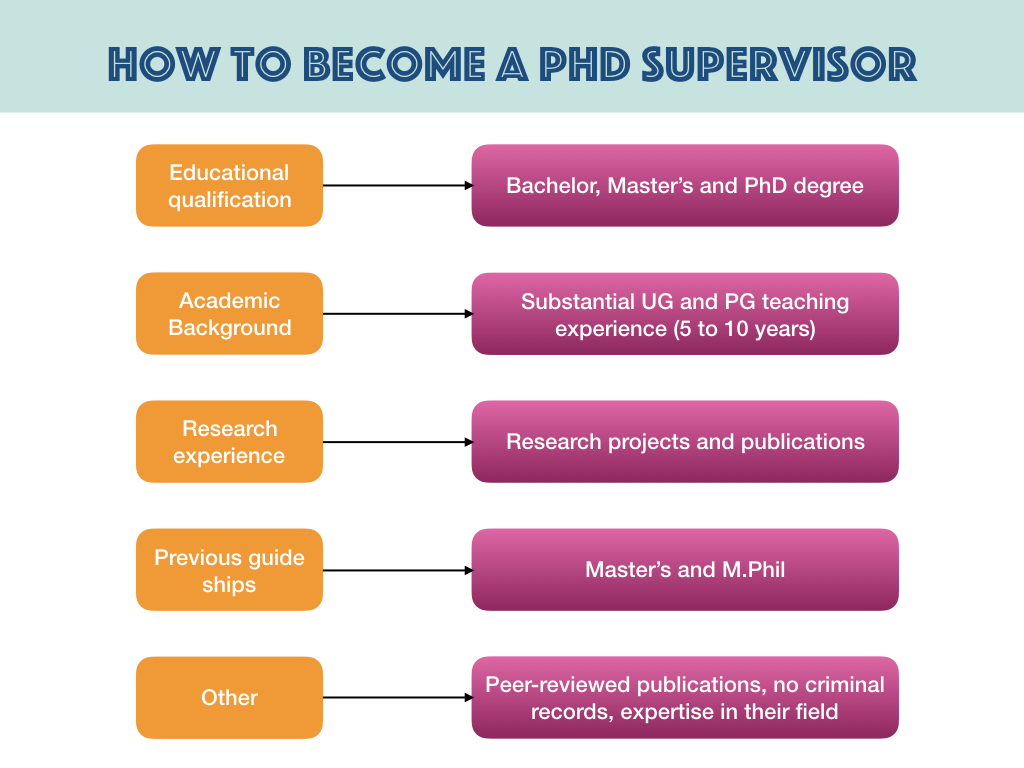
Criteria to become a PhD supervisor or guide:
An applicant must have graduation, post-graduation and/or M.Phil and PhD degree in their relevant field which must have been completed from a reputed and well-known university. Note that all the degrees must be achieved from a government-recognized university.
In addition, the applicant should have done research in the subject or related allied subject in which he or she wants to become a guide. Importantly, the fellow applicant must have a doctorate, research or equivalent degree.
To be a doctorate advisor, an applicant must have enough academic experience as a lecturer, professor or assistant professor. A strong academic or teaching experience is required with 10 years of undergraduate and 6 to 7 years of postgraduate teaching experience.
Noteworthy, the experience of only the government-approved universities is counted in the recruitment process. Furthermore, the applicant must be a regular faculty of the university to which he or she wishes to apply. The applicant must be affiliated with the university, anyway.
The applicant should be working as a lecturer, assistant professor and as a professor in the university or affiliated college or school.
The research background and reputation of an applicant in the research fraternity are also taken into consideration during the evaluation process. During their academic tenure, the applicant should have substantial research contributions in their field.
He or she should have enough publication in the form of original research, review articles, short-communication and patent in peer-reviewed internationally approved journals. He or she also has guided students at the undergraduate or postgraduate levels.
Noteworthy, consistency in research work, publications and other research activities are crucial factors for recognition. Such parameters dictate dedication, responsibility and interest in research. In addition to this, patents, copyrighted materials and any IPR product are acknowledged as extra points.
The applicant must have mastery and expertise in techniques, methods, tools and instruments used in their subject.
As mentioned somewhere in the article, the applicant must have experience as a mentor. He or she must have guided students during their Master’s or M.Phil with excellent academic rewards.
The ratio of students guided, students who completed the research and students publication is also counted in the evaluation process. It shows how experienced, consistent and potential the applicant is for guiding the doctorates.
Besides, the applicant should be involved in other research projects or activities like seminars, gatherings and symposiums.
Several professional, technical and scientific organizations prefer more in-depth evaluation for supervisor recognition including the quality of their research, publications and reputation.
A full-time faculty of the university, university-affiliated college or department, state-level scientists or those working in national institutes or laboratories can apply.
The applicant must have at least 5 research publications in peer-reviewed and renowned journals as a first author or second author as a guide but the whole work belongs to the applicant and their students only.
Mentions as an advisor, acknowledgment or fourth author aren’t considered as publication, nonetheless, it would be considered as some extra credit.
All of the applicant’s work must be plagiarism-free and/or their original, in the case of ascertaining the application would be rejected and the applicant can be banned.
The supervisor doesn’t have guideship from other universities, however, he or she may become a co-guide, joint guide and can collaborate with other universities or organizations.
Moreover, the applicant shouldn’t be involved in criminal activities, shouldn’t have any criminal record, and should be devoid of student controversies and allegations.
I think, as per my knowledge, these qualifications are enough to show your interest in becoming a PhD guide. However, rules and regulations vary among universities. Now let us go through the roles and responsibilities of the applicant or supervisor.
Read more: Are PhD studies in India waste of time?- Students’ Voice (unfortunately- unfortunate does exist- an individual’s perspective!!!)
As aforementioned, the doctorate supervisor will be a responsible and experienced person with a balanced attitude. He or she would have a positive attitude and balanced behavior towards their research students.
Their major responsibilities during the tenure of guideship are enlisted here.
- They have to guide or supervise PhD candidates in completing their research.
- They should have troubleshooting and problem-solving behavior.
- They have active involvement in students’ research work and encourage them continuously.
- They also have to teach other post-graduate students too.
- They have to actively participate in other university activities and academic works.
- They can stand alongside their PhD student in every situation and support them during their emotional, economical and academic setbacks.
- They have to always motivate their students.
As a PhD supervisor, a teacher can guide a maximum of 8 to 10 PhD students and 5 M.Phil students at a time.
- A PhD degree from a reputed university
- 5 to 7 years of postgraduate teaching experience or at least 10 years of undergraduate teaching experience.
- Broad research experience
- Enough publications in internationally reputed journals.
- Enough experience in teaching and guiding students.
- Note that in some cases, a person with broad industrial research experience or well known national personality or a retired professor can also be a PhD supervisor or guide if they have enough research background.
How to become a PhD guide in India, USA, UK: Download the PDF .
This article shows that the PhD mentorship recognition process is as difficult as getting admission into PhD, still is not accurate enough. Sometimes PhD advisors also leave their position midway due to lack of experience and frustration, in such cases, students have to face bad consequences.
Some of my friends left their PhD midway because of the bad behavior, incompetence and negative mindset of their supervisor. Some of my female colleagues also left their research midway because of other reasons. The thing is, universities don’t follow their own recruitment process, strictly and appoint the wrong person intentionally or unintentionally.
Such mal-research practices must be stopped, central authorities along with the university have to closely monitor the entire process of supervisor recognition and ensure that the process strictly follows international standards or not.
In conclusion, an applicant for the recognition of PhD supervisor should be an experienced person. But their potential and endurance must be assessed prior to the evaluation process.

Dr. Tushar Chauhan is a Scientist, Blogger and Scientific-writer. He has completed PhD in Genetics. Dr. Chauhan is a PhD coach and tutor.
Share this:

- Share on Facebook
- Share on Twitter
- Share on Pinterest
- Share on Linkedin
- Share via Email
About The Author

Dr Tushar Chauhan
Related posts.

What is PhD?- History, Definition, Origin, Requirement, Fees, Duration and Process

How to write a PhD thesis?
Leave a comment cancel reply.
Your email address will not be published. Required fields are marked *
Save my name, email, and website in this browser for the next time I comment.
Notify me of follow-up comments by email.
Notify me of new posts by email.
- Documentation
- Getting Help
Open PHD Guiding – Official Website for PHD2
Phd2 is telescope guiding software that simplifies the process of tracking a guide star, letting you concentrate on other aspects of deep-sky imaging or spectroscopy..
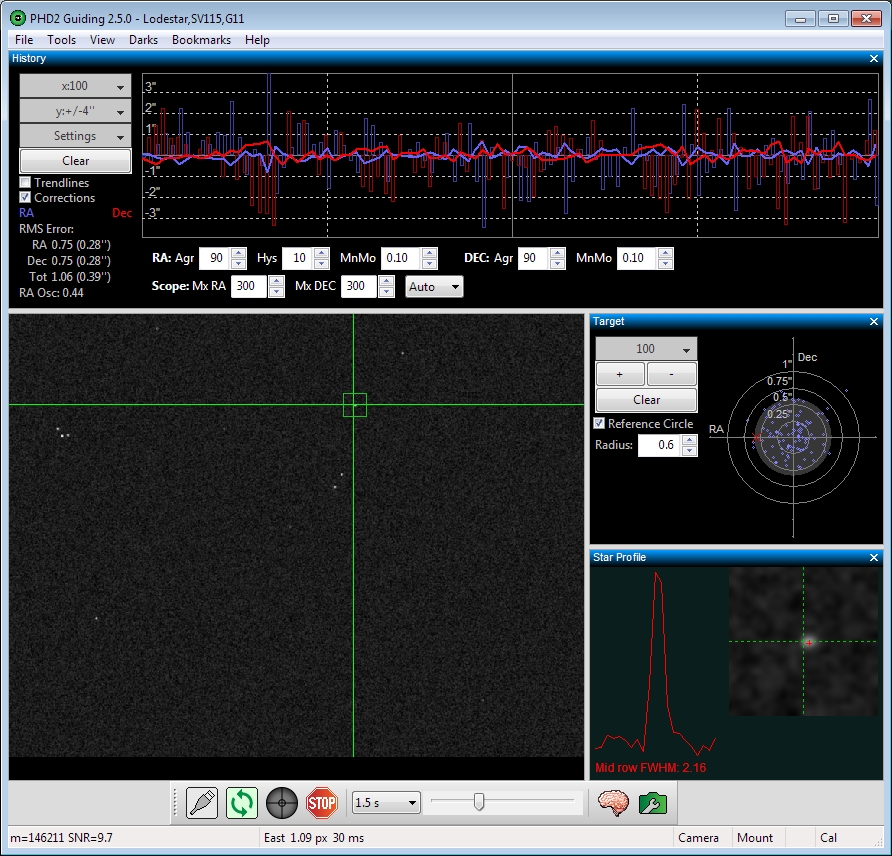
- Easy-to-use, “push here dummy” guiding for beginners
- Sophisticated guiding and analysis tools for experienced users
- Extensive support for commonly-used equipment
- Easy upgrade/co-installation with PHD1, including many new features
- Available for Windows, Mac, and Linux
- Extensive online help and responsive product support

Getting started
PHD2 comes with a built-in help file, which is an excellent way to get started with PHD2. You can access the help file from the Help menu in PHD2, or you can view or download the manual here: HTML PDF .
For questions about using the application, general troublehooting, bug reports, feature requests, and questions about PHD2 development, please post on the Open PHD Guiding Google group.
Please read How to ask for help with PHD2 for tips on how to ask for help with a guiding problem or to report an issue with PHD2.
Latest News
Head to Downloads for the installation files and release details.
Bruce and Andy have compiled a list of best practices for PHD2. These aren’t “must-do’s”, but they represent lessons learned from both personal experience and from analyzing hundreds of log files covering a wide range of equipment configurations. Updated Dec 2019.
Download PDF: English Français Italiano
PHD2 is now compatible with macOS Catalina. Download here
Ken has put together some video tutorials on the new PHD2 polar alignment tools: Polar Drift Alignment (PDA) and Static Polar Alignment (SPA) They can be viewed here: PHD2 polar alignment tutorials .
Bruce has contributed a new PHD2_Broker package that lets you use PHD2 with the latest CCD Autopilot automation package (v 5.09.8 or later). You can manage your imaging sessions with CCD Autopilot while letting PHD2 handle guiding and dithering in a coordinated way. Details are provided in the help document that’s part of the Broker package. Download: PHD2_Broker download
A tutorial on how to interpret your Guide Log and improve your guiding performance, by Bruce Waddington. Highly recommended! Download PDF English Français Italiano 日本
A tutorial on using PHD2’s Comet Tracking tool for off-axis guiding on comets , by Lars Karlsson.
Bruce Waddington has contributed a new PHD2 dithering application. This handy utility can be used to dither PHD2 from applications like MaxIm that do not have built-in support for PHD dithering. Download: PHD_Dither 1b
Recently Andy Galasso sat down with The Astroimaging Channel to discuss PHD2 via Google Hangouts. You can watch the session here :
Andy Galasso has written this PHD2 Log File viewer for quickly visualizing your guiding performance and spotting problems in your PHD2 Guide Log.
Details here : http://adgsoftware.com/phd2utils/
News & Resources
December 22, 2023 - PHD2 v2.6.13 Released
December 21, 2019 - PHD2 Best Practices
December 7, 2019 - macOS Catalina
April 26, 2018 - Polar Alignment tool video tutorials
June 12, 2016 - PHD2_Broker package available

How to Get A PhD: A Step-by-Step Guide

How to Design Questionnaire for Research

Doctor of Business Administration: Detailed Guide [2023]
Leave a comment cancel reply.
Your email address will not be published. Required fields are marked *
Save my name, email, and website in this browser for the next time I comment.
- Prospective Students
- Current Students
- Faculty/Staff

- Mission and History
- Moody Foundation Gift
- Administrative Handbook
- Director of Graduate Studies Handbook
- Special Announcement
- Dean's Office
- Graduate Council
- Graduate Student Advisory Board
- Degrees Offered
- Admissions Contacts
- Graduate Admissions Guide
- Application Deadlines
- Graduate School Resources
- International Applicants
- Dedman College: GRE Requirement for 2024 Applications
- Forms and Policies
- Graduate Fellowships and Awards
- Graduate Writing Center
- Career Development
- Graduate Student Organizations
- Student Services
- Graduate Student Teaching Awards
- Events Calendar
- Orientation
- Professional Development
- Three Minute Thesis
- Student Life
- Meet our Ph.D. Fellows
- Ph.D. Health Insurance
- Graduate Student Travel Grant
- Dedman Graduate Student Assembly
- Postdoctoral Affairs
- Postdoctoral Community & Resources
- Hiring Process
- Global, Online & Continuing Education
- Our Programs
- Online Program Development
- Faculty and Curriculum Committees
- About Global, Online and Continuing Education
Southern Methodist University
How to get a phd:, a guide to choosing and applying to ph.d. programs.

Here at SMU, we know that the decision to pursue a Ph.D. in any field can be difficult — it’s a significant investment of your time and resources, with several unknowns along the way. When students are just starting their search, here are some common questions we have received:
- How do you prepare a strong application?
- How do you select a program that fits your area of interest?
- Will you get in?
- What are the years in a Ph.D. program actually like?
In this resource, we offer you the insider information you need to choose a program, apply successfully, and thrive during your years of graduate study. You’ll get answers to common questions, tips for putting together your application, and testimonies from students who made it through the application process and are now pursuing a Ph.D.
Common Reasons for Getting a Ph.D.
Do you find yourself wondering, what would motivate someone to earn a Ph.D.? Only about two percent of adults over 25 hold a doctoral degree, according to a 2018 study by the U.S. Census Bureau . But what drives this group of elite learners?
A 2019 survey of more than 6,000 Ph.D. students asked a wide array of questions on topics ranging from life in a Ph.D. program to students’ satisfaction with their program. Here’s what Ph.D. students liked the most about their doctoral program:

Additionally, although earning a Ph.D. is a large commitment of time and energy, 75% of respondents reported being happy with their decision to pursue a Ph.D. saying they were somewhat satisfied or very satisfied with their decision.

When you start exploring earning a Ph.D., you may encounter some setbacks and deterrence. However, if you have a genuine love for the subject and wish to become a thought leader in your area of expertise, don’t let this discourage you.
Perhaps you’re thinking that a Ph.D. in a STEM field makes sense, but don’t see how to justify your degree in Anthropology or History? In the STEM academic track, the return on investment (ROI) of a graduate degree may seem more clear than in the humanities.
Never fear. Love of the subject, not monetary gain, is what truly motivates students to journey through graduate school. A Ph.D. in any field is a feat in research, critical thought, and dedication, and these skills are extremely valuable even in disciplines with less obvious market value.
Download our Guide to Choosing and Applying to a Ph.D. Program
Access this guide at any point to make references and keep this important information at your fingertips.
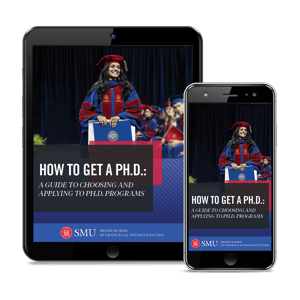
We'll email you a PDF of the eBook for your reference as you apply to graduate school.
Access Insider Information!
How to pick the right ph.d. program.
So, you know what you want to study, but now you’re faced with the task of finding the right school. It can be easy to become overwhelmed by all of the options. The process of selecting which Ph.D. program is the right fit doesn’t have to be difficult or stressful, you just need an organized plan to help you sort through the factors you need to be looking for.
Not sure what you should be looking for? We can help you with that! In this short video, we walk you through each step of selecting the right Ph.D. program — making it simple and straightforward.
You’ve Decided to Go for It! Take the First Steps to Getting A Ph.D.
Ready to take the leap and begin your Ph.D. career? We’re here to help you take the first steps. To determine what program could be right for you, it’s best to begin your research early, and to consider the following things when analyzing and comparing Ph.D. programs:
Is there a professor at the school with your same interests?
What sort of funding do they offer?
Do the school’s graduates have careers that you would like to have?
Do you have geographic restraints?
Ph.d. faqs: choosing a doctoral program that’s right for you, do you need a master’s to get a ph.d..
Not always, it depends on your program. Some programs will allow you to move straight from an undergraduate degree into a doctoral program that includes graduate coursework. Other programs will require a master’s degree before beginning a Ph.D.

Read more: Here are 4 ways to get a head start on graduate school while pursuing your bachelor’s!
How many years does it take to get a Ph.D.?
It generally takes five to seven years to complete a Ph.D. program, but make sure to contact your program to learn about the specifics. For more information and an overview of the Ph.D. timeline, check out our article: The Ph.D. Timeline – What Can You Expect From Your Program?
How many doctoral programs should I apply to?
While it is tempting to apply to several Ph.D. programs to enhance your chances of being accepted, this is one example where “quality over quantity” holds particularly true. Ph.D. programs generally accept students based on how closely their research interests align with the work of their professors.
Rather than applying to a dozen programs, pick 4-6 that are truly great matches for your interests and spend the time necessary to make your application stand out as one of the best.
How to pick a Ph.D. program?
We wrote a resource that covers this exact question!
Read — Comparing Admission Offers and Selecting Your School — to learn how to pick the Ph.D. program that is right for you!
- Research proposal often determined in conjunction with departmental research
- Typically higher stipends
- Conducting experiments and then analyzing the resulting data
- Research proposal is self-directed
- Often lower stipends, but more likely to obtain a job in academia
- Analysis of texts and concepts to expound upon in your dissertation
Get to Know the Moody School of Graduate and Advanced Studies
Access this guide to d iscover world-changing research, competitive funding, & professional and community engagement at SMU.
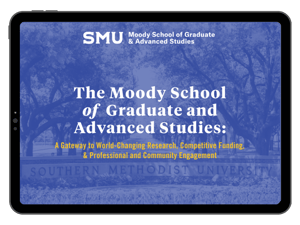
Learn More About the $100 Million Gift from the Moody Foundation
Applying to ph.d. programs: what do ph.d. programs look for.
When starting the application process, you should review the program’s application requirements and contact the school to ask any of your remaining questions. Starting with this step will help you stay focused as you gather the assets you need and will keep you from wasting time on things that are not required.
Applicant questions usually fall into one of two categories: questions about the substance of the program (e.g. Is there an opportunity to do research as a first-year?), and questions about the logistics of the application (e.g. What is the school code for sending you my GRE scores?).
Don’t hesitate to contact faculty directly to ask questions pertaining to the substance of the program. They love talking with prospective students about what they do, and they will be able to provide much more detail than the admissions office. On the other hand, admissions or graduate office staff should be able to give you prompt guidance on logistical questions pertaining to your application (faculty are not as familiar with these topics).
Personal Statement
A student with a clear research direction can write a very compelling personal statement. You don’t need to have your exact dissertation topic worked out yet, but it’s important to have a good sense of the following:
- Your general area of interest;
- The faculty in the department you’d want to work with;
- The resources at the university that would help with your work.
Hitting these points in your personal statements tells the faculty not only that you are prepared for the work, but that this particular university is a good home for you. An applicant can be impressive, but if the faculty don’t see you as a good fit for the school’s program, they won’t be inclined to admit you.

Transcripts
When you order copies of your undergraduate and graduate school transcripts, as well as any test scores you may need, leave plenty of time to meet the deadline so that these documents do not hold up your application. Frequently, schools will accept unofficial transcripts for the initial application, but a final, official transcript will be necessary if you are accepted and decide to attend.
Letters of Recommendation
The hallmark of a Ph.D. program is that it is research-based. Success at the undergraduate level is an important factor, but a better indication of success is research experience. The strongest letter of recommendation is from a professor who knows you not just as a student in their classroom, but as a researcher. Choose someone who can speak to your work in the lab or the archive, making a contribution to the discipline rather than simply absorbing content from a lecture.

Advancing the Field: Stories and Resources for Graduate Students
Advancing the Field is a weekly blog that offers prospective graduate students insight and advice as they consider the challenges and exciting possibilities that come with getting a graduate degree.
Ready to Read More? Subscribe to Our Blog!
How to apply for a ph.d. program: the ph.d. application checklist.
In addition to the items in the section above, make sure to check off this list (or edit it to include your specific requirements).
Be sure to check your department's website for additional requirements, such as minimum test score requirements and writing sample prompts. Not all departments will ask for additional items, but for those that do, make sure you're prepared in advance.

Get Application Advice

Statement of Purpose FAQs

Should You Earn a Master's or Ph.D.?

How to Ace the TOEFL/IELTS
.png?width=1300&name=Letter%20of%20Recommendation%20(typically%203%20required).png)
Get Our Tips for Your Best Recommendations

How to Craft a Clear CV/Resume
After all these elements of your application are submitted and reviewed by the department, they may request an interview with the candidates who are moving forward. To help you with your grad school interview, we’ve created a resource with advice from admissions professionals to help you prepare.
Applications for Ph.D. programs are often reviewed on a rolling basis, but some do have hard deadlines. It’s hard to say exactly when you will hear back, as it depends on the individual department, but generally, you should not expect a response before February of your expected enrollment year.
As your offers of admission begin to roll in, we’ve compiled some advice for helping you select the best one! Read — Comparing Admission Offers and Selecting Your School .
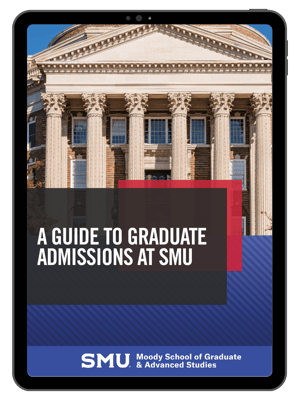
Apply To Graduate School with Confidence
SMU's Graduate School is proud to offer doctoral and master’s degrees in a wide variety of fields. This resource is designed to give you an overview of the admissions requirements and processes for our Master’s and Doctoral programs.

- Understanding How to Finance Your Ph.D. Program
Here’s some sage advice: when it comes to funding your Ph.D. program, it should be funded by the university as a tuition scholarship and a stipend. If you are not offered any funding, it may be an indication that you are not a good fit for that program.
Your stipend offer depends on the university, but the general range for a Ph.D. stipend is $15,000-$35,000.
SMU currently has 55 Moody School funded Ph.D. students and offers a wide range of fellowships, stipends, grants , and health insurance to financially support students in our doctoral programs. SMU offers the following fellowships:
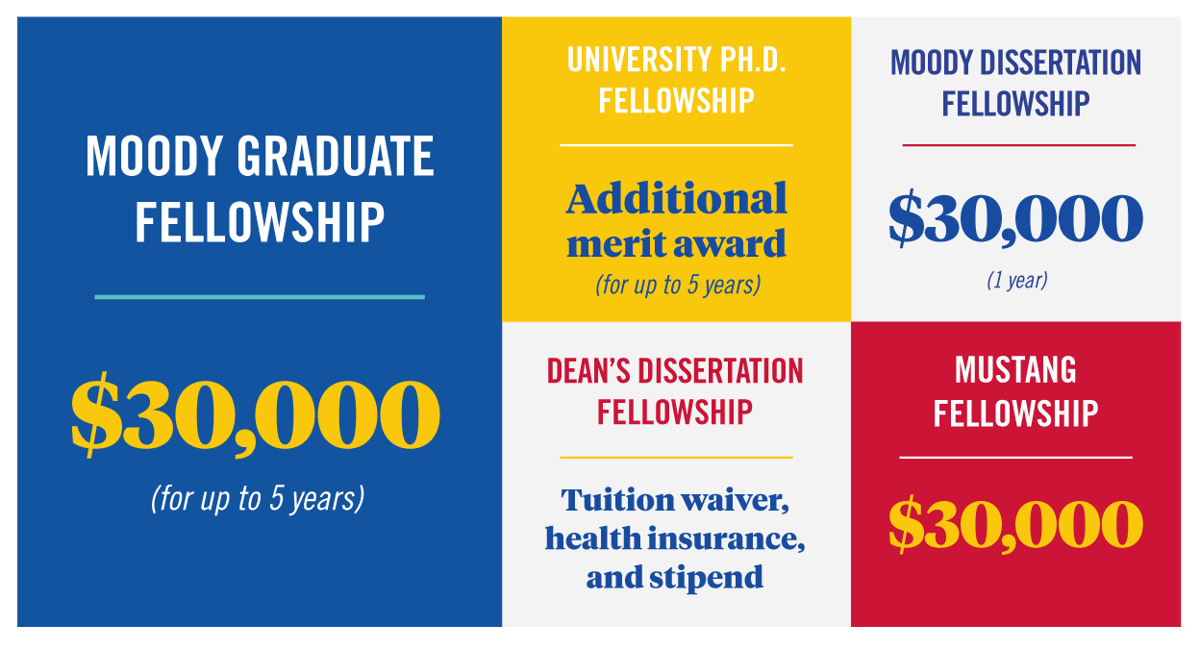
In some cases, the stipend is contingent upon the student holding a research or teaching assistantship.
RESEARCH ASSISTANSHIPS

TEACHING ASSISTANTSHIPS
Typically teaching assistantships are arranged through the university. This arrangement helps graduate students get experience in the classroom and helps institutions balance out the cost of graduate student stipends.
Fellowships beyond your university are also good opportunities for additional financial support during your years of graduate work. Check out fellowship listings like this one dedicated for women across disciplines or this list of STEM-related fellowships .
How a Ph.D. Will Benefit Your Finances?
Although the price tag of a Ph.D. can look steep, the reality is that the vast majority of doctoral students receive full, or significant, funding for their program. This means that you’ll spend 5-7 years earning your degree, but will likely graduate without additional tuition debt, ready to step into your career field as a trained expert.
But what do the numbers say? Here’s the real story on the financial impact of pursuing a Ph.D. according to research conducted by the Bureau of Labor Statistics . The truth is, people who have earned a doctoral degree are looking at a significant increase in overall lifetime earnings.
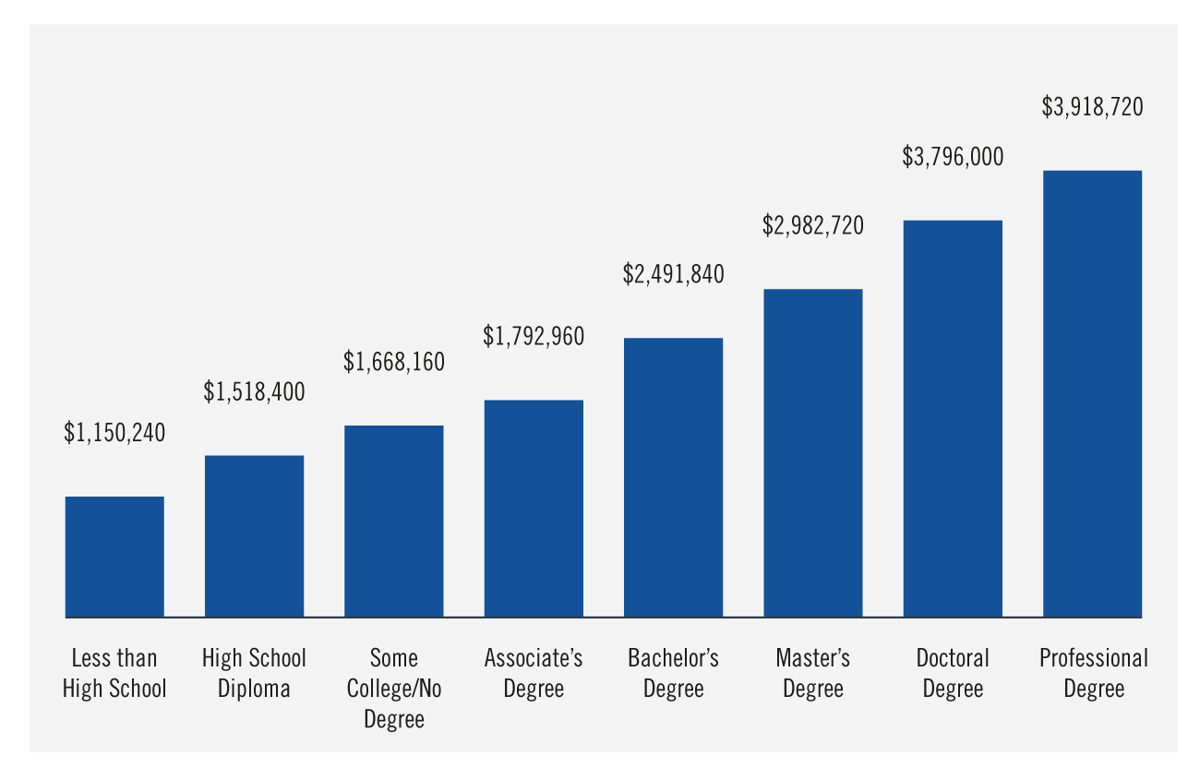
Competitive Funding and the Student Experience
Tune in for a panel discussion with current Ph.D. Fellows about the competitive graduate fellowships and funding opportunities available and the graduate student experience at SMU.

View the Recorded Webinar
- Advice from Current Ph.D. Students
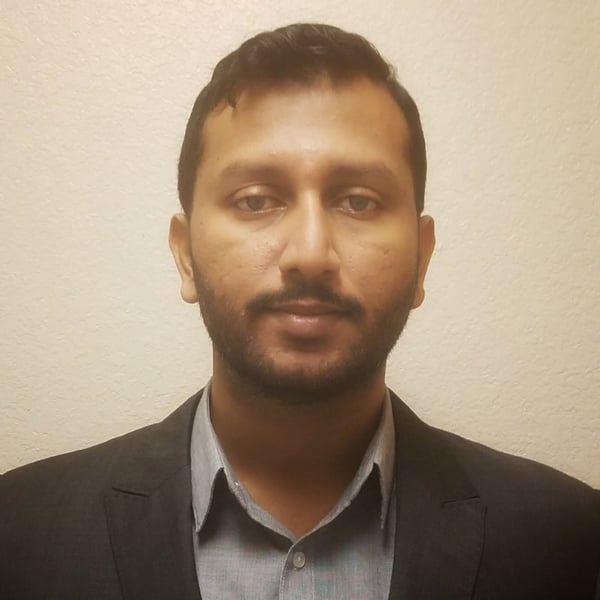
Amila Nanayakkara
I am Amila Nanayakkara from Sri Lanka. I did my undergrad in University of Colombo. After that I [worked] as a research assistant for 2 years at the Industrial Technology Institute in Sri Lanka.
Now I am in my 5 th year pf my Ph.D. program, studying biology. To be specific, we study multi-drug resistant cancers and how to reverse the drug resistance.
Yes, [I did encounter some doubts during my decision process] especially about the future, or what should I do after the Ph.D. It takes 5-6 years [to complete] which is like the best part of your life. I had my doubts [about] investing this much time on the Ph.D.
But I [realized] that there are other options rather than being an academic after [getting] a Ph.D. Also, I was pretty sure that I wanted to do research, wanted to do new things always. I hated routine work. I had a short time job in a bank and I realized that I do not like office work at all [so the Ph.D. became very appealing].
I liked the research [happening at] SMU. I liked to work in cancer biology specifically, and I knew Dr. Vogel and Dr. Wise’s lab [would be] a place I would like to work. Also I think the PI (Principal Investigator, the lead researcher for a grant project) plays a huge part in your lab [experience]. So I wanted to join a lab where you are given freedom and not micromanaged. When I talked to Pia Vogel and Wise I realized this is the best place for me. The whole Biology department seemed like a very friendly place too. Also, I really liked the environment of SMU as a whole as well.
Ph.D. is like a marriage. You have to think a lot before you make the decision and you can not get out just because you do not like it in the middle.
I think you have to select a program, a lab you really love. You have to love what you do. Because this path to Ph.D. can be very difficult. I remember that I did not get any results [in the lab] during first 2 years. But I still loved what I did , so it kept me motivated.
You have to read a lot, I mean a lot! Also you have to come up with your own ideas as well. Do not always only rely on the path your supervisor shows.
You have to make several mini projects while focusing on one big project. So if you hit a road block, you still have [to keep moving on] other [parts of the project]. It can be a tough journey, but you can make it happen.
- Communication, teaching and presentation skills.
- How to interact with people/students.
- Mentorship skills.
- Problem solving ability.
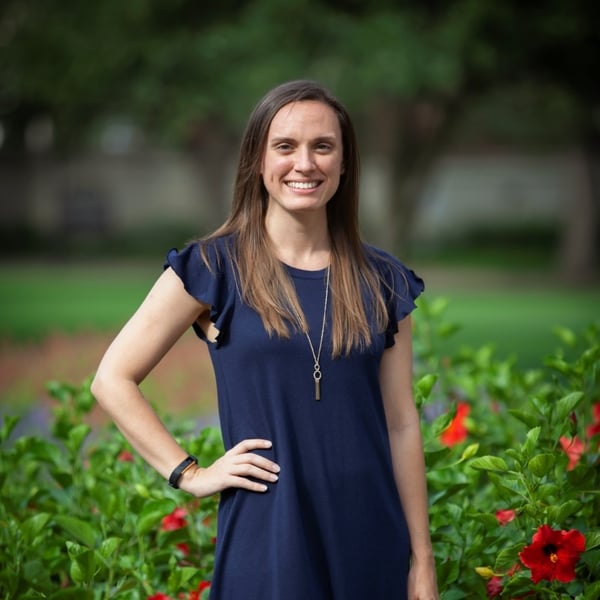
April Simpson
I am originally from Chattanooga, Tenn. In 2009, I earned a Bachelor of Arts in Religious Studies (with minors in Math and World Languages) at Gardner-Webb University. I also completed two master’s degrees at Gardner-Webb between 2010 and 2014: Master of Arts in Religious Studies (concentration in Biblical Studies) and Master of Divinity. From the start of my master’s program, I knew I planned to pursue a Ph.D.
I am now in my third year at SMU. I am a student in the Graduate Program in Religious Studies (Dedman College), and my field of study is New Testament. I have completed all my coursework as well as my comprehensive field exams, and I am in the process of writing my dissertation proposal this fall; I expect to be admitted into candidacy sometime in the next few months.
There were three major factors that could have inhibited my pursuit of the Ph.D.: highly selective admissions processes, cost, and rigor of the Ph.D..
I knew long before I applied that elite programs are highly selective due to funding limitations and high standards. At times I wondered whether I would be able to stand out enough to be selected. My response was to do my part—to work as hard as I could reasonably work—to make myself a desirable candidate for admission. I maintained an excellent GPA, prepared intensely for the GRE, gained teaching experience, involved myself in the Society of Biblical Literature (an important professional organization in my field), and sought out references who could speak to my academic and professional abilities and work ethic. I decided that, while the application and selection process was not totally within my control (you cannot make them pick you), I would foster my own drive to work hard and excel in an attempt to accomplish what was in my own control.
Another factor was cost. I knew that, without tuition funding and stipendiary support, I would not be able to afford pursuit of the Ph.D., nor is it advised in my field to take out loans at this level. Fortunately, most elite programs are fully funded, including a stipend that helps cover living expenses (and unfortunately, this means those programs have even more competitive admission, as I already noted). I decided to apply only to fully funded, widely respected programs so that, if admitted, I would be able to afford a Ph.D. program. And, again, I worked hard to make myself the best applicant I could be.
Finally, I knew that the Ph.D. is a rigorous degree. At times I worried that I would not be cut out for this level of work. Interestingly, these worries tend to manifest themselves not only among aspiring students but also among current Ph.D. students, something we refer to as “imposter syndrome.” At any rate, I listened to and trusted faculty mentors who told me I was, indeed, able to complete a Ph.D.; I listened to my own inner voice that told me to keep at it and to give it my best. And, again, I worked hard.
I did a great deal of selection before ever applying to Ph.D. programs, so that I only applied to programs I was fairly confident I would be willing to attend. Despite some overlap in the application process, each program application is different in some way, and it takes time and resources to apply to schools. As I prepared to apply, I looked for well-respected/highly rated schools that had the following qualities (this list is not ranked): (1) full funding, (2) faculty and program structure that would support my research/career interests and goals, (3) generally, an environment of collaboration rather than of antagonistic competition, (4) high academic standards, (5) a professional atmosphere, (6) a clear commitment to the success of students enrolled in the program, and (7) an interest in professional development not only in terms of research and general professionalism but also—and importantly—in terms of teaching.
When I visited SMU, I was very impressed with the faculty (both their achievements and their willingness to work with me and support my work), the Graduate Program in Religious Studies students (including other newly admitted students), the facilities (including SMU’s beautiful campus and especially Bridwell Library), and the funding. I could envision myself as part of the community here. It became even clearer to me that enrolling in the Graduate Program in Religious Studies (Ph.D.) at SMU was such a great opportunity, one that I could not pass up. Although this meant that my husband and I would be moving far away from family and friends and that we would be adjusting to life in a new city, we embraced this opportunity.
One piece of counsel I received early on was to maintain a realistic attitude about the admissions process, specifically how competitive it is. This means taking seriously the task of being a competitive applicant. Just as importantly, it means not being overly critical of oneself when rejection inevitably comes (from one school or another). This process requires the development of thick skin and reflective self-confidence.
Another key piece of advice I received was to be genuine about my interests and preparation. There is always a degree to which school and applicant alike try to determine best fit, and of course as applicants we want to be competitive and appealing to multiple schools; however, misrepresenting one’s interests does not benefit the applicant or the student in the long run.
I would encourage prospective students to seek out their strongest faculty supporters and cheerleaders as references; to consider each aspect of the application process to be an opportunity to highlight a strength or compliment an area that may not stand out as much; to ask questions about the culture and collegiality of the schools in which they are interested; to be professional but also to be themselves; and to be aware that, while having a sense of one’s research direction and career path is valuable even during the application process, there is also value in remaining open to how one’s interests or specific career aspirations might change in the course of a program.
I have had several opportunities to develop my teaching skills, not only through opportunities to teach courses, to teach individual class sessions, and to lead workshops, but also through various seminars and trainings that are aimed at developing pedagogical skills in both a face-to-face and online format.
Other skills I have developed include general professional development, understanding and engaging religious studies and theology colleagues across disciplinary lines, reading and writing against deadlines, identifying and dissecting arguments more clearly, identifying and engaging various methodologies employed across the humanities, book editing, and website editing.
Through my service on the GPRS Graduate Student Organization and the GPRS Faculty Steering Committee (as a student member), I have developed an increased understanding of the administrative matters that relate to university programs in general and the GPRS in particular. Serving in such an administrative fashion as a member on a committee or otherwise is a transferable skill that I anticipate being valuable to me throughout my professional academic career.
I’ll put it this way. If I could go back and give my pre-Ph.D. self a pep talk about what was coming, I’d say the following: (1) You are more prepared than you know. (2) You will learn so much so fast, so there is no need to worry about feeling out of practice or as if you don’t know how to be a Ph.D. student (and this is only natural—you’ve never been a Ph.D. student before!). (3) It is perfectly fine that you still have questions about how you’ll focus your research; these things take time (and it turns out you are on the right track with your ideas anyhow). (4) You’re going to grow and change a lot during this process, and you’ll have good and bad days. It is worth it. (5) Self-care and relationship-care matter.
Discover Life in Dallas
Get to know the city of Dallas through our guide and learn what it is like to live, work, eat, study, and relax here while completing your graduate degree at SMU.
![eligibility for phd guide [SMU] Dallas Guide eBook_iPad mock-up](https://grad.smu.edu/hs-fs/hubfs/Dallas-Guide/%5BSMU%5D%20Dallas%20Guide%20eBook_iPad%20mock-up.png?width=300&name=%5BSMU%5D%20Dallas%20Guide%20eBook_iPad%20mock-up.png)
We'll email you a PDF of the eBook, so you can save it for your reference as you apply to graduate school.
Get the Graduate Student's Guide to Living in Dallas
How many years to get a ph.d. our advice for thriving every step of the way.
You’ve applied, been accepted, and decided to attend your Ph.D. program. In the flurry of excitement around your decision, the reality of what the next 5-7 years will look like may have eluded you. What does life as a Ph.D. student really look like? And how long does it take to get a Ph.D.?
Your time in your Ph.D. program is both exciting and challenging and, depending on your school and program, the next 5-7 years will look a little different for everyone. Here’s what you can generally expect in your Ph.D. program:

In the first year, your department should offer you guidance about what classes to take and requirements to fulfill. It’s tempting to jump right into research, but make sure you pace yourself and take advantage of networking opportunities , such as program and college events, graduate associations, and additional lectures. Each of these will expose you to the field and help you to make meaningful connections that will serve you throughout your doctoral program.
Read more: 4 Tactics to Help You Build a Professional Network While Getting Your Ph.D.

Much the same as year one, your focus will be attending seminars and honing in your dissertation topic. Continue to network and get to know your professors. Usually, sometime in the second or third year you will take your qualifying exams and be admitted to candidacy, formally moving into the dissertation research and writing phase.
In the beginning of Year 2, (if you have not already done so) you’ll want to begin reaching out to faculty mentors and building relationships with them. As you progress through your Ph.D. your faculty mentor, or dissertation advisor, will become one of your most important connections.
Read more: 3 Tips for Graduate Students to Consider When Choosing a Faculty Mentor

Read more: 5 Common Myths About Ph.D. Programs — Setting the Record Straight

Typically, course requirements for your Ph.D. will be completed after the first two years, but this can vary depending on the discipline and program. Keep in mind that some programs have average durations far longer than five years. For example, anthropologists usually do fieldwork for their Ph.D. degrees, which extends the program by several years compared to STEM programs.
Read More: The Ph.D. Timeline – What Can You Expect From Your Program?
The Final Step: Writing Your Dissertation
The most general statement that can be made about writing your dissertation would describe the process as: do research, propose a prospectus, and then write about it! Writing is a skill perfected by regular practice, so be sure you are consciously honing this skill during your years of coursework and seeking out feedback about how you could improve.
Read more: Get a sense of what it takes to complete your Ph.D. Here are 5 tips for writing your Ph.D. dissertation
However, the particulars vary a lot by discipline. In some cases, you will research and write as you go (more often in the humanities); whereas in the sciences, you’ll generally perform research over many years and compile your findings in a dissertation over one to two semesters. In some cases, you are publishing articles throughout your 5 years, and those articles can provide the basis or rough outline for a dissertation.
As you think about your dissertation, it might seem overwhelming to imagine finding something new or interesting enough to write about it and be deemed an expert. Often your first years in a Ph.D. program, taking coursework and working more directly under faculty, will help you find your research niche that will then become your dissertation. A good Ph.D. program will help you grow and develop as you prepare to work independently as a scholar.
In almost all cases, dissertation research and writing are self-driven. After you are admitted to candidacy, it is up to YOU to decide what you need to do, when you are going to do it, and what your final product will be. This is where a good advisor, who can provide guidance and help you implement a system to stay on track, is crucial. In addition to having good research, one of the biggest keys to success in writing your dissertation is to be organized.

- Ph.D. Programs at SMU: A Look at Your Options Across the Disciplines
SMU is a distinguished center for global research with a liberal arts tradition, and our graduate programs are known for their rigor and commitment to research. Here at the Moody School of Graduate and Advanced Studies, we are proud to offer 32 Ph.D. programs that are the backbone of the high caliber research taking place at the University.

Learn more about some of the Ph.D. programs offered at SMU
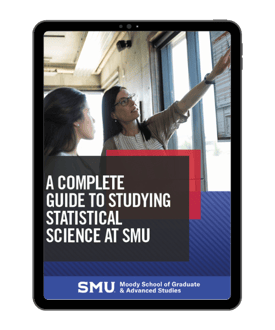
A Complete Guide to Studying Statistical Science
Data is not the same as knowledge. Without context to understand what types of data are valuable, what makes data reliable, and what the data signify, data are useless.

Discovering Your Planet: A Complete Guide to Earning A Ph.D. In Earth Sciences
Earth Sciences address the complex interactions among the physical and biological components of our planet. Earth Scientists set out to address the most pressing environmental issues of our day and to offer immediate and long-term research-based solutions for geohazards, resources, and climate issues.

Exploring the Universe: A Guide to Studying Physics at Southern Methodist University
Physics is the study of space, time, energy, and matter. Physicists try to ask and answer, in a verifiable and reproducible way, the deepest questions about the origin, nature, and fate of the universe.

Download our Guide to Choosing and Applying to Ph.D. Programs
Access this guide at any point to make references and keep this important information at your fingertips.
Receive this resource as an eBook now!
- Want to Learn More?
If your interest is piqued and you’d like to learn more about choosing, applying for, and thriving in a Ph.D. program, you can explore the following resources below. You can also reach out to the Moody School of Graduate and Advanced Studies — we would be happy to assist you.

Request More Information
Are you curious about what the next step towards grad school should be? Want to learn more about SMU’s 32 Ph.D. programs?
Send us your information, we will be in touch!
Jump to section.
- Should You Get a Ph.D.? Exploring the Reasons to Get a Terminal Degree
- You’ve Decided to Go for It! Getting Started on Your Ph.D. Journey
- Putting Together an Strong Ph.D. Application
- Looking Ahead: SMU’s Advice for the Ph.D. Years

Your 8-Step Roadmap on Applying for a PhD
Link Copied
Share on Facebook
Share on Twitter
Share on LinkedIn

PhD aspirants handbook
Imagine this: you confidently cruise through the academic world, armed with a top-notch application, knowing you're about to start a journey where learning is super cool. Whether you just love to learn new things or dream of changing the world, our guide is your go-to plan for how to apply for a PhD! We're here to make your application journey super fun, from finding the right supervisors to discovering cool funding options. Ready for an awesome ride on how to apply for a PhD?
8 Easy Steps on How to Apply for a PhD
Discover the easy steps to follow your dream of getting a PhD. From selecting the right PhD program to crafting a compelling research proposal, our guide ensures that every facet of your Ph.D. application is finely tuned for success. Now, without any further ado, let's jump into this journey together with our 8-step roadmap on how to apply for a PhD program!
Step 1: Choosing Your Research Area
The first step on how to apply for a PhD abroad is to pick the area of research you're interested in. Here are some tips which you will encounter when choosing your research area:
1. Explore Subjects
One thing to remember at the time of how to apply for a PhD is that many PhDs cover a diverse range of topics that vary from Humanities and Arts to STEM (Science, Technology, Engineering, Mathematics). Each individual subject has its own set of research areas built into it.
2. Previous Qualifications
While having a relevant degree in the chosen field is beneficial for many PhD programs, it's not strictly mandatory. For instance, if you're pursuing a Master's in Political Science, you can still prefer applying for a PhD in Cultural Studies. The crucial factor is that your research interests should resonate with your previous experience. This alignment is essential as your PhD application undergoes scrutiny based on your past academic and professional background.
3. Think About Departments
At the time of selecting your best options, consider which department you would like to join to pursue your career in. There might be many choices in which you might get interested, such as History, Biology, Arts or Literature. Take enough time to research it and choose the option which suits your career path. Remember, choosing your research area is like picking the right puzzle piece—it should fit your passion and curiosity while applying for a PhD.
Step 2: Deciding Which Type of PhD You Want
Whenever you decide on applying for a PhD you want, you need to understand there are two main types of PhDs, i.e., predesigned projects and self-proposed projects. Now, let's break down these two main types of PhD programs in simple terms:
1. Predesigned Projects
Predesigned projects are like ready-made puzzles waiting for you to solve. These projects are already available at the time of applying for a PhD. Here's what you need to know about the different forms of predesigned projects. These projects come in three flavors:
- Centre for Doctoral Training (CDT) : These programs focus on specific research areas and often involve collaboration with industry partners.
- Doctoral Training Partnership (DTP) : DTPs offer interdisciplinary training and research opportunities.
- iCASE : These projects provide the most industry experience, including internships.
You don’t need to worry about funding for predesigned projects, as these are usually fully funded for four years. Some predesigned projects even include an integrated Master's degree during the first year. The main advantage of applying for a PhD in a predesigned project is that you can skip the planning phase and directly jump straight into the research phase. Remember, competition can be fierce as multiple students apply for the same advertised PhD opportunity.
2. Self-Proposed Projects
Students who do not wish to pursue a predesigned project can opt for a self-proposed project or their research project for PhD study. This option turns out to be an excellent choice for students who want full control over their work in the research project. Imagine a self-proposed project as you design your adventure! Here's how self-proposed projects work:
- Your Brainchild : You create your research topic and proposal. It's like crafting your unique puzzle piece.
- Control : You have more say in shaping your work and direction as you have full control over the project.
While choosing self-proposed projects is advantageous for students, there's a potential drawback. Not all self-proposed PhD projects come with funding. You might need to find diverse funding options to offset the costs associated with PhD applications. Additionally, students can consider applying for part-time jobs and allocate the earnings towards their studies while applying for a PhD. Keep in mind that a PhD stands as the pinnacle of academic achievement bestowed upon a student, and there are many benefits of getting a PhD in foreign universities.
Step 3: Drafting a Research Proposal
Considering students in both cases, i.e. predesigned project and self-proposed project, you have to draft a research proposal after you complete your period of research. Though this draft will not be considered as your final draft for submission, drafting a research proposal is useful and comes in handy in some situations. Below are some pointers on how to write a PhD research proposal:
1. Title Your Research Question
2. abstract (optional), 3. background & rationale, 4. research aims & objectives, 5. research design and methodology, 6. timeline, still, pursuing a phd degree find the best homes near your university.
Book through amber today!
Step 4: Contacting Potential Supervisors for a PhD
Once you’ve settled on your PhD project, conducted research, and drafted a research proposal, the next step is to reach out to potential supervisors. Here are some essential tips to keep in mind when contacting potential supervisors for a PhD:
1. Research Your Potential Supervisor
Before you reach out to any potential supervisor, familiarise yourself with their research and publications. You need to understand their research interests and areas of interest. This can also be followed by exploring their academic profile on university websites or other platforms.
2. Craft a Formal Email
In most instances, communication occurs through email. It is crucial to ensure that your initial email maintains a professional and well-structured tone. Begin by stating a clear subject line, introducing yourself, conveying your interest in the research topic, expressing your intention to apply for a PhD, and concluding with courtesy.
3. For Predesigned Projects
The project advertisement will include the supervisor's name. Feel free to reach out to the supervisor via email or message to engage in a more detailed discussion about the research.
4. For Self-Proposed Projects
In this scenario, the responsibility lies with you to identify potential supervisors. Begin your search by exploring staff lists on university websites. When seeking a suitable supervisor, cast a wide net, considering both seasoned experts and emerging academics.
Step 5: Checking Entry Requirements
The next crucial step is to check the entry requirements of your selected institution or project you’re interested in. Below are mentioned some entry requirements responsible for different scenarios based on academics:
1. Master’s Degree (Usually)
Most PhD applicants typically hold a Master’s degree in a relevant field. However, some funded studentships may allow Bachelor’s graduates to apply.
2. Integrated Programmes
If you don’t have a Master’s, consider programs that include a year of Master’s level training before starting PhD research.
3. International Applicants
For international students, it's essential to review visa requirements while applying for a PhD. If you plan to study in the UK , you'll need a student route visa. To apply for the student visa, you must meet requirements such as obtaining confirmation of acceptance from a university, providing proof of adequate funds, and satisfying English language criteria. Be aware of any language exams or entry tests necessary for the visa process.
Step 6: Understanding Fees and Funding Options
As you’ve decided on the PhD opportunities you’re interested in and confirmed your eligibility, it’s essential to explore funding options. Here’s what you need to know about the financial aspects of pursuing a PhD:
1. Fully-Funded Studentships (Advertised Projects)
If you’re applying for a PhD in an advertised project, then in most cases, successful candidates receive full funding. Research Councils often provide this funding, but they have specific guidelines on usage and thesis submission deadlines.
2. Self-Proposed Projects and Research Council Funding
If you’re designing your own PhD, you’ll likely apply for Research Council funding. Keep in mind that funding for self-proposed projects is limited, and some applications may be unsuccessful.
3. Other Potential Sources of Funding
Explore various funding options, including those offered by your selected universities, ranging from fee discounts to full studentships. Independent organisations might offer partial or full funding for PhD students whose research aligns with their interests. Additionally, the UK government provides doctoral loans for English and Welsh PhD students, with repayments triggered once your income surpasses a specific threshold. Many scholarships in the UK help students while they pursue their PhD.
Step 7: Application Deadlines
Up until now, you must have understood all the aspects of a PhD study, but the most important thing to consider is to note down the PhD application deadlines for each university. Some universities have different deadlines, especially if you’re applying for a PhD funding. Just aim to submit your application well in advance to account for any challenges that might arise during the paperwork.
Checklist of Required Documents
Gather the necessary documents based on the university and funding you’re applying for a PhD. If you’re an international student, you may need to show proof of language proficiency, funds, and student visa eligibility. Some of the common documents you need at the time of how to apply for a PhD:
- CV : Highlight your academic and professional background.
- Personal Statement : Explain your motivation and research interests.
- Research Proposal : Outline your research question and approach.
- Referee Details : Contact at least two referees in advance.
- Academic Transcript : Provide your educational history.
Step 8: Submit Your Application
Once you've compiled all necessary documents (CV, personal statement, research proposal, etc.) and arranged them, proceed to submit your application through the university's application portal. Many universities provide an online portal dedicated to PhD applications, allowing you to initiate your application and save your progress for future completion. If you prefer applying for a PhD funding separately, you can do so through research council funding, often integrated into the university's application. For alternative funding sources, refer to the specific application process outlined on the funder's website.
As we wrap up this exhilarating journey through the 8-step roadmap to how to apply for a PhD, take a moment to pat yourself on the back. You've not only gained insights about applying for a PhD but have also uncovered the secrets to finding the perfect supervisors and securing the funding you need. Remember, applying for a PhD is a significant step, so take your time and prepare thoroughly. Now, go forth, shine bright, and let your journey to PhD greatness begin!
Frequently Asked Questions
Where do i start when considering how to apply for a phd, what documents are typically required at the time of applying for a phd, is there an online application portal while applying for a phd program, are there specific language proficiency requirements for international applicants while applying for a phd, what funding options are available for phd students while applying for a phd.
Your ideal student home & a flight ticket awaits
Follow us on :

Related Posts

50 Best Finance Dissertation Topics For Research Students 2024

Discover 21 Best Study Websites for Students
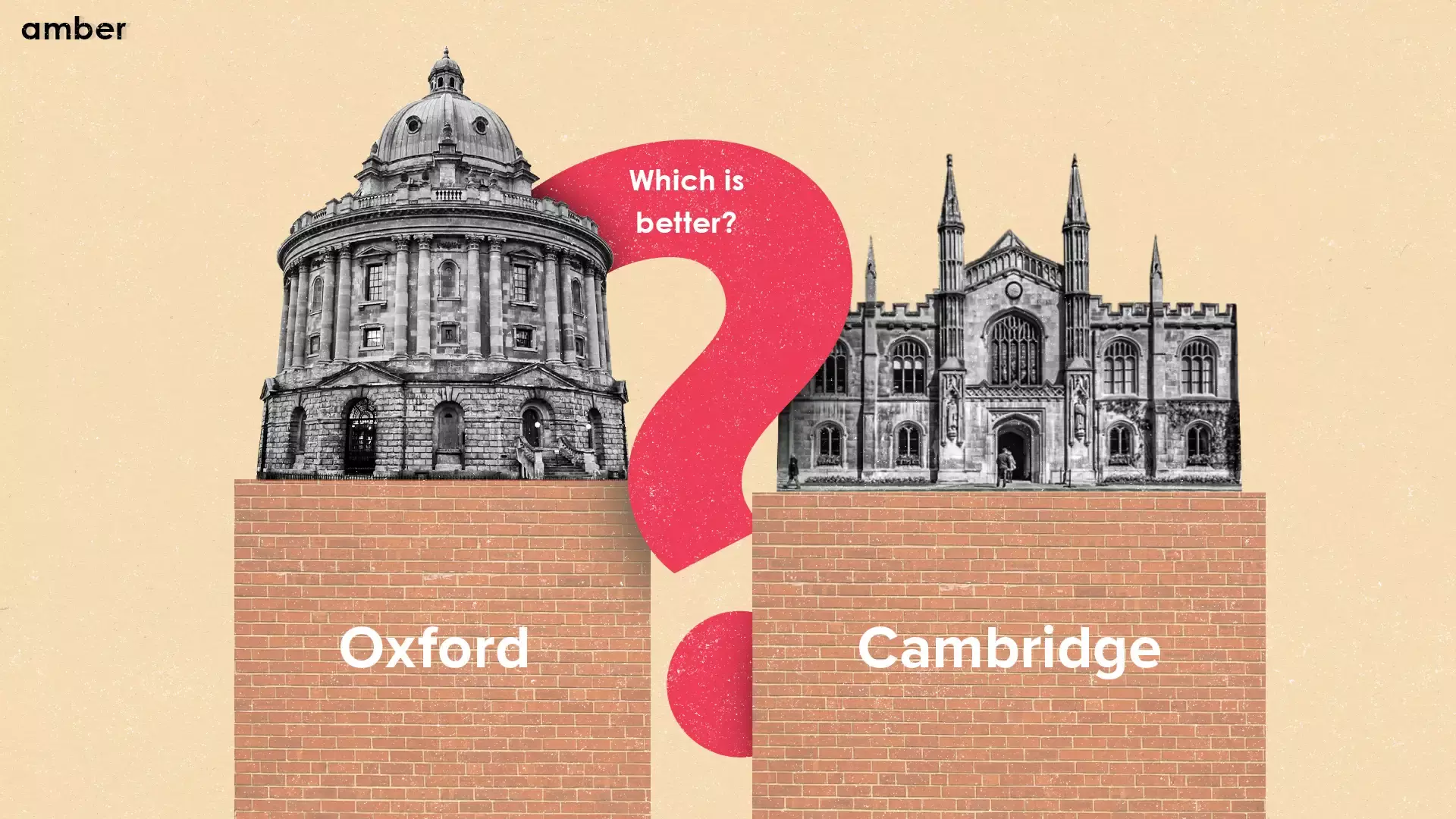
Oxford Vs Cambridge: Which One Is Better In 2024?

amber © 2023. All rights reserved.
4.8/5 on Trustpilot
Rated as "Excellent" • 4700+ Reviews by Students


- PhD in USA – A Guide for 2020/21
- Finding a PhD
A PhD in USA takes approximately 5 – 6 years of full-time study and can cost between $12,000 – $45,000 per academic year. PhD programs in USA differ from that in the UK and Europe in that students must first take taught classes, coursework and exams before starting their research project.
Why Do a PhD in USA?
The United States has long had some of the most distinguished universities and advanced PhD programmes in the world. Combined with curriculum flexibility, rigorous teaching methods, vast funding opportunities, breathtaking campuses and significant career prospects, it’s no wonder that it is one of the most sought-after study destinations for research students.
In addition to comprehensive training standards, here are a few other reasons why a student may choose to undertake their PhD in the United States:
- Longer learning timeframes – A PhD in the US lasts longer than a PhD in the UK or Europe. This allows students to more confidently transition from undergraduate to postgraduate studies; more commonly referred to as ‘graduate studies’ in the US. This gives you the opportunity to learn more about your subject, research methods and academic writing in general before starting your research project.
- World-class universities – It’s no secret that some of the most well-known higher education institutions that continue to dominate global rankings are based in the United States. Although many factors go into determining whether a position is right for you, a PhD at a high-ranking American university will undeniably have many benefits, from excellent learning standards to access to innovative equipment and deep expertise.
- International network – The US has long been a popular choice among PhD students around the world. As such, the US hosts a diverse and multicultural learning environment in which many research students will quickly feel at home.
- Opportunities – With over 4,000 universities in the US, we can safely say you will have plenty of opportunities to find the ideal combination of project, supervisor and university that works for you.
Universities in USA
Universities in the United States can be divided into two types: public universities and private universities.
Public universities are financed by the state in which they are based. Because of this, public universities charge less for students from within the state and more for students from outside the state, including international students.
Private universities are not financed by their state, but by private donors, research funds and tuition fees. For this reason, private universities generally charge higher tuition fees than public universities and require all students to pay the same amount, regardless of whether they come from out-of-state or abroad.
According to the Times Higher Education World University Rankings 2021 , eight of the top ten universities in the world are located in the United States. These are:
Method of Study
The main difference between a PhD in the US and a PhD in Europe lies in the program structure. Whereas a European PhD essentially consists of a single phase lasting three to four years , an American PhD consists of three different phases, each with its own time frame.
- Phase One – The first phase lasts approximately two years and focuses on building a basic foundation for the doctoral student. This phase consists largely of taught components such as lectures, tutorials and laboratory sessions, in which the student learns more about theoretical concepts and research methods within their discipline.
- Phase Two – The second phase can be considered an assessment phase, which runs both periodically alongside and at the end of the first phase. Here, students complete coursework and take exams on the basis of the material they have covered of which they must pass in order to proceed to the third phase.
- Phase Three – The third phase lasts approximately three years and resembles the European PhD structure. During this period, the student undertakes an independent research project, including forming a research design, conducting experiments, writing a thesis (more commonly referred to in the USA as a dissertation) and sitting a viva exam.
Teaching Requirements
Besides structure, a key difference between a PhD program in the US and in Europe is the focus on teaching requirements. In the US, doctoral students are expected to lecture, lead tutorials, host laboratory sessions, mark coursework and provide office hours for undergraduate students. Although students studying in European will likely contribute to these at some point during their study, this would normally be on a voluntary basis and involve less time commitment.
Research Flexibility
Another difference is project flexibility. In Europe, students typically apply to a PhD project predetermined by a supervisor, and although there may be some scope to adapt the project, depending on the funding provider , it will usually be limited to how the project is carried out rather than what it is about. In the US, however, a student applies to become a doctoral candidate within a department rather than applying for a particular research project. This is because students are expected to decide on their thesis topic (also commonly referred to as a dissertation research topic) near the end of their first phase after they have developed a better understanding of their subject and know where their interests lie. Therefore, research students in the US generally have more flexibility and influence in the direction of their research than students in the United Kingdom or Europe.
PhD Admission Requirements in USA
PhD admission into US universities can be highly competitive, both because of the limited number of positions and the large number of annual applicants.
The eligibility requirements for a doctoral program in the USA can generally be divided into four sections:

- Grade Point Average (GPA) – in the US, a scoring system known as Grade Point Average is used to measure academic ability. A student’s GPA is calculated as a weighted score of the subjects they study during their undergraduate degree; an equivalent score is calculated by universities for international applicants. Although universities rarely set minimum GPA requirements for doctoral study, it’s worth being aware that a GPA of 3.0 is equivalent to a UK second class honours (2:1); the typical entry requirement for UK universities.
- Graduate Records Exam (GRE) – most universities will require you to take a series of examinations known as Graduate Records Exams, which are used to determine your suitability for graduate study. GREs will assess your analytical, reasoning and critical thinking skills as well as your depth of your subject.
- Student aptitude – in addition to academic ability, US universities also look for characteristics of a strong researcher. These include traits such as engaging in the subject in your own time, e.g. by attending talks and conferences, demonstrating a high degree of independence and enthusiasm, and a general passion for your subject.
- English Language Proficiency – international students whose first language is not English must sit language exams such as IELTS or TOELF to demonstrate their English language proficiency.
International students will also require a F1 student visa in order to study in the US, however, you would typically apply for this after you have secured a place into a doctorate program.
How to Apply for PhD in USA
When applying for a PhD position at a graduate school, the application process will differ between universities, however, they will all typically ask for the following:
- Academic CV – a short document summarising your educational background and current level of experience .
- Personal statement – a document which outlines why you believe you are suitable for PhD study and your passion for the subject.
- Academic transcripts – a complete breakdown of the modules and their respective marks you have taken as part of your previous/current degree.
- GRE scores – a transcript of your Graduate Records Exam results.
- Research statement – a condensed version of a research proposal outlining your general research interests, if required.
- Recommendation letters – references from several academic referees who endorse your qualities as a person, your abilities as a student and your potential as a doctoral researcher.
Application Deadlines and Fees
Since PhD programs in the United States have taught components, they commence at the same time as all other taught degrees, and therefore share the same application deadlines and start dates. This corresponds to an application period that typically begins in August and ends in February. Admission decisions are typically made in April, with successful students starting in August/September.
When you apply to a graduate school, you will be expected to pay a fee for each doctorate application to cover the school’s administrative costs for processing your application. The fee varies from university to university, but typically ranges from $50 to $100 .
Funding your PhD in USA
It’s very common for a PhD student to receive financial aid in the form of a PhD scholarship; in fact, this will be the case for the vast majority of students in the US.
PhD funding can be ‘fully funded’ covering the student’s graduate program tuition fees, accommodation and living costs, or ‘partially funded’ covering the student’s tuition fee only in part or full.
Besides funding, a graduate student can take on an assistantship, such as a graduate teaching assistant or research assistant, in which they take on a part-time salaried position at the university alongside their studies.
Due to the international and collaborate nature of American universities, there are also a number of international scholarships available, such as the Fulbright Scholarship and the AAUW International Fellowship .
PhD Duration in USA
In the US, a PhD takes approximately 5 – 6 years to complete if studying full-time, and 8 – 10 years if studying part-time.
If you already have a Master’s degree, your first phase can be shortened by one year at the discretion of the university.
Cost of a PhD in USA
The cost of a PhD program in the US can vary considerably depending on the type of university, i.e. whether it’s a public or private university, the doctoral course, i.e. whether it’s in a STEM subject such as computer science, engineering or a non-STEM subject, and whether you are a home or international student.
In general, however, the typical annual tuition fee for a PhD in the US is between $12,000 and $45,000 per academic year.
As with any doctoral degree, additional costs may include travel for collaborations, bench fees, accommodation and living expenses.
Browse PhDs Now
Join thousands of students.
Join thousands of other students and stay up to date with the latest PhD programmes, funding opportunities and advice.

Scholarships
Events & Webinars
Course Finder
Universities
Counsellors
Back to all Blogs

Your Roadmap to a PhD in the USA: The Ultimate Guide | 2023
A PhD (Doctor of Philosophy) is a postgraduate research degree awarded after a research project.
PhD programs in the USA often involve coursework, seminars, and independent research projects. The program length varies depending on the field of study and the research topic. However, most PhD programs require students to complete a minimum of four years of study and research. Upon completion of the program, graduates are well-prepared for careers in academia, research, and industry.
Universities worldwide highly regard and recognize the PhD program in the United States. It also gives you access to cutting-edge research and knowledge and the chance to collaborate with renowned academic faculty members.
How do you select the most suitable PhD program for you?
Step 1 - Before selecting a PhD program, it is important to identify your research interests.
Step 2 - Once you have identified your research interests, you can start researching potential PhD programs.
Step 3 - When researching PhD programs, it is important to consider their admission requirements.
Step 4 - Look for faculty members whose research interests align with yours, and whose work you find interesting.
Step 5 - When selecting a PhD program, you should also consider the location of the university, as well as the resources available to you.
Types of PhD
1.) Traditional PhD - A conventional PhD is a doctoral degree awarded after a research-based dissertation . It is the highest academic degree and typically requires three to five years of study and research. A dissertation is a written work that evaluates, analyzes, and synthesizes research.
2.) Professional Doctorate - A professional doctorate is a type of doctorate that focuses on practice-based research and prepares students for professional careers like law (J.D.J.D.), medicine (M.D.M.D.), or dentistry (D.D.S.). It enhances their skills, knowledge, and expertise in their chosen field. It typically requires coursework, a comprehensive exam, a dissertation, internships, and clinical rotations.
3.) Joint PhD - A joint PhD is a doctorate obtained jointly from two or more universities . This type of program often involves collaboration between two universities, whereby a student studies at both universities and receives a joint degree from both.
4.) Interdisciplinary PhD - An interdisciplinary PhD is a type of doctoral program that allows students to integrate different areas of knowledge and research . It combines elements from two or more disciplinary fields, such as sociology, psychology, and anthropology, to create an original research focus or approach.
Top PhD programs in the USA
Popular S.T.E.M. PhD programs in the USA include computer science, engineering, mathematics, and physics .
Other popular PhD programs include -
- Business Administration and Management
With a PhD in business administration and management, one can gain an advanced understanding of business and management fundamentals.
A PhD in psychology is a terminal degree that qualifies students to become researchers, professors, or practitioners in the field. It focuses on advanced study in a particular area of psychology, such as clinical, developmental, or cognitive psychology.
- Public Health
A PhD in public Health prepares students to become public health professionals. It gives them the necessary knowledge and skills to conduct research, analyze data, and develop and implement evidence-based public health interventions
A PhD in Economics provides a strong foundation and prepares students to pursue research-oriented jobs in academia, government, and the private sector.
Top Universities for PhD in the USA
- Massachusetts Institute of Technology (MIT)
- Stanford University
- Harvard University
- University of California, Berkeley
- California Institute of Technology (Caltech)
- Princeton University
- University of Chicago
- University of Michigan-Ann Arbor
- Columbia University
- Johns Hopkins University
Course Structure
Duration - 4-6 years
Academic Year - August-December and January-May
How to apply for PhD in the USA?
Ready to make the right career move.
Get in Touch with Our Counselors!
Get important information on Whatsapp
The cost of a PhD in the USA varies depending on the school and field of study. Most PhD programs are funded by research grants, teaching fellowships, and scholarships. Students may still need to cover tuition, fees, books, and living expenses.
The total cost of a PhD program, including tuition and living expenses, can range from USD 131,000 to USD 263,000, depending on how long it takes to complete the program.
- Public Institutions charge an average of USD 12,394 annually .
- Private Institutions charge an average of USD 26,621 annually
How to Fund your PhD?
Funding for PhD programs in the USA is available through universities and research grants.
Fellowships - Several fellowships and grants including university-specific fellowships, government-funded grants, and private scholarships. Some examples of such fellowships are Fulbright-Nehru Fellowships and Tata Scholarships.
Teaching Assistantships - These are among the most common forms of funding for PhD students. Teaching assistantships involve working as an instructor or teaching assistant, usually at the university where the student is enrolled.
External Grants and Scholarships - External grants and scholarships are an excellent way to fund your PhD, philanthropic organizations, and government agencies often offer these grants and scholarships. They are usually merit-based, so you must demonstrate academic excellence to be eligible.
Eligibility Criteria
- Applicants must have a bachelor's degree or equivalent coursework .
- Applicants must also demonstrate strong academic performance and provide letters of recommendation from professors or mentors.
- Some programs also require applicants to take entrance exams such as the GRE or GMAT.
Generally, to be eligible for a PhD in the USA , you must -
- Have completed at least 16 years of education, with a bachelor's degree, master's degree, or the equivalent.
- Letters of Recommendation
- Well-written Research Proposal
- Minimum GPA. of 3 - 3.6 out of 4
- English Proficiency Test Scores
- GRE and GMAT are the actual entrance tests. A 320+ GRE score is acceptable.
Career options post PhD inGermany
Post-study visa options.
Optional Practical Training (OPT) - International students can take advantage of a temporary work permit known as Optional Practical Training, which permits them to work in the USA for up to a year after graduation. Furthermore, students who have majored in S.T.E.M. may be eligible for an additional 24 months of OPT
H-1B Visa - The H-1B visa is a work visa for highly qualified employees, such as recent graduates with specialized skills or knowledge. Specifically, it is employer-sponsored and typically requires a job offer from an American employer.
F-1 Visa Extension - Students pursuing further education or research in the USA may be eligible for an F-1 visa extension.
EB-1 Visa : This is a green card option for people with exceptional ability in their field, such as those with advanced degrees or exemplary achievements.
O-1 Visa - This is a work visa that is granted to individuals who have showcased extraordinary ability in their field, which could include those with advanced degrees or exceptional achievements.
Frequently Asked Questions
Q.1) how important is contacting faculty before i apply.
For PhD programs, it is highly recommended that you contact faculty before you apply. This will allow you to understand their research interests and determine if there is a potential fit. It also allows the faculty members to get to know you and your research interests, which can be beneficial when considering your application.
Q.2) How do you approach prospective supervisors?
As a PhD student, you must demonstrate your enthusiasm, knowledge, and research experience when approaching potential supervisors. Be prepared to explain why you are interested in their work and discuss your research ideas and any relevant experience. Additionally, be prepared with any questions about the research program and expectations.
Q.3) How long is a PhD dissertation?
The length of a PhD dissertation varies depending on the field and the university, but typically it's between 80,000 and 100,000 words.
Q.4) Do you need to write your research proposal?
Yes, in most cases, you do. Writing your research proposal is important because it allows you to explain the research topic you are interested in and how you plan to approach it. It also allows you to demonstrate your knowledge and understanding of the case and refine your research questions. If you need help writing your research proposal, consider contacting a tutor who can provide guidance and feedback as you develop your proposal.
Kickstart your PhD in The USA!
Get in Touch with Our Counsellors
Begin your Overseas Journey with us
Recent blogs.
- Home »
Studying a PhD in The USA - The Complete Guide
Find your perfect postgrad program search our database of 30,000 courses.
The USA is a favourable postgraduate study destination for international students due to the high standard of academic study and the wide variety of subjects. By undertaking a PhD in the USA, you will find yourself becoming an internationally recognised expert in your chosen field.
A Doctor of Philosophy (PhD) from the USA is considered the highest awarded degree in many US universities and institutes for most fields of study. For many international students, it's a dream course that offers an exciting new life chapter.
Attending Grad School for a PhD in the USA is not the same as undertaking a PhD in Europe or the UK , it can often be a different experience. However, studying abroad will improve your global cultural understanding in addition to your network of contacts for your future career. A PhD degree is often required when you apply for high-level management jobs, government expert positions, and careers like a university professor, researcher, or scientist in many fields.
There are a multitude of reasons why the United States is a fantastic choice for your PhD studies. Here’s everything you need to know about studying a PhD in the USA.
1. PhD course length
The total length of a PhD in the USA is between 4-8 years for full-time students and 8-10 years for part-time students, depending on your field of study. PhDs can be completed in 4-5 years for students with a masters degree in an appropriate subject. Students typically dedicate 1-4 years on coursework, followed by 2-4 years of dissertation work. In the USA, the academic year is divided into two teaching semesters: August to December and January to May.
Having a longer duration for your PhD allows for greater opportunities to adjust to your course and find your footing. This enables you to concentrate on developing a more comprehensive understanding of your chosen subject at a more relaxed pace.
2. World-class universities
The US repeatedly tops the charts of worldwide ranking universities, so what better place to do your PhD studies? Although rankings shouldn’t be the main deciding factor when making your PhD choice, they're a great indicator of educational expertise.
There are many factors to consider when choosing the location for your PhD. Does the university have a high employability rate after graduation? Are you wanting to go public or private university? What kind of research facilities do they have?
Be sure to do some research before making a decision on your perfect place of study.
3. International community
The United States is a popular choice for international students from all over the world – making it an inspirational and cosmopolitan choice for your PhD studies. No matter what your choice of academic study is, you are guaranteed to find a diverse community that welcomes students from all backgrounds.
4. Affordable tuition fees
There are various tuition fee options available for PhD students regardless of your budget. The American higher education system is often associated with high fees and substantial student debt, but in fact, studying at an American university isn't always expensive, and many institutions offer affordable courses. For instance, PhD costs range from $28,000 to $55,000, which shows that finding a PhD course that’s more affordable is possible.
5. Student experience
American universities typically have vibrant campus communities with a wide range of extracurricular activities, clubs and organisations. As a student, you will have the opportunity to engage in various social, cultural and recreational activities alongside your academic studies.
6. Student Support
American universities typically provide comprehensive support services to assist you on your PhD journey. These services may include academic advising, counselling, career services, libraries, writing centres and various student organisations aimed at fostering your personal and professional development.
7. Land of opportunity
It's fair to say that student life in the USA offers something for everyone, regardless of what you're looking for from a PhD. With 50 states, six time zones, and thousands of higher-education providers, there's an opportunity waiting for every individual across the globe.
So let’s take a look at some of the key factors to consider when studying for a PhD in the USA.
Studying a PhD in the USA: top tips
Who is eligible for a phd in the usa.
To be eligible for PhD in the USA, generally students should have completed a graduate degree with a minimum GPA of 3.0, provide proof of English language proficiency, GRE scores and other supporting documents. The eligibility criteria for a PhD in the USA can vary depending on the specific university and program.
Can I get a PhD without a masters degree?
Yes, you can pursue a PhD without having a masters. Universities in the USA do not require a masters for you to apply. Because of the graduate programs in the US, you will receive your masters degree once you have completed your coursework stage. This practice combines the masters and PhD into one.
The eligibility criteria and requirements for direct entry PhD programs vary among institutions and fields of study, so it is advisable to check the entry requirements of the specific university or course you are interested in.
How to apply for a PhD in the USA
When applying for your chosen subject in the USA, you should expect to provide relevant information and statements to the university. This will include:
Completed application form – provided by your preferred university.
A personal statement – on why you want to study the subject, your research interests and career goals. Be sure to include any extracurricular activities and achievements within the body of your statement.
References – universities will expect that your referees will recommend you for the chosen course.
Test scores and grades – you will generally need to submit scores from standardised tests like the Graduate Record Examination (GRE) or the Graduate Management Admission Test (GMAT).
English Language Proficiency – international applicants whose native language is not English usually need to provide proof of English language proficiency through tests like the Test of English as a Foreign Language (TOEFL) or the International English Language Testing System (IELTS). It varies from institution to institution, but international students in the USA are required to have a TOEFL score of about 90.
Samples of work – it is recommended that you provide some work you have done that is relevant to your chosen subject. You may even be asked to complete a small task during the application process.
The application fee.
Method of study
Compared to the UK and Europe , studying a PhD in the USA involves several key differences. Students in the USA are usually in direct contact with their professor, compared with those in the UK where students might find that their PhD program is headed by a professor who gives them a little less flexibility to change their research and study areas. There can be several cultural differences between UK, Europe, and USA university lifestyles. US students are expected to undertake a great deal of teaching and marking, as opposed to PhD students in Europe.
As a result, you may have less free time outside of the university when pursuing a PhD in the USA.
Application for PhD In USA
When applying for your chosen subject, you should expect to provide relevant information and statements to the university. This might include:
A personal statement on why you want to study the subject. Be sure to include any extra-curricular activities and achievements within the body of your statement.
References. Universities will expect that your referees will recommend you for the chosen course.
Test scores and grades. It is important that you provide a list of your awarded grades from previous courses you have studied.
Samples of work. It is recommended that you provide some work you have done that is relevant to your chosen subject. You may even be asked to complete a small task during the application process.
UK and Europe students decide on their PhD thesis subject area before they apply . While taking classes at a graduate level, prospective PhD students in the USA spend up to a year or two deciding on their specific research subject. It is normal to apply for up to six institutions for a PhD in the USA, and students apply to each institution separately as there is no central organisation.
Students in the UK and Europe are expected to apply with an understanding of the subject already, usually in the form of a masters degree, and be ready to start studying at the PhD level straight away. In the USA it is expected that students do not have an in-depth understanding of their subject as they usually only have an undergraduate degree when they apply.
When should I start applying for a PhD in the USA?
Deadlines for applications to PhD programs in the USA tend to be between December and February, and institutions should let you know about your application by April. Most US institutions recommend that you apply as far in advance as you possibly can to give them, and you, plenty of time to make arrangements.
Universities in the USA do not require a masters for you to apply as well. Because of the graduate programs in the US, you will receive your masters degree once you have completed your coursework stage. This practice combines the masters and PhD into one.
It varies from institution to institution, but international students in the USA are required to have a TOEFL score of about 90.
Funding your PhD in USA
PhD students are very likely to receive financial support in the form of PhD scholarships ; some USA PhD students also receive PhD studentships .
Making your PhD application in plenty of time allows you more time to apply for and arrange your PhD funding. Many students find that funding can cover much, or all, of the cost of their PhD studies in the USA, which ranges between $28,000 and $40,000. Deadlines for funding applications can be as early as December before starting your studies in the Autumn/Fall.
There are two types of PhD funding: fully funded, which pays for the student's graduate school tuition fees, accommodation, and living expenses, or partially funded, which pays for the student's tuition only partially or fully.
Can a PhD be fully funded?
Yes, many top universities in the USA offer fully funded PhD programs for eligible students. This funding pays for the student's graduate school tuition fees, accommodation and living expenses. Partially funded PhDs only cover the student's tuition in part or in full.
Some PhD students will receive a stipend from their institution with an assistantship position, but this varies between institutions and between departments within institutions. Other students can find funding from both their own and the American government, and there are plenty of American government schemes like The Fulbright Program that offer funds.
Apply for one of our x5 bursaries worth £2,000
We've launched our new Postgrad Solutions Study Bursaries for 2024. Full-time, part-time, online and blended-learning students eligible. 2024 & 2025 January start dates students welcome. Study postgraduate courses in any subject taught anywhere worldwide.

How long does it take to study a PhD in the USA?
For part-time students in the USA, a PhD can take eight to ten years, but it usually takes five to six years for full-time students. PhDs can be completed in four to five years rather than five or six for students with a masters degree in an appropriate subject.
Top 10 ranked American universities
Based on 2023 worldwide rankings, the following table shows which US universities rank the highest.
Our PhD bursary winner & funding opportunity
Mohammad Abdollahi is a 35-year-old Iranian student studying a PhD in Operational Research at the University of Essex. He was delighted when he found out he’d been awarded a Postgrad Solutions Study Bursary worth £500. As an international student coming to the UK with his wife and two children, it has proved to be an invaluable funding resource as he explains. “It was good news and exciting – I was overwhelmed with joy!”

Related articles
How To Prepare For A PhD Viva
Masters In USA
Lists of Universities in USA
Graduate School USA
Postgrad Solutions Study Bursaries

Exclusive bursaries Open day alerts Funding advice Application tips Latest PG news
Sign up now!

Take 2 minutes to sign up to PGS student services and reap the benefits…
- The chance to apply for one of our 5 PGS Bursaries worth £2,000 each
- Fantastic scholarship updates
- Latest PG news sent directly to you.
Explainer: What are UGC’s new PhD eligibility criteria?
UGC has drawn up new rules for PhD admission, eligibility and programme to bring them in line with NEP 2020. Here’s what changes.
Colleges/Universites Accepting CUET Score
Download list of Colleges/ Universities Accpeting CUET/CUCET Score with Cut-OFFs

R. Radhika | November 15, 2022 | 03:17 PM IST
NEW DELHI: After proposing amendments to the existing guidelines for PhD programmes in March, the University Grants Commission (UGC) has now made extensive changes in regulations on PhD admissions.
Latest: CUET Sample Papers with Solutions by Experts
Don't Miss: DU Admission Process
Suggested: Browse the list of colleges/universities accepting CUET Score
As per the revised PhD eligibility criteria, candidates with a four-year undergraduate degree with a minimum 75% marks or its equivalent grade will be eligible for a PhD.
Such candidates can register after completing a one-year master’s programme after a four-year bachelor’s programme. Students who have completed a conventional three-year bachelor’s degree must complete a two-year master’s degree programme with at least 55% marks or its equivalent grade to be eligible.
Currently, several universities ask for MPhil dissertation for admission to PhD programmes, however, the National Education Policy (NEP 2020) does not endorse the degree. By scrapping MPhil, a preparatory degree for PhD programmes, in the new regulations UGC has aligned the admission requirements with the NEP 2020.
One of the primary changes is the scrapping of 2016 regulations that made publishing a research paper in a peer-reviewed publication a requirement for a PhD. A section of students has called the step one that could “hamper academic rigour” as well as impedes inclusivity in higher education. Despite the relaxation, the All India OBC Students Association (AIOBCSA) has urged the backward class PhD aspirants to work on producing quality research papers .
The UGC has asked higher educational institutes to initiate steps to implement new PhD regulation on Monday.
Also Read| Central institutions contribute over 70 percent of research in India: BHU Study
What are the changes in the PhD admission process?
The UGC has dropped the plan to reserve 60 percent of the total seats for applicants who have qualified the National Eligibility Test (UGC-NET) or Junior Research Fellowship (JRF). Universities and colleges will admit students through the NET or JRF entrance route as well as institute-level entrance exams.
The institute-level entrance test, however, must assign 70% weightage to the entrance test scores and 30% to the performance in the interview or viva-voce. “The entrance test syllabus shall consist of 50% of research methodology, and 50% shall be subject specific,” the new guidelines state.
In the entire duration of the PhD programme, female candidates will be eligible for a maternity leave or child care leave for up to 240 days.

Can MPhil students apply for PhD?
Even though MPhil has been scrapped in the new regulations, the UGC has made provisions for PhD admissions for those who already have an Mphil degree. Candidates who have completed M.Phil. programmes with at least 55% marks in aggregate or its equivalent grade in a foreign educational institute will be eligible for admission to PhD programme in India.
A relaxation of 5% marks has been provided to students who belong to historically marginalised Scheduled Caste, Scheduled Tribe and Other Backward Castes communities. The same relaxation has also been given to differently-abled, and Economically Weaker Section (EWS) students as well.
How will research supervisors be allocated in PhD?
Like before, eligible professors, associate professors and assistant professors can continue to guide up to eight, six, and four PhD candidates respectively at any given time.
In case of interdisciplinary or multidisciplinary research work, if required, UGC rules allow engaging a co-supervisor from outside the department, college or university.
Teachers with less than three years of service before superannuation will not be allowed to take new research scholars under their supervision. However, they can continue to supervise PhD scholars as co-supervisors before attaining the age of 70.
Earlier, teachers were allowed to take up MPhil students along with PhD scholars. After the new rules come into force, this will be discontinued. The new rules also allow supervisors to guide up to two international research scholars on a supernumerary basis “over and above the permitted number of PhD scholars”.
Also Read| Sci-Hub & Open Sources: How an Assam school teacher broke into Stanford’s list of top scientists
What are the new PhD academic requirements?
A PhD scholar will have to earn a minimum of 12 credits which should include a course in “research
and publication ethics”. As per the latest UGC regulations, a PhD candidate will have to appear before a research advisory committee to make a presentation and submit a brief report on the progress for evaluation every semester. In case the progress is unsatisfactory, the committee will “record the reasons” and suggest corrective measures.
All scholars will mandatorily have to undergo training in teaching, education, pedagogy or writing related to their chosen PhD subject. For this, four to six weeks will be assigned to earn credits.
To retain research integrity, the UGC regulations also direct institutions to use “ well-developed software” applications to detect plagiarism in research work. In 2018, the ministry of education had notified stringent measures to counter the long-standing issue of plagiarism in PhD thesis.
What are the part-time PhD UGC guidelines?
The eligibility conditions are the same for both full-time and part-time candidates. Like the former, the part-time candidates will also be assessed every semester.
In addition, the PhD candidates will also have to produce a no-objection certificate or NOC from their employer to be eligible. The NOC must specify that they will be given sufficient time for research work and they will be allowed to take time off to complete the course work.
Follow us for the latest education news on colleges and universities , admission, courses, exams , research, education policies, study abroad and more..
To get in touch, write to us at [email protected] .
How IIMs, top B-schools are helping soldiers transition to the corporate world
IIM Calcutta, Shillong, Lucknow, Indore, Tiruchirapalli offer short courses for armed forces officers. IIM Jammu will launch an executive MBA.
Featured News
- Rise in Indians pursuing overseas education due to women, tier-2, 3 town students: Study abroad consultants
- NCERT launches ‘Bridge Month Programme’ for Class 6 until new textbooks are launched
- Jammu & Kashmir: New reservation policy leaves 69% youth in fray for 36% college seats, job posts
- JNU to launch 3 MTech courses next year, 2 BTech ones ‘soon’
- UGC plans JEE, NEET-like common counselling for admissions based on CUET UG
- Delayed fellowships, low budgets, lack of support making PhD scholars lose interest
Latest Education News
Twelve-year-old boy booked for killing student in thane during fight.

JIPMER Admission 2024: Registration begins for post doctoral fellowship, certificate courses; eligibility

Haryana government orders probe into Mahendragarh school bus accident

SITEEE 2024: Registration closes tomorrow; eligibility, exam pattern

NCPCR seeks uniformity in syllabus, evaluation methods across all schools falling under RTE Act

Download Our App
Start you preparation journey for JEE / NEET for free today with our APP

Research Voyage
Research Tips and Infromation
The Ultimate Guide to Pursuing a PhD Program: Everything You Need to Know

Introduction
Why it is called doctor of philosophy, who can pursue a phd, where to pursue a phd, duration and pattern of learning, doctoral committees and research progress monitoring, whether research publications are a must for phd, can i get funding and scholarships for pursuing phd, challenges and benefits of pursuing a phd.
A PhD, or Doctor of Philosophy, is the highest level of academic degree awarded to individuals who have demonstrated expertise in a specific field through original research and contribution to knowledge.
A PhD is a prestigious credential that signifies a deep understanding of a subject area and the ability to conduct original research, making significant contributions to the advancement of knowledge in a particular field.
The purpose of this post is to provide comprehensive information to those interested in pursuing a PhD, including aspiring researchers, scholars, and professionals, who are seeking in-depth knowledge about what a PhD entails, who can pursue it, where to pursue it, and other essential aspects of the PhD journey.
This post aims to serve as a guide for individuals considering a PhD by providing valuable insights, practical tips, and important considerations to help them make informed decisions about pursuing a PhD and navigating the challenges and opportunities associated with it.
Whether you are a recent graduate, a working professional looking to advance your career, or someone passionate about research and knowledge creation, this post aims to equip you with the knowledge and resources necessary to embark on a successful PhD journey.
What is a PhD Program?
A PhD, or Doctor of Philosophy, is an advanced academic degree that requires extensive research and original contribution to knowledge in a specific field of study. It typically involves in-depth study, critical analysis, and independent research under the guidance of a supervisor or a faculty mentor.
The concept of the PhD originated in medieval Europe in the 12th century and has evolved over time to become the highest level of academic achievement in most countries. It was initially focused on theology and philosophy, but has now expanded to cover a wide range of disciplines, including sciences, humanities, social sciences, engineering, and more.
A PhD can be pursued in various fields, such as natural sciences, social sciences, humanities, engineering, computer science, business, education, health sciences, and more. The specific field of study will depend on the individual’s interests, career goals, and academic background.
Examples of traditional PhD programs include a PhD in Physics, a PhD in History, or a PhD in Psychology. Examples of professional doctorates include a Doctor of Medicine (MD), a Doctor of Education (EdD), or a Doctor of Business Administration (DBA). Examples of interdisciplinary PhD programs include a PhD in Environmental Science, a PhD in Bioinformatics, or a PhD in Social Work and Public Health.
The eligibility criteria for pursuing a PhD may vary depending on the country, institution, and field of study. Generally, a master’s degree in a relevant field is required as the minimum educational qualification. Some PhD programs may also accept exceptional candidates with a bachelor’s degree, particularly for direct-entry PhD programs.
Additionally, candidates may need to fulfill prerequisites, such as completing coursework or demonstrating proficiency in certain skills or languages, as specified by the program or institution. I have written an article on PhD without a Master’s Degree? Exploring Direct PhD Programs . This article will help you to pursue PhD without a Master’s degree.
While meeting the educational qualifications is important, there are other qualities and characteristics that can make a person suitable for a PhD program. These may include research aptitude, analytical skills, critical thinking, curiosity, perseverance, and a passion for the subject of study. PhD programs require a high level of self-motivation, independence, and dedication to research, as well as the ability to work collaboratively with others and communicate effectively.
Skills such as data analysis, literature review, experimental design, statistical analysis, academic writing, and presentation skills are commonly required in PhD programs. Additionally, skills related to research methodologies, critical evaluation of literature, problem-solving, and time management are crucial for successfully completing a PhD program. Please refer my below listed articles for further details on the topics listed in the paragraph.
How to write Results Section of your Research Paper
07 Easy Steps for Writing Discussion Section of a Research Paper
Writing an Effective Research Paper with 11 Major Sections
How to write a better Survey Paper in 06 easy steps?
8 Effective Strategies for Managing Research Time
Research aptitude is a key quality for pursuing a PhD, as it involves conducting original research and contributing to knowledge in a specific field. A genuine passion for the subject of study can provide the motivation and resilience needed to overcome challenges and setbacks that may arise during the PhD journey.
There are various options for pursuing a PhD, including universities, research institutes, and industry collaborations. Universities are traditional settings for PhD programs and offer a wide range of disciplines and research opportunities.
Research institutes, on the other hand, may focus on specific fields or interdisciplinary research and provide a specialized environment for doctoral studies. Industry collaborations, such as partnerships between universities and companies, can offer opportunities for applied research and real-world applications of doctoral research.
Choosing the right institution for your PhD is crucial as it can significantly impact your research experience and future career prospects.
Factors to consider when selecting an institution may include its reputation, faculty expertise in your field of study, research opportunities and facilities, funding options, and location.
The reputation of the institution can affect the recognition and value of your PhD degree, while faculty expertise can influence the quality of supervision and mentorship you receive.
Research opportunities and facilities can provide the resources and support needed to conduct high-quality research, and funding options can impact your financial stability during the PhD program.
To evaluate institutions, you can consider factors such as the institution’s rankings and reputation in your field of study, the research profiles and accomplishments of faculty members, the availability of funding opportunities such as scholarships, grants, or assistantships, the research facilities and infrastructure, the publication record of the institution’s PhD graduates, and the location and accessibility of the institution in terms of networking opportunities and career prospects.
Choosing an institution that aligns with your research interests and career goals is crucial for a fulfilling PhD experience. It is important to identify institutions that have expertise in your field of study and offer research opportunities that align with your research interests and career aspirations.
This can provide you with access to cutting-edge research, collaboration opportunities, and a supportive academic community that can enhance your research skills and broadens your academic and professional networks.
The duration of a PhD program can vary depending on the field of study, country, and institution. On average, a PhD program may take 3-5 years of full-time study to complete, but it can take longer depending on the research requirements and progress of the student. This duration generally includes time for coursework, research, and thesis writing.
For students who are unable to commit to full-time study, some institutions also offer part-time PhD programs. These programs allow students to pursue a PhD while balancing other commitments such as work or family responsibilities. Part-time PhD programs typically have a longer duration than full-time programs, often taking 6-8 years or more to complete.
A typical PhD program consists of several stages. The initial stage often involves PhD proposal presentation to the University , coursework, where students may take classes to gain knowledge and skills related to their research area. After completing the coursework, students may go through comprehensive exams, which assess their understanding of the field and their research proposal.
Once the exams are cleared, students enter the research phase, where they conduct independent research under the guidance of a faculty mentor. Finally, students write their thesis, which presents their original research findings, and defend it in front of a thesis committee in a thesis defense.
PhD programs typically involve a combination of independent research, mentoring by faculty, and participation in conferences and seminars. Independent research is a core component of a PhD program, where students engage in original research work to contribute to the existing body of knowledge in their field.
Faculty mentoring provides guidance and support throughout the research process, including feedback on research design, data analysis, and writing. Participation in conferences and seminars allows students to share their research findings, learn from other researchers, and stay updated with the latest developments in their field.
The duration and pattern of learning in a PhD program can vary across different fields of study or institutions.
In some fields, such as engineering or physical sciences, PhD programs may involve more hands-on research and experimentation, which could extend the duration of the program. In contrast, in fields such as humanities or social sciences, PhD programs may place more emphasis on literature reviews, data analysis, and theoretical frameworks.
Additionally, the pattern of learning may also vary across different institutions, with some institutions offering more structured coursework and mentorship opportunities, while others may provide more flexibility and independence in the research process. Part-time PhD programs may also offer more flexibility in terms of course scheduling and research timeline, allowing students to progress at their own pace while balancing other commitments.
In addition to independent research and faculty mentorship, another crucial component of a PhD program is the doctoral committee or research progress monitoring committee. The committee is typically formed by the student and their faculty advisor, and its primary responsibility is to monitor the progress of the student’s research and provide guidance and feedback to ensure the successful completion of the PhD program.
The committee usually consists of three to five members, including the student’s faculty advisor, other faculty members from the same or related departments, and sometimes external experts in the field. The committee is responsible for reviewing the student’s research proposal, monitoring the research progress, providing feedback on the research design and methodology, and evaluating the student’s research findings and thesis.
The doctoral committee plays a critical role in ensuring that the student’s research is of high quality, and original, and contributes to the existing body of knowledge in the field. The committee also helps the student to identify and address any gaps or limitations in their research and provides guidance on how to overcome challenges and make progress.
The committee typically meets with the student regularly throughout the program, with the frequency and format of meetings varying depending on the institution and the field of study. Some institutions may require formal progress reports or presentations to be made to the committee at specific intervals, while others may have more informal and flexible arrangements.
Overall, the doctoral committee is a vital component of the PhD program, and its role in providing guidance and feedback to the student is essential for the successful completion of the program. Students should work closely with their faculty advisor and the committee members to ensure that their research meets the required standards and contributes to the advancement of knowledge in their field.
I have written an article on How to Present PhD Progress Report to Doctoral Committee Members in 03 Simple Stages . This article will help you to make your progress report presentation in front of doctoral committee members.
Research publications and PhD are highly interrelated as they both involve the creation and dissemination of new knowledge. PhD students are expected to conduct original research that adds to the existing body of knowledge in their field of study. The research findings are then typically disseminated through publications in academic journals, conferences, or books.
The process of publishing research is critical to the success of a PhD student as it showcases their research abilities and contributes to their academic profile. It is also an important aspect of academic career advancement, as publishing is often a requirement for securing faculty positions or research grants.
Furthermore, research publications are often used to establish an individual’s expertise in a particular research area, which can lead to collaborations, networking opportunities, and invitations to speak at conferences or other academic events. As such, publishing research is a vital part of the academic ecosystem and is highly valued in the academic community.
PhD programs can be financially demanding, and it’s important for students to be aware of the various sources of funding available to support their studies. These sources can include research grants, scholarships, fellowships, and assistantships.
Research grants are often provided by funding agencies or organizations that support research in specific fields. Scholarships and fellowships are typically awarded based on academic merit, research potential, or other criteria, and they can provide financial support for tuition fees, living expenses, and research costs. Assistantships are another common source of funding for PhD students, where students work as teaching or research assistants in exchange for financial support.
Financial planning and budgeting are crucial aspects of pursuing a PhD program. PhD students need to carefully manage their finances to cover expenses such as tuition fees, living expenses, research costs, and other miscellaneous expenses.
It’s important for students to create a realistic budget, track their expenses, and plan for any unexpected costs. Proper financial planning can help students avoid unnecessary financial stress and focus on their research and studies.
Finding and securing funding opportunities for a PhD program requires proactive research and preparation. Students can start by exploring funding opportunities offered by their institution, such as scholarships, fellowships, or assistantships. They can also search for external funding sources, such as research grants, foundations, or government agencies, that align with their research area.
Networking with faculty, peers, and professionals in their field can also provide valuable information on funding opportunities. Additionally, students should carefully review the eligibility criteria, deadlines, and application requirements for each funding opportunity and submit their applications in a timely manner.”
In the field of science and technology, there are various research grants offered by organizations such as the National Science Foundation (NSF) or the National Institutes of Health (NIH) , which provide funding for research projects related to specific areas of study.
In the field of social sciences, there are scholarships and fellowships offered by organizations such as the Social Science Research Council (SSRC) or the American Psychological Association (APA ), which provide financial support for doctoral research or fieldwork. Many universities and research institutes also offer their own scholarships or assistantship programs for PhD students, which can provide funding for tuition fees, stipends, or research expenses.
Pursuing a PhD can be a challenging endeavor that requires dedication, perseverance, and resilience. PhD programs are known for their long duration, often lasting several years, which can pose challenges in terms of time management, motivation, and maintaining focus.
The rigorous research and academic requirements of a PhD program, including conducting original research, analyzing data, and writing a thesis, can also be intellectually and emotionally demanding.
Balancing research work with other responsibilities, such as teaching, coursework, or personal commitments, can be challenging as well. It’s important for PhD students to be prepared to face these challenges and develop strategies to overcome them.
Despite the challenges, pursuing a PhD can be a rewarding experience with several benefits. PhD programs offer opportunities for personal and professional growth. Through the process of conducting independent research, PhD students develop critical thinking skills, problem-solving abilities, and expertise in their field of study.
PhD programs also provide opportunities for networking and collaboration with renowned faculty and fellow researchers, which can broaden students’ professional networks and open up career opportunities. Moreover, completing a PhD and obtaining a doctoral degree can enhance career prospects and qualify individuals for academic and research positions.
Additionally, pursuing a PhD allows individuals to contribute to knowledge and society by advancing the understanding of a particular field or topic through their original research, which can have a positive impact on their field and beyond.
In the field of engineering, challenges in pursuing a PhD may include the need to design and conduct complex experiments, manage large datasets, or navigate the complexities of interdisciplinary research. Benefits can include opportunities to collaborate with industry partners, develop innovative solutions to real-world problems, and contribute to technological advancements.
In the field of humanities, challenges may involve extensive literature reviews, language barriers, or managing fieldwork in remote locations. Benefits can include opportunities to conduct original research that sheds light on cultural, historical, or societal aspects, and contribute to the enrichment of knowledge in the field.
In this post, we have explored the world of PhD programs, including what a PhD is and its significance in the academic world. We discussed the different types of PhD programs, the eligibility criteria, and the options for pursuing a PhD. We also covered the duration and pattern of learning in a typical PhD program, the importance of funding and scholarships, and the challenges and benefits of pursuing a PhD.
Before embarking on the journey of pursuing a PhD, it is crucial to carefully consider various aspects, including the field of study, program requirements, eligibility criteria, funding options, and personal commitments. Thorough research and self-assessment are essential to make an informed decision and set realistic expectations for the PhD journey ahead.
If you are passionate about your field of study and aspire to contribute to knowledge and society through research, pursuing a PhD can be a fulfilling and rewarding path. Take the next steps by researching potential PhD programs, reaching out to faculty or mentors for guidance, and preparing your application materials. Keep in mind the challenges and benefits discussed in this pillar post, and be prepared to invest time, effort, and perseverance in your PhD journey. Best of luck in your pursuit of a PhD.
Upcoming Events
- Visit the Upcoming International Conferences at Exotic Travel Destinations with Travel Plan
- Visit for Research Internships Worldwide

Recent Posts
- 04 Reasons for Outsourcing Academic Conference Management
- How to Put Research Grants on Your CV ?
- How to Request for Journal Publishing Charge (APC) Discount or Waiver?
- Do Review Papers Count for the Award of a PhD Degree?
- Vinay Kabadi, University of Melbourne, Interview on Award-Winning Research
- All Blog Posts
- Research Career
- Research Conference
- Research Internship
- Research Journal
- Research Tools
- Uncategorized
- Research Conferences
- Research Journals
- Research Grants
- Internships
- Research Internships
- Email Templates
- Conferences
- Blog Partners
- Privacy Policy
Copyright © 2024 Research Voyage
Design by ThemesDNA.com

- Guide to Applying for Graduate School
The process of preparing for and applying to a PhD program can be overwhelming. The University of Pennsylvania has created this webpage to help prospective PhD students think through the process so you can put together a strong application.
A Doctor of Philosophy (PhD) is the highest degree one may obtain within a particular field of study. This ranges from studies in Science, Technology, Engineering, and Math (STEM) fields; Social Science fields such as Education, Economics, Political Science, and Sociology; as well as Humanities fields such as English, History, Music, Philosophy, and more. The PhD degree aims to prepare people to think critically, develop research, and produce scholarship that may be used for further research or implementation . The PhD historically prepared students to take on faculty roles in colleges and universities, and that is still the goal for many students pursuing the PhD. However, today the PhD is a sought-after degree in many other industries including pharmaceutical research, arts organizations and other nonprofits, publishing, government policy, big tech, finance, and more.
- Who can apply to a PhD program? PhD education is available to people from various educational, occupational, socioeconomic, and demographic backgrounds.
- Who should get a PhD? People interested in uncovering new ideas, solutions, or processes within a specific area of study through conducting independent research.
- Why is it important for diverse candidates to become PhD holders? Our world thrives on heterogeneous ideas and experiences, which is why it is indispensable to include students with diverse perspectives in our PhD programs. These students will generate important and original research.
Most PhD programs are fully funded, meaning that for a specific number of years, the program will pay for your tuition and fees and health insurance, as well as provide you with a stipend for living expenses . The structure of this funding varies by field. Below is an outline of general funding information as well as trends according to field of study.
- Teaching Assistantships or Research Assistantships: Part-time service that provides teaching and research training opportunities within your area of study.
- Funding packages provided through faculty research grants: Many STEM fields fund students through research grants awarded to faculty. In these cases, students perform research alongside the faculty.
- Fellowships: Internal or external merit-based funding. Some fellowships require an application while others are given via nomination. Educational institutions typically have a resource listing fellowship opportunities. Winning a competitive fellowship looks good on your resume.
- Grants: Requires an application with supporting materials of either your grades, scholarly work, and/or anticipated research. These are available through internal and external means. Grants greatly vary so be sure to always understand the requirements. Educational institutions typically have a resource listing grant opportunities. Winning a competitive grant looks good on your resume.
- Employment: For example, serving as a residential advisor, on-campus jobs, etc. Some PhD programs restrict additional employment, so be sure to check before applying for jobs.
- The funding opportunities described here often can be combined.
Choosing a school or program that provides the most potential funding may be a challenging decision. The value of the same amount of funding will differ depending on the cost of living in different geographic locations. Admitted applicants should investigate cost-of-living tools (available on the web) and be sure to understand how their funding will be structured. Ask questions when you are admitted, such as:
- Could you share more about your program’s funding mechanism?
- For how long is funding guaranteed? How does that compare to the average time-to-completion? Historically, what percentage of students have received funding beyond the guaranteed funding package?
- Does funding cover tuition, fees, books, health insurance?
- Does the funding rely on teaching, research, or other service? How much and for how long?
Choosing a program for your studies is a personal decision that should reflect not only your research interests, but your work style, and interests outside of the classroom. Here we have identified five key tips to consider when selecting schools.
- Ask about which programs are strong in your area of interest, which have high completion rates, and which have career outcomes that align with your goals.
- Explore the websites of the professional academic associations in the field(s) that interest you. Many will have a directory of doctoral programs and other resources for graduate students. For example, see the American Economic Association’s list of graduate programs and their preparing for graduate school page .
- Conduct a general internet search with terms related to your research interest.
- Determine your geographic and personal preferences. Does the area meet your community needs? Is it important that the university aligns with your sociopolitical values? Do you prefer a large city or a smaller/college town? Is there a particular region(s) that has better access to resources needed to conduct your research?
- Access your current or former university career center. These services are often still available for former students!
- As you narrow your choices, try to identify at least 3 faculty in the programs of interest with whom you’d like to study. Also note how many of them have tenure. If relevant, research which of those faculty are taking on advisees in your year of matriculation.
- Read articles from faculty with similar research interests.
- Note the number of awards, publications, and service activities of faculty.
- Identify research opportunities funded by both your program and university at large.
- Connect with current and former students in the program for informational interviews.
- Connect with campus Diversity Offices.
- Whenever possible, before submitting your applications, make an appointment to visit the campuses and department(s) that interest you.
- Use LinkedIn to see what graduates of your program are doing and how they are involved in their communities.
- Estimate your feasible cost of living by geographic location and compare to the funding package offered.
- Consider availability of health insurance, childcare, housing, transportation, and other fringe benefits.
- Connect with a local bank or your prospective university’s financial services office for budgeting, savings, and other financial wellness advice.
- Research the career outcomes for PhD graduates from the institutions that interest you in your specific field.
- Your First Year in a Ph.D. Program
- What Does Academic Success Mean and How to Achieve it? (STEM)
- Pathways to Science (STEM)
- 7 Advantages PhDs Have Over Other Job Candidates (Industry)
- During your undergraduate/master’s education, you should pursue coursework and/or research that will prepare you for the higher expectations of a PhD program; for example, taking a research methods course, pursuing a summer research experience, or conducting research with a professor at your home institution.
- Identify instructors who could write a letter of recommendation. Share with those instructors your interest in doctoral studies; faculty can be excellent resources for advice as well as recommendations!
- Experiences outside of higher education can also strengthen your PhD application. These may range from project management to volunteer work.
- Develop soft or hard skills. A soft skill that is most useful from the first day of your PhD program is networking. This is necessary not only for meeting other students but also to find collaborators with similar research interests and selecting faculty for your dissertation committee. Learning how to negotiate will also serve you well when approaching collaborative projects. Hard skills related to your field might include learning statistical analysis software, economic theory, a foreign language, or search engine optimization. In short, identify a few soft and hard skills that you can familiarize yourself with prior to your program’s start date.
- Finally, prepare by identifying leading researchers and practitioners in your field , exploring peer-reviewed literature and/or publications, and gain familiarity with research methods.
- Typically, PhD applications are due 10-12 months in advance of the program’s start date (i.e. apply in November to start the following September). A good rule of thumb is to begin your application process 6 months before the deadline.
- The availability of reduced application fees or fee waivers varies and sometimes depends on financial status and/or experiences (AmeriCorps, National Society of Black Engineers, attending certain conferences, etc.). If you are interested in a reduced fee or waiver, reach out to the program coordinator for details.
- Be sure to address all the specific questions/topics in the statement prompt.
- Clearly state why you want to pursue a PhD.
- Propose your research interest.
- Identify the faculty you’d like to study under.
- Discuss the unique qualities/experiences you offer to the program/school.
- Outline what you hope to do with your degree.
- Ask for recommendation letters early in the process, at least 2-4 weeks before the deadline. A good letter takes time to write!
- Provide recommenders with your resume, information about the program, your statement of purpose and/or information about your research interests and research goals.
- Consider your current/former instructors, supervisors, colleagues. These should be people who can speak to your work ethic, academic abilities, and research interests.
- Test scores (i.e. TOEFL, GRE, GMAT, etc.) may or may not be required.
- All transcripts including those for coursework completed abroad and transfer credits. Some programs require official transcripts, which take longer to procure.
- Resume/Curriculum Vitae (CV)
- Writing sample (field dependent): Include a graduate-level sample and update any statements, statistics, etc. as needed. It is highly encouraged that you edit your previous work.
- Diversity statement: Many institutions offer an optional short statement where students can expand on their diverse backgrounds and experiences that may contribute to the diversity interests/efforts of the school.
- Dress professionally, even if the interview is virtual. You don’t necessarily need to wear a suit but dress pants/skirt and a blouse/button down shirt would be appropriate.
- Develop an engaging elevator pitch, a 30-60 second summary of your research interests and what you hope to gain by becoming a student at that particular university. Practice your pitch with a career counselor, faculty advisor, or friends, and ask for honest feedback.
- Prepare 2-3 questions to ask during the interview. These could include questions about program expectations, the experience and success of their PhD students, and (academic/financial/mental health) support for PhD students.
- Some interview programs will include multiple activities including a social event. Be sure to maintain a professional attitude: do not drink too much and keep conversation on academic/professional topics.
- This is also your opportunity to decide whether this campus is a good fit for you.
- Academia Insider is a good resource.
Unlike undergraduate and master’s level education, coursework is just one component of the degree. A PhD comes with additional expectations: you must independently conduct scholarly research in your field of study, train in specific activities such as teaching or lab/field research, pass “milestone” requirements along the way, such as comprehensive exams, and complete the process by writing a dissertation. Furthermore, some fields require you to write multiple articles (number varies by field/program) for conference presentation and/or peer-reviewed publication.
There are other important elements as well:
- Student/Advisor relationship. This is one of the most valuable relationships you can have as a PhD student. Your faculty advisor not only assists you with learning how to approach your research topic, but also typically serves as the lead supervisor of your dissertation research and writing, and ideally mentors you throughout the PhD experience. The selection process of choosing your advisor varies so be sure to know what is expected of you as a student and what is expected of the faculty member. Whenever possible, it is important to align your personality and work style with that of your faculty advisor. Many universities publish expectations for the PhD student/faculty advisor relationship; AMP’ed is Penn’s guide.
- Other relationships: Your faculty advisor is far from the only important person during your PhD career. Other faculty members will also serve on your dissertation committee and be potential mentors. Students in your program can also provide good advice and guidance along the way.
- Coursework: Most programs have a number of required courses all students must take regardless of research interests. Once you have finished this requirement, the classes you choose should closely align with your research topic. Choose courses that will help you learn more about your dissertation topic and research methods. It is a good idea to discuss elective course selection with your advisor.
- The dissertation is a large-scale, written document that explores a narrow research topic of your choice. It is the final step before receiving your degree and must be presented and “defended” to your dissertation committee (made up of faculty members) for approval. Defending means that you have to answer in-depth questions about your topic. While this might sound daunting, the dissertation is simply a demonstration of all the knowledge and expertise you have acquired through your PhD education.
- Networking comes in many forms and includes connections with your fellow classmates, faculty members, and scholarly community. Formal networking events typically take place at academic conferences, where scholars and students present research. Increasing your academic circle will not only allow you to have study buddies, but offer you the opportunity to collaborate on articles or even gain employment. Your school’s career center can provide best practices for effective networking.
Explore graduate programs at the University of Pennsylvania and click on the programs that interest you to learn more about admissions and academic requirements.
Upcoming Penn recruitment events include:
- Fontaine Fellows Recruitment Dinner (by invitation only): every March
- IDDEAS@Wharton (Introduction to Diversity in Doctoral Education and Scholarship): April 18-19, 2024. Deadline to apply is January 31.
- DEEPenn STEM (Diversity Equity Engagement at Penn in STEM): October 11-13, 2024. Application opens in March 2024.
- DivE In Weekend (Diversity & Equity Initiative for Mind Research): Fall 2024
National conferences to explore:
- The Leadership Alliance supports students into research careers
- McNair Scholar Conferences
- SACNAS , the largest multidisciplinary and multicultural STEM diversity event in the U.S.
- ABRCMS , the annual biomedical research conference for minoritized scientists
- The PhD Project for students interested in business PhD programs
Insider's guide: PhD requirements in USA for international students

Pursuing a PhD in the United States can be a life-changing experience for international students looking to enhance their academic qualifications, advance their careers, and expand their horizons. However, before embarking on this journey, it's important to understand the requirements and expectations of the US doctoral education system.
In this article, we'll delve into the essential PhD requirements in the USA for international students, covering academic qualifications, English language proficiency, standardised tests, funding, and visa procedures.
Table of Contents
Academic qualifications, english language proficiency, standardised tests, visa procedures, frequently asked questions.
Academic qualifications are an important requirement for international students seeking to pursue a PhD in the USA. Students are typically required to hold a bachelor's or master's degree from a recognised university, with a strong academic record and relevant coursework.
The specific academic qualifications required for admission to PhD programs can vary depending on the university and program. Some programs may require a bachelor's degree in a specific field, while others may accept students with a bachelor's degree in a related field. Some programs may also require a master's degree, while others may allow students to earn a master's degree as part of the PhD program.
In addition to the degree requirements, international students may be required to provide official transcripts and diplomas from all institutions attended, as well as a course-by-course evaluation of their academic credentials from a recognised credential evaluation service.
It is also important for international students to have relevant coursework and research experience in their field of study. PhD programs in the USA typically require students to conduct independent research and contribute to the advancement of knowledge in their field. Therefore, having a strong academic background and relevant research experience can increase a student's chances of being admitted to a PhD program.
International students should carefully review the academic qualifications required for each program they are interested in and ensure that they meet the requirements. If their qualifications do not meet the requirements, they may need to take additional coursework or earn a higher degree before applying to PhD programs.
Also read: Ultimate guide PhD in the UK
English language proficiency is also one of the essential PhD requirements in USA for international students. The ability to communicate effectively in English is crucial to succeed in academic and professional settings in the US.
Most universities require international students to demonstrate their proficiency in English by taking an English language proficiency exam. The most commonly accepted exams are the TOEFL, IELTS.
The minimum scores required for admission to PhD programs can vary depending on the university and program. Typically, a minimum score of 80 on the TOEFL or 6.5 on the IELTS is required, but some programs may require higher scores.
In addition to the TOEFL or IELTS, some universities may accept other English language proficiency exams, such as the PTE Academic or the Cambridge English: Advanced (CAE) exam.
Also read: PhD Scholarship for Pakistani Students
Standardised tests are an important requirement for international students seeking to pursue a PhD in the USA. Standardised tests are used to assess an applicant's academic abilities and potential for success in a PhD program. The most commonly required standardised tests for PhD programs in the USA include the Graduate Record Examination (GRE) and the Graduate Management Admission Test (GMAT).
The GRE is a standardised test that assesses a student's verbal reasoning, quantitative reasoning, and analytical writing skills. The test is typically required for admission to graduate programs in a wide range of disciplines, including science, engineering, social sciences, and humanities.
The GMAT is a standardised test that assesses a student's analytical writing, integrated reasoning, quantitative reasoning, and verbal reasoning skills. The test is typically required for admission to graduate programs in business and management.
The minimum scores required for admission to PhD programs can vary depending on the university and program. Typically, a minimum score in the 50th percentile or higher is required for the GRE, while a minimum score of 600 or higher is required for the GMAT.
The specific standardised tests required for admission to PhD programs can vary depending on the university and program. Some programs may require the GRE or GMAT, while others may require a different test, such as the Medical College Admission Test (MCAT) for programs in the health sciences.
Funding can be a critical consideration for international students pursuing a PhD in the USA. Pursuing a PhD in the USA can be quite expensive, with tuition and living expenses often exceeding $50,000 per year. While federal financial aid is not available to international students, there are a variety of funding options that may be available to help cover the cost of tuition, living expenses , and research-related expenses.
One common source of funding for PhD students is through teaching or research assistantships. These positions typically provide a stipend or salary in exchange for work done in support of the department or faculty member providing the funding. Assistantship opportunities can be competitive, but they can provide valuable experience and financial support for students throughout their program.
Scholarships and fellowships can also be a valuable source of funding for international students pursuing a PhD in the USA. These awards may be offered by the university, private foundations, or other organisations, and can cover some or all of the cost of tuition and living expenses.
International students may also be eligible for funding from their home country or through external sources such as grants or fellowships. It's important for students to research these opportunities and understand any restrictions or requirements that may apply.
Finally, some students may choose to fund their PhD program through personal savings or by taking out student loans. While these options can provide flexibility in terms of funding, it's important for students to carefully consider the long-term financial implications of taking on debt to fund their education.
Also read: PhD in USA without GRE
The visa application process is an important step for international students seeking to pursue a PhD in the USA. International students who are accepted into a PhD program in the USA will typically need to obtain an F-1 student visa.
To begin the visa application process, students will need to provide proof of acceptance into a program, typically in the form of an acceptance letter from the university. In addition, students will need to demonstrate proof of financial support to cover the cost of tuition and living expenses in the USA. This can be done by providing bank statements or other documentation showing that the student or their sponsor has sufficient funds to cover these costs.
Once the initial documentation has been submitted, students will need to complete the DS-160 form, pay the visa application fee, and schedule an appointment at a US embassy or consulate in their home country. During the appointment, students will need to provide biometric data (such as fingerprints) and participate in an interview with a consular officer. The interview is an important part of the visa application process and can be a deciding factor in whether the student is approved for the visa.
It's important for international students to begin the visa application process well in advance of the start of their PhD program, as it can take several weeks or even months to complete all of the necessary steps. Students should also consult with the international student office at their university for guidance and support throughout the process.
Also read: PhD in abroad with scholarships (for Indian students)
Pursuing a PhD in the USA as an international student can be a challenging and rewarding experience. While the requirements for admission can be rigorous, they are designed to ensure that students have the academic qualifications, language proficiency, and aptitude needed to succeed in a doctoral program. With careful planning and research, international students can find funding opportunities and navigate the visa application process to achieve their academic and professional goals.
What is the typical academic qualification required for international students to apply to PhD programs in the USA?
International students are typically required to hold a bachelor's or master's degree from a recognised university, with a strong academic record and relevant coursework.
Do international students need to take the GRE or GMAT to apply to PhD programs in the USA?
Yes, in many cases international students are required to take the GRE or GMAT as part of the application process for PhD programs in the USA. The specific requirements can vary depending on the university and program.
Are there any language proficiency tests required for international students to apply to PhD programs in the USA?
Yes, international students whose native language is not English may be required to take an English language proficiency test, such as the TOEFL or IELTS, as part of the application process for PhD programs in the USA.

Study Abroad Expert
Disclaimer: The views and opinions shared in this site solely belong to the individual authors and do not necessarily represent t ...Read More
Most affordable cities in USA for Indian students
Top 12 highest paying US majors 2024
Go Greek - Your guide to Greek life in the USA
University welcome week around the world: USA
Why are college sports so popular in the USA?
5 things you should know about applying to study in the USA
Ph.D. Programmes
Noida 15 May 2024 PET Date 04 June 2024
Lucknow ---------- PET Date 30 Jan 2024 & 06 Feb 2024 ( Last for Jan 2024 session): Only those who qualify for PET will be called for Interview
Jaipur ---------- Last Date To Apply Is 2nd February 2024
Gurugram (Manesar) ---------- PET Date 20 Feb 2024. Only those who qualify for PET will be called for Interview.
Gwalior ---------- Last Date To Apply Is 2nd February 2024
Greater Noida 17 Feb 2024 PET Dates 17th Feb 2024 (Last for Jan 2024 session): Only those who qualify for PET will be called for Interview.
Mumbai ---------- Last Date To Apply Is 2nd February 2024
Raipur ---------- Last Date To Apply Is 19th Feb 2024
Kolkata 06 Jan 2024 Last date to apply
Ranchi 30 Dec 2023 Last Date To Apply Is 30th December 2023
Patna ---------- Last Date To Apply Is 30th December 2023
Mohali ---------- Last Date To Apply Is 30th December 2023

Eligibility Criteria for Admission :
Candidates seeking admission to the Ph.D. Program, whether full time or part time, shall have to possess requisite percentage of marks / grade point average in qualifying examination as indicated below:
- The required minimum qualification for admission to a Ph.D Program shall normally be a two years Master’s OR M.Phil Degree from any accredited Indian or Foreign University in the relevant field. She/he must have obtained either a minimum of 50% marks or Equivalent Grade in the M.Phil degree or a minimum of 55% marks or Equivalent Grade in the Master’s Degree (for all disciplines except Engineering and Technology), however, overall 60% at all academic levels will be desirable.
- The required minimum qualification for admission to a Ph.D Program shall normally be a two years Master’s OR M.Phil Degree from any accredited Indian or Foreign University in the relevant field. She/he must have obtained 55% marks or Equivalent Grade in the Master’s or M.Phil Degree (applicable for all PhD programs except in Engineering and Technology).
- Applicants who have successfully completed their first year degree course (Undergraduate course) by 04/June/1986, irrespective of the duration, shall be treated at par with those who have completed a three year first degree course. Those who hold a two year first degree and had enrolled for this course after 04/June/1986, will be required to undergo a further one year bridge course. UGC notification dated 17/August/2015
- For Ph.D. Programs under the Engineering & Technology domain and Fashion and Fine Arts domain, eligibility criteria shall normally be as per eligibility mentioned against each program. However, exceptional candidates who have a min CGPA of 8.0 out of 10 in the desired four years bachelor’s degree of the respective program in these domains are also eligible to apply, but for a full time PhD only. Such applicants are requested to contact the admission helpline for assistance in application form filling, if required.
- For Ph.D. Programs under the Engineering & Technology Domain, eligibility criteria will be as per eligibility mentioned against each program.
- Applicants with M. Tech / M.E./M.S. qualification in relevant disciplines with excellent academic record with minimum CGPA of 6.0 on a 10 point scale or equivalent or 60% marks and with 60% aggregate in Xth , XIIth and B.Tech/B.E. will be considered eligible for admission in Ph.D. Programs in Engineering and Technology.
- Applicants with M.B.B.S. degree or equivalent in relevant discipline with excellent academic record with minimum CGPA of 5.5 on a 10 point scale or equivalent or 55% marks may be considered eligible for admission to Ph.D. Programs in the relevant field .
- For Ph.D. in Law, the applicant should possess Master’s degree in Law with minimum 55% marks or equivalent grade or M. Phil in law.
- Applicants with Chartered Accountancy (CA) Qualification from 'The Institute of Chartered Accountants of India' (ICAI)/ Cost and Works Accountancy of ICWAI/ Company Secretary of ICSI with a minimum 55% marks or equivalent grade may be considered eligible for admission to Ph.D. Programs in the relevant field .
- Foreign/ NRI applicants / Applicants with a Masters’ degree from a foreign university must apply with an equivalence certificate of AIU along with the Online Application Form.
Exemption from PhD Entrance Test/Written Test Only those candidates who have successfully cleared in the relevant field an All India National Level Competitive Examination like NET of UGC / CSIR / ICAR (ASRB), ICAR-AICE-JRF/SRF (PhD) / GPAT / ICMR / GATE / DST - INSPIRE within the last 2 years* of the PhD session (Jan or July) they are applying in at Amity Noida, shall be exempted from the written test of the Ph.D. Selection Process and they will be required to appear for the Interview round only. For consideration of exemption they must timely submit scanned copy of the issued certificate (and not score card) along with the application form or later via mail but not later than two days prior to the PET date. Exempted Candidates will receive a message of exemption on their admission microsite/ admit card prior to PET and those who do not receive such a message will be required to appear for PET (Ph.D. Entrance Test).
Only those candidates who have successfully cleared an All India National Level Competitive Examination like NET of UGC / CSIR / ICAR (ASRB) / GPAT / ICMR / GATE / DST - INSPIRE within the last 3 years * of the PhD session (Jan or July) they are applying in, at Amity, shall be exempted from the written test of the Ph.D. Selection Process and they will be required to appear for the Interview round only. For consideration of exemption they must timely submit scanned copy of the issued certificate (and not score card) along with the application form or later via mail but not later than two days prior to the PET date. Exempted Candidates will receive a message of exemption on their admission microsite/ admit card prior to PET and those who do not receive such a message will be required to appear for PET (Ph.D. Entrance Test).
Home » UGC » UGC Issues New Guidelines for Awarding PhD Degrees, Read More
UGC Issues New Guidelines for Awarding PhD Degrees, Read More

New Delhi, 16 November 2022, UGC New Guidelines – The University Grants Commission (UGC) has issued new eligibility criteria and made amendments to the existing regulations for PhD (Doctor of Philosophy) degrees. As per the recent guidelines, candidates must secure 75% marks in a four-year undergraduate program and if they fail to do so, they have to apply for the master’s programme and score a minimum of 55% marks.
Note –
- The PhD scholars are now required to teach or provide research apprenticeship to the students for a minimum of 6 hours per week.
- The working people can apply for part-time PhD programmes and provide a “No Objection Certificate” from the respective organisation.
UGC New Guidelines – Course Information
Candidates can check the course details from the information given below:
UGC New Guidelines – Eligibility Criteria
- Candidates must have 1/2 year master’s degree after 3/4 years of bachelor’s degree with a minimum of 55% marks in total.
- Those seeking admission after 4 years of the bachelor’s degree programme, must secure a total of 75% marks in aggregate.
- Candidates who have completed the M.Phil. programme with a minimum of 55% marks are also eligible to apply for the PhD programme.
Note – The relaxation of 5% marks will be given to the candidates who belong to the categories of Scheduled Castes (SC), Scheduled Tribes (ST), Other Backward Class (OBC), and Economically Weaker Section (EWS).
UGC New Guidelines – Duration of the Programme
- The programme shall be for a minimum of three years and a maximum of six years from the date of commencement.
- The additional two years can be given through the re-registration process. However, the total period should not exceed eight (8) years.
- Female candidates and Persons with disabilities (PwD) are allowed a relaxation of two years.
- Female scholars can take maternity or childcare leave for up to 240 days.
UGC New Guidelines – Admission Process and Research Supervisors
- Students are required to pass the entrance examination with a minimum of 50% marks. The entrance test will be course-specific.
- Candidates will be called for an interview after the announcement of results. The weightage of the entrance test will be 70% marks and the rest 30% marks will be based on the performance in the interview round.
Research Supervisors
- The faculty members who are working as Professors/Associate Professors in their institutions cannot supervise scholars of other institutions. They can work as co-supervisors for such institutions.
- In multidisciplinary research work, institutes can appoint co-supervisors from other institutions or departments.
- The faculty members who have less than three years of experience are not eligible to take research scholars under their supervision.
UGC New Guidelines – Evaluation Process
- Candidates must complete the coursework within the allotted time frame and acquire a minimum of 12 credit points to produce a draft of the final thesis.
- Candidates must create a presentation and present it in front of the Research Advisory Committee (RAC).
- The institutions will check the plagiarism to detect the uniqueness of the content.
- After the successful completion of plagiarism detection, candidates can submit the research work with a declaration of plagiarism-free content.
- Candidates will go through the viva and interview process that will be conducted by the respective institutions.
Note – To read the official notification, please click here .
UGC New Guidelines – Frequently Asked Questions (FAQs)
Q.1 is phd mandatory for the job of assistant professor.
No, as per the University Grants Commission (UGC), it is not necessary to obtain a PhD (Doctor of Philosophy) for the post of Assistant Professor.
Q2. How many papers are required to be published by a PhD scholar?
A PhD scholar must publish four to five development papers.
Q3. What is the duration of doing a PhD course?
The average duration of a PhD (Doctor of Philosophy) course shall be a minimum of three years and a maximum of six years from the date of commencement.

Centre Gives Nod to ‘Mera Yuva Bharat’ Autonomous Body for Youth Empowerment
Guide to setting goals as a student for academic success, the nobel prizes of 2023: celebrating excellence and innovation, ace board exams – mastering time management for students, skill india digital, a powerful digital application platform , times higher education (the) rankings include 91 indian varsities, iisc ranked the best in india, west bengal state education policy – key highlights, recommendations and goals, impact of new education policy on indian students, smart learning – how ai is transforming digital education, an overview of national education policy 2020, ncert – understanding ncert’s evolution and new role as a deemed-to-be-university , a comprehensive guide on potential job opportunities in state bank of india (sbi).
- Source of Information: Buddy4Study app compiles details on scholarships/fellowships from government websites and private scholarship sources. Links to the official sources accompany each listing detail pages.
- Non-affiliation : The Buddy4Study app is not associated with any government entity in India or elsewhere. When featuring government scholarships, we rely on publicly accessible information from central and state government websites in India.
Join Telegram
Live Scholarship
Live Scholarship Applications
Apply For New Scholarship
Join Telegram Group

- Undergraduate Admissions
- Graduate Admissions
- Education Loan
- Forex & Air-Ticketing
- International Accommodation
- TOEFL Discount Code
- Pursuing an MBA in the United States [Ebook]
- Master’s Degree In New Zealand [Ebook]
- Biomedical Engineering
- Data science
- Masters in Computer Science
- Engineering Management in US & Canada
- Masters in Business Analytics
- MS in Computer Engineering
- Business Management in Europe Ebook
- Studying Business Management in Australia
- Comprehensive Guide to STEM Masters in Germany
- STEM Master’s in Australia
- STEM Master’s in UK
- STEM Masters in Ireland | Study in Ireland (Ebook)
- Test Preparation Resources
- Vocabulary App
- Why Galvanize
- Press Release
Study PHD in USA | Eligibility, Application Process (2022 Guide)

Accessibility
PhD student in USA does not require to focus immediately on dissertation proposal but will have the time to first develop a more detailed understanding of your subject as the basis for your own research. That is why PHD in USA are longer as compared to UK.
World-leading universities and research
Rankings aren’t everything, but the upper reaches of global league tables continue to be dominated by US institutions. As there is a substantial investment in research output and expertise.
International community
Whatever and wherever you study you’ll be welcomed as part of a diverse academic community .
Innovation :
America was the second country (after Germany) to adopt the modern PhD degree and its own structured approach to doctoral training is now influencing PhD study in the UK and Europe.
Breadth of opportunity :
With 50 states, six time zones and thousands of higher education providers you will find a huge opportunity after your PHD
NOTE : The fact that matters is, one needs to look for the quality and the number of research paper’s that are being published in the top journals in the industry country wise.
In most cases the US is the best place to do your PHD. But do your research and find which country produces the best research work and go there for better learning and growing experience.
1.2) 5 Reasons Why one should pursue a PHD in the USA rather than a Master's/ Bachelors?
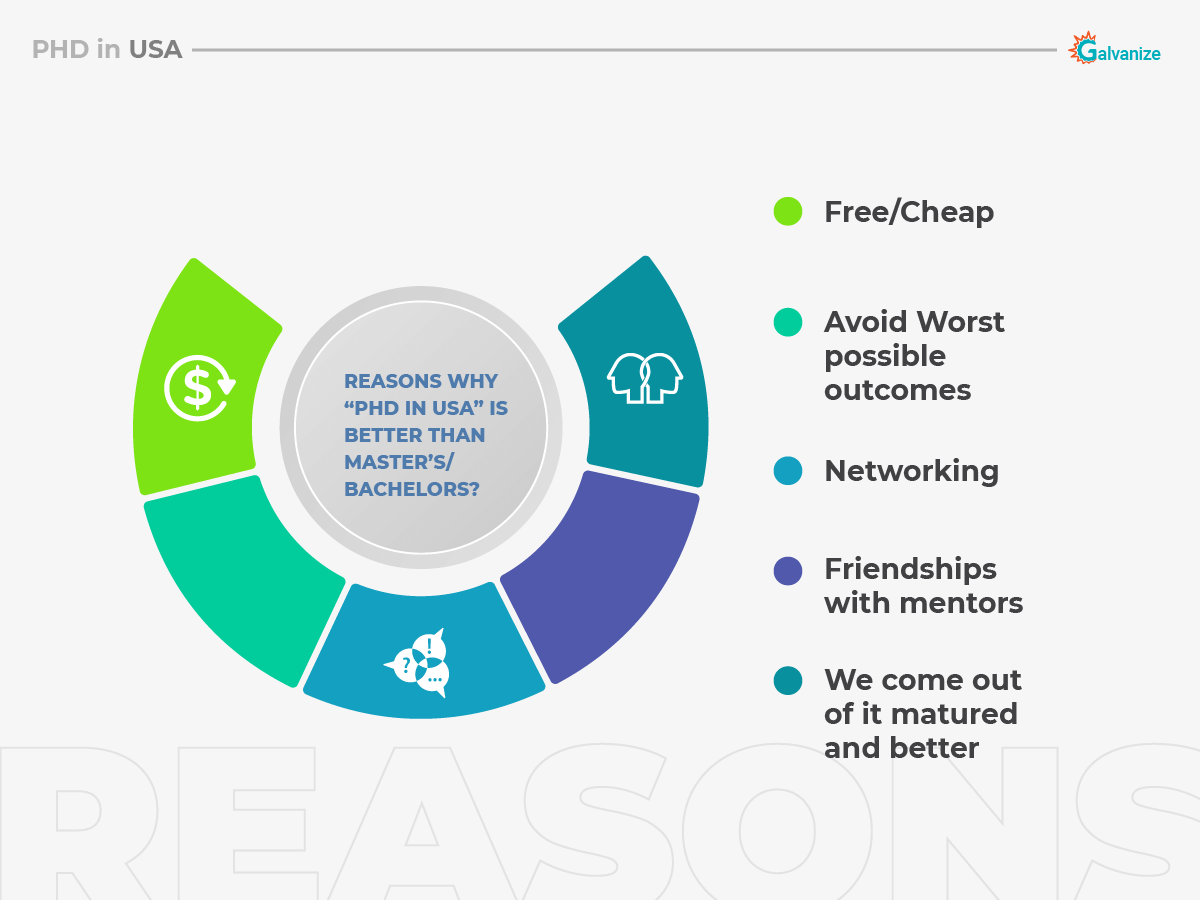
PHD is free/Cheap:
When it comes to Bachelors and Master’s, there are quite some options for us to get funding from or get scholarships. But the problem is that not a lot of students get full scholarships and they would be forced to pay the remaining tuition fees and alot of other costs that comes along while living in the USA.
We are all aware that education in the US is more on the expensive side and a lot of students find a way to pull it off with as many part time jobs as possible. But this affects their schedule and routine and drains their mental energy and consumes alot of their study time
Whereas PHD in the USA is a different story. The programs are fully funded and you even get paid to study there and there is no need to pay the tuition fee.
Fee waivers, assistantships and stipends are guaranteed in a PHD program and the stipends are quite high for PHD students in the US when compared to any other country. So for doing PHD, US can be considered the best place!
PHD saves us from the worst possible outcome:
When it comes to pursuing a degree abroad, what is the worst possible outcome that could come out of it?
We finish the degree there and yet we get shipped back to our home country with a bunch of huge educational loans and we have to find a job here with a currency that much lower in value and work hard to pay back all the educational loans
Whereas a PHD student wouldn’t have to be too scared about this fact since their educational expenses are usually taken care of via stipends and assistantships and other funding sources. And even if one doesn’t secure a job there, they could always get well paying great jobs back in India or any developing country which has so many universities.
Networking:
“ You are the average of 5 people that you hang around with the most”
Imagine getting enrolled into a good university in the US for PHD. What would be the quality of people there?
While doing your bachelor’s degree, one would be surrounded by all kinds of people from all around the world with different lifestyles and mindsets and there you could find alot of people who tend to fool around and be less focused or live by ideologies that you might totally disagree with.
Whereas when it comes to master’s degree, the quality of the crowd increases tremendously and with PHD, only the most motivated, interested and focused people get here. So you could learn and grow as a community while doing your PHD. Another important fact is, everyone doing a PHD is there by their own choice which makes them a group of highly interested and talented people with whom you would be spending most of your time with.
Friendships with Mentors:
“ PHD students are like 10 year projects”
- University Mentors
In research based universities, most of the professors tend to spend a huge amount of time with the PHD students than the ones in bachelors and master’s degree programs. Bachelors students are more focused on learning the basic concepts and master’s students are usually busy with course work and won’t stay for too long in the campus.
So, one of the biggest advantages of being a PHD student in the US is that you get to spend 4-6 years researching and further continue the work for years to come and hence the mentors and the professors would be more open to building a good relationship with you and that would make way for so much of learning and growth.
Come out of it matured and better:
One of the things that a PHD student would experience is this : They start earning money a lot later than the general population. Some would even take over 30 years to get their first paycheck and when you spend your 20s learning and researching and focusing while managing the possible financial hardships that come your way, makes you financially mature.

Pros and Cons of Studying in USA
Pros of studying in the usa .
- Education in the USA is something that many of us look out for. The quality of education in the USA is recognized worldwide as the best. They give practical learning experiences. International student enrollment for higher education is always higher in this country.
- The Association to Advance Collegiate School of business recognition is given to the best business schools in the world. Globally 531 business schools were given AACSB, and 400 schools belong to the USA.
- The USA is the home to some of the best universities globally, the top-ranked universities.
- There is a wide variety of subjects to choose from, such as marine education, nursing, ecology, etc.
- The Universities in the USA are recognized globally for their world-class education and good facilities.
- There is exposure to multiple cultures in the USA. There are also student exchange programs to diversify the learning objectives.
- They provide an all-rounder education by enabling the students to participate in sports and other extracurricular activities.
- The job opportunities are ample when you get a degree from one of the Universities in the USA. These degrees are recognized worldwide, and you can be assured of getting good employment opportunities.
- You can specialize in subjects and study according to your interests.
- The labs and libraries in the USA are excellent, and students have a significant amount of exposure to writers from different backgrounds.
- Some scholarships are designed for students. These scholarships vary from University to University and according to the type of degree you choose. Grabbing these scholarships will make it easier to manage your financial expenses
Cons of studying in the USA
- To be a student in the USA, one of the primary requirements is to write a TOEFL exam. This ensures that you have a good command of the English language.
- For other engineering and business studies, you will be required to write GRE, TOEFL, GMAT, SAT, etc. To be a doctor, you will be required to write a different set of entrance examinations.
- The cost of education and accommodation in the USA is higher when compared to your home country. Due to this, you may have to get a student loan.
- It is not that you will get a job if you study in any university in the USA. More of your knowledge and skills matter the most. But studying in the prestigious universities in the USA will be a feather on your cap!
- The standard of education will be initially hard to manage as you need to get used to the different curricula.
- The climatic conditions in the USA are very different and hence you should be able to adjust to them.
- The living expenses can also be higher. To manage this, you need to take up a part-time job.
- The testing in these universities can be rigorous and challenging, especially if you are a student of the most prestigious universities in the USA.
1.3) Is PHD the right choice for you?
Some students might be wondering if pursuing a PHD is a right thing for them.
It depends on the career you are in and if you are interested in research. For instance if you have a master’s in biology or in any of the languages or history, the jobs available for you would be scarce. So doing a PHD in such instances can open up a whole new alot of opportunities.
Now when it comes to research it can be categorized into two things : Discovering phenomenons in nature and inventing new stuff.
If research, discovery and inventions are something you desire, then PHD is the right choice for you.
Kick-start Your Admissions the right way. Start Now!
Top ph.d. programs in the usa :, ph.d. in management.
To become a scholar in business and management, you can do a Ph.D. in this field. This is a globally sought-after course. Doing a Ph.D. creates an avenue for several research work in this field
- The University of Arizona
- Walden University
- Auburn University
- Campbellsville University
Ph.D. in psychology
To conduct research in psychology, you can do a Ph.D. in this field. To complete this course may take three years or even more than that. The eligibility for this course is the completion of a master’s in psychology.
Stanford University
Yale university, university of california.
- University of Arizona
Ph.D. in Computer science
Completing a Ph.D. in this field can take up to three years or more, but it would be beneficial in your career when you’re interested in research in this field. You’ll also be a master in your particular area of research.
Harvard University
- Massachusetts University of Technology
- Carnegie Mellon University
Ph.D. in Marketing
Marketing is a broad field, and currently, it is the trending area of study as most of us use smartphones, and marketing here is unbeatable.
- University of Pennsylvania
- University of Michigan
Ph.D. in Biotechnology
This is a doctorate course in the field of Biotechnology. You get to study Scientific communication, trends in Biotechnology, and so much more. This takes three to five years to complete.
Maschasuettes institute of technology
John hopkins university, ph.d. in microbiology.
Doing a doctorate in this course means you get to research microbiology. You get to research microorganisms and other things.
This course can take around four to six years to complete.
Ph.D. in Physics
Ph.D. in Physics will get you a lot of good job opportunities. You will deal with theory, research, and experiment in this field. This will be a three-year doctorate course.
Princeton University
- University of Chicago
Ph.D. in Public Health
If you want to be an administrative head and want to have extensive knowledge in the field of medicine, you can do this doctorate course.
- Ohio State University
Ph.D. in Pharmacology
This course deals with medical drugs and their usage. You can work in clinics, hospitals, and medical centers.
- University of Washington
Ph.D. in Design
This is a creative course and can be pretty challenging. This is a practical degree program, and you have a wide range of streams to diverge in, such as animation, design, and much more.
- University of Buffalo
- Cornell University
- Kansas State University
PHD FAQ’s: Eligibility and More
2.1) intake seasons for phd programs, two teaching semester’s:.
The academic year in the USA consists of two teaching semesters:
- August-December
- January-May.
These will be when your classes and assessments take place.
Most graduate programmes admit students in the autumn (or ‘fall’) semester because of the following reasons:
- The scholarships and financial aids are aimed at this semester.
- There are not many financial aid opportunities as well as job opportunities available for the Spring semester
2.2) Duration of the PHD Program
The length of a PhD program in the USA is usually 4-6 years (full time ).
Students spend 2 years on the coursework stage of their programme and 2-4 years working on their dissertation.
The minimum and the maximum durations would vary depending on the university and the field of study but traditionally a PHD program is for 5 years and there will be a year limit within which one should potentially finish their research to get their PHD.
There are students who find a way to get their PHD in 3 years as well. So expect anywhere between 4-6 years to get your PHD
Coursework :
- Core classes (Essential )
- Elective classes (Optional )
Dissertation :
It’s the research proposal submitted as part of a PhD application.
2.3) AGE A FACTOR FOR PHD?
Is there any age limit for pursuing PHD or is it a good choice to start doing PHD after the age of 30? Would the age be a factor in getting jobs after?
Age is not any issue and there are people who start their PHDs even after the age of 40. So there are no age limits and in the United States they value the background and the profile and will not discriminate based on their age. So go for it if you really want to.
2.4) PHD AFTER BTECH?
Can we do a PHD right after bachelors or B.Tech Degree?
If one has decent research experience in Bachelors level itself and if it’s good quality research and if you have published papers and have some achievements to show, then yes, your chances of getting admissions into PHD would increase.
But it is generally recommended that we spend a little more time exploring the topic of interest in our master’s before jumping into a PHD program. Doing a master’s also strengthens your knowledge on the field which would be needed to be able to successfully complete your PHD.
But yes, it is totally possible to do your PHD right after bachelors. Even if the background of your profile doesn’t match with the PHD course you want to pursue, you can still get admissions if you can impress the professor you want to work with and these scenarios have happened in the past.
2.5) INTERNSHIPS DURING PHD:
Internships during PHD, Recommended or not?
The answer to this question would depend on the field you are in.
Here’s the logic you need to look for. PHD is a degree where you are trying to become a researcher. Internships are jobs where you “work for the company and find ways to make them money”. Sometimes these two do not add up.
For instance, if you are in the Computer and software field, it’s completely alright to work in google or facebook or in some booming startups because it would help you become better in the particular field which would help with the research.
In most fields it is generally not recommended to do internships while being a PHD student since it would take your focus away from research.
What are the requirements to do a PhD in the USA?
3.1) phd in usa - requirements:.
Universities and graduate schools will set their own admissions procedures, but for most of the universities have following requirements :
- Academic transcripts
- Research Statement
- Writing Samples
- Test Scores: General GRE And GRE Subject.
PS : Some PhD subjects may use other graduate entry tests in place of (or in addition to) the GRE. The most common tests are:
GMAT – for DBA degrees and other programmes in Business and Management
LSAT – for JD programmes
MCAT – for MD programmes
DAT – for dental programmes
You won’t necessarily need a Masters to apply for a PhD in the USA.
This is because American graduate programmes effectively combine Masters and PhD study –some students actually receive a Masters at the end of their coursework stage.
If you do already have a Masters you may be able to receive credit for it and spend less time on the coursework stage of your program. This decision is made by your graduate school , who will decide how relevant your existing degree is.
Join the Email course built by World's Top Admissions Consultants
Started your gre prep, ready to see where you stand in the gre, 3.2) how do i apply for a phd and what will be the application fee.

Application Process :
The Application process for the USA is easy and these are the following stages for same :
Step 1 : Be accepted for a PhD at an SEVP-approved institution
Step 2 : Pay the SEVIS I-901 fee of $200
Step 3 : Begin your application online
Step 4 : Schedule a visa interview
Step 5 : Receive your visa
Application and Visa Fee details :
- Typical application fees for PhD study in the USA are between $50 and $100.
You will also need to budget for the cost of any graduate entry tests and for your visa.
- In most cases you will need to pay fees of at least $360 during your visa application. This is made up of a $200 SEVIS fee and a $160 application fee. Some students may also need to pay an issuance fee.)
3.3) How to shortlist Universities for your PHD in the USA?
Which universities should one apply to for the best learning experience for the particular field and have the most chances of getting admissions into for a particular profile and work experience and research experience?
While it is hard to list out the top universities for every field out there, here’s a procedure one can follow to make sure they are in the right place:
- Select the field : Decide on which field you want to get PHD in
- List of universities : Make a list of universities in the US that is offering the particular PHD course.
- Get your CV Ready : It is very important to create a professional and detailed CV with your Work and research experience
- Now compare your profile with theirs and get a good idea of what kind of profile one would need to be a PHD student in that particular university and the level of expertise present there
Additional Information
Phd types :.
Most universities in the USA simply award the standard PhD (or Ph.D.) as an academic doctorate. However they some different categories are DBA (Doctor of Business Administration), EdD (Doctor of Education) JD (Doctor of Laws) and MD (Doctor of Medicine).
Fees and funding :
Public institutions charge an average of $12,737 per year. Private institutions charge an average of $43,300 per year.
PS .Figures are based on data published by the US National Center for Education Statistics.
Common types of assistantship include :
- Graduate teaching assistantships
- Research assistantships
- Administrative assistantships
- Fellowships
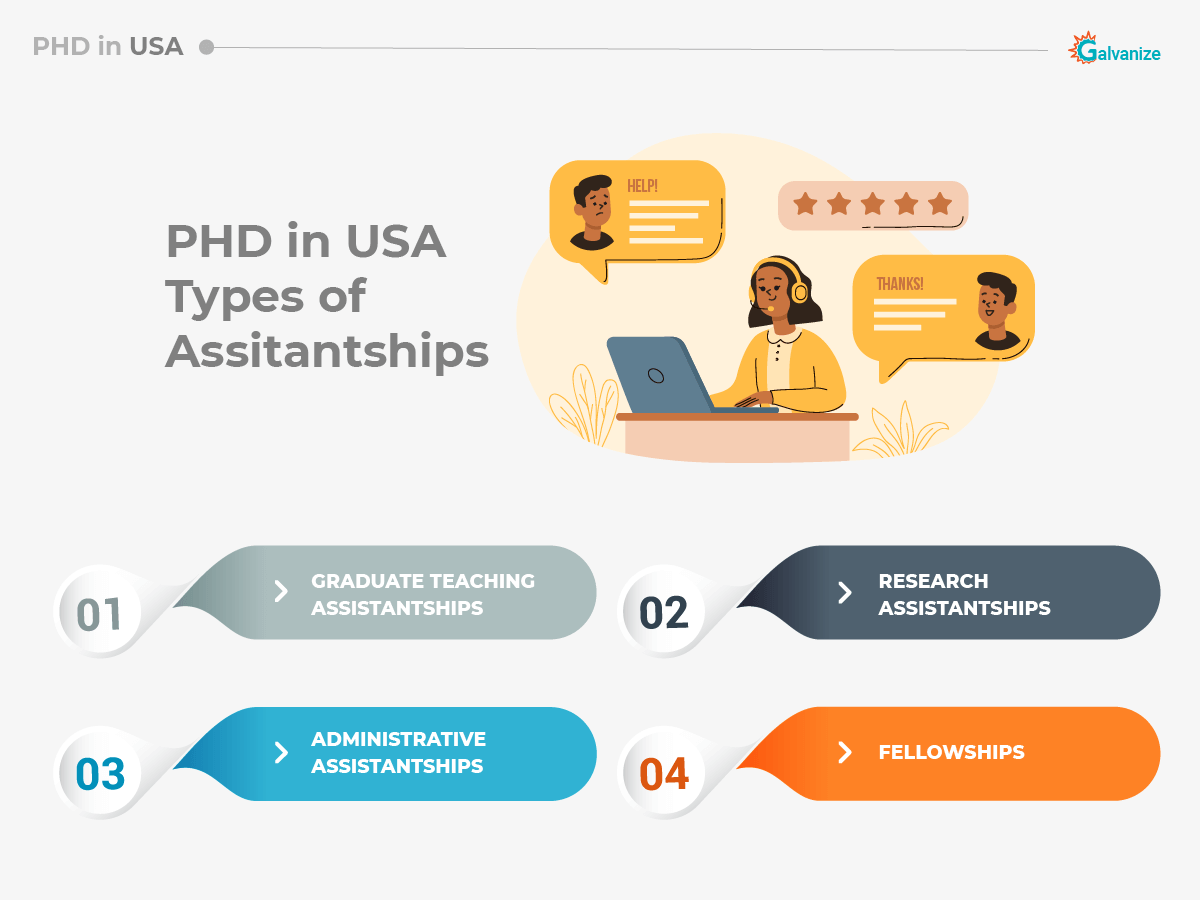
Top Universities for pursuing PHD in USA
This University was founded in 1636 and was named Harvard College. This is a highly prestigious and the oldest University in the United States. This University is located in Cambridge, Maschasuettes, a private ivy league University. It is ranked as no.5 by the QS World university rankings.
Acceptance rate: 5%
Average fee: $75,000
List of the Ph.D. courses : Math, Physics, biotechnology, and so much more.
Website : https://gsas.harvard.edu/programs-study/degree-programs
- Is it hard to get into the Harvard Ph.D. program?
The acceptance rate for a Ph.D. student is much higher in this University when compared to other degrees. With Good grades, you can get into this University.
- How long does it take to complete a Ph.D. at Harvard?
A minimum of two years is required to complete a Ph.D. Although it sometimes takes up to six years.
This is a private university that is located in Cambridge, Maschasuettes. This University has been essential in research that deals with modern technology and sciences. It is one of the top universities globally and is ranked as no 1 by the QS world rankings.
Acceptance rate: 7%
Average fee: $75,462
List of the Ph.D. courses : https://gradadmissions.mit.edu/programs/degrees/doctoral-degrees
- How long does it take to complete a Ph.D. in MIT?
It takes around five years to complete a Ph.D. at MIT.
- Is GRE required for Ph.D. in MIT?
Yes, the GRE general test is required for Ph.D. in MIT.
This is a private university that is highly prestigious and is ranked as no 3 by the QS World university rankings. This University is located in Stanford, California, and it is the largest University with a large enrollment of students.
Average fee: $78,218
List of the Ph.D. courses
https://gradadmissions.stanford.edu/applying/frequently-asked-questions
A Ph.D. in MIT takes around five to seven years to complete.
- What GPA do you need to get for a Ph.D. in MIT?
A GPA of 3.6 on a scale of 4 is required.
California Institute of Technology
This is a private university located in Pasadena, California. This University is known for its science and engineering courses and is ranked as the best academic institution in the USA. This University is ranked as no.9 in the world’s best universities.
https://www.usnews.com/best-graduate-schools/top-graduate-schools/california-institute-of-technology-110404
- How hard is it to get a Ph.D. here?
The acceptance rate here is only 6.4%; hence it can be pretty competitive.
- How long does it take to complete a Ph.D. here?
It takes around four to six years to complete a Ph.D. here.
This is one of the oldest private research universities in the USA. It was named after the philanthropist John Hopkins. This was one of the few universities to include both teaching and research. This University has produced more than 38 Nobel laureates.
Acceptance rate: 11%
Average fee: $67,667
https://www.jhu.edu/research/
- Does John Hopkins University require GRE for Ph.D.?
GRE scores are optional; however, you will require that to do a master’s degree.
- Does John Hopkins offer Ph.D. programs?
Yes, they offer Ph.D. programs.
This is a public land grant university that has over ten campuses. It is located in the state of California. This University is known for its best research activities and its numerous research centers. This University is more than a century old and was established in 1868.
Acceptance rate: 14%
Average fee: $52,000
https://graduate.universityofcalifornia.edu/admissions/
- Is it hard to get into the University of California?
Compared to the other universities, this University is not that hard to get into as they have reasonable acceptance rates.
- Does the University of California offer Ph.D. programs?
- Yes, they do offer Ph.D. programs.
This is a private ivy league research university in Princeton, New Jersey. This University was established in 1746, and it is the fourth oldest University in the USA. They also offer a lot of scholarships for international students.
Acceptance rate: 6%
Average fee: $68,044
List of the Ph.D. courses:
https://gradschool.princeton.edu/degree-options/phd
- How long does it take to complete a Ph.D. at Princeton University?
It takes around five years to complete a Ph.D. at Princeton University.
- Can I apply to two Ph.D. programs at Princeton?
No, you cannot apply to two Ph.D. programs at Princeton. You can do only one at a time.
This is a private university in New Haven, Connecticut. It is an ivy league research university as well. It is one of the most prestigious and third oldest institutes in the USA. This University is ranked as the 17th best University globally by the QS world ranking.
Average fee: $45,700
https://www.yale.edu/academics/graduate-professional-study
It takes around four years to complete a Ph.D. here.
- Can you get a Ph.D. at Yale?
Yes, you can apply for Ph.D. programs at Yale.
Columbia University
This is a private ivy league research university in New York and is the oldest University in New York. This University was established in 1754. This University is ranked as the sixth-best university in the world.
https://gsas.columbia.edu/content/phd-programs
- How hard is it to study here?
It is highly competitive, and your GRE scores should be around 154 to 167.
Duke University
This is a private research university in Durham, North Carolina. It was established in 1838 by methodists and Quakers. This University is ranked as the 23rd best global University.
Acceptance rate: 8%
Average fee: $40,000
https://gradschool.duke.edu/academics/programs-degrees
- Is Duke a top university?
Yes, it is a top university, ranked as the 9th best national University.
- How hard is it to get into Duke?
It is competitive here, and the acceptance rates are also lower.
Secure that dream admit
Right from lor, university shortlisting, sop, application reviews till visa counselling. galvanize has your back., phd experience.
For the first two years one would be required to take courses and will have to maintain a GPA over 3 -3.3.
Now remember there are various types of PHD programs available and what you experience might be a bit different from what’s described here but one can get a rough picture of what they will be up against.
The courses that you take in the first two years will mould you to become a better researcher and many of these courses would have projects which could potentially turn into a journal publication.
Selecting Dissertation Advisors:
Within the first year or the first two years, the student would have to analyze the professors, their areas of interest and expertise and their character to better select their own dissertation advisors.
In most cases we might have to select and come up with our own projects and research ideas whereas in some cases your dissertation advisor might already be working on the topic of your interest and in such cases you could join the research and contribute
Comprehensive/Qualifier Exam:
After completing the required set of courses in the first two years, the phd students are then required to take a comprehensive exam or a qualifier exam. Now the way in which this exam is conducted varies a lot based on the field and the university that’s conducting it.
In some cases, the students who fail this comprehensive exam would have to quit the PHD program. We do get to attempt this exam more than once and the number of re-attempts would also depend on the university conducting it. So this is an important step.
This exam most probably won’t be like the written 3 hour exams that we are used to writing. This exam would test your ability to be a successful researcher and the students might be given tough time intervals to complete research based tasks and even oral tasks.
Anyways reach out to the students in the university you are planning to take to get accurate details about what you would be facing in this comprehensive/Qualifier exam
Committee of professors and Proposal Defense:
In a proposal defense, the students have to be ready with the complete dissertation plans stating the papers and the projects that one has planned to work on. What kind of data one needs to collect, the kinds of analysis that one needs to do.
We also need to select a committee of professors and one of the professors in the committee should be outside your own department or university and schedule a meeting where you propose to them your project details
After the proposal defence, the professors would have to analyse if the research project is worthy for a PHD degree and if it is realistic and achievable
Once your proposal defence is approved, you would be working full time on your dissertation and would be expected to complete the research project proposed.
In many universities the PHD students are required and expected to teach subjects to B.Tech and Master’s students for a few semesters.
NOTE : Even within the same industry, different universities would have very different PHD programs where some universities would completely focus on quantitative research and some would focus more on a case study approach. So to get a clear idea, reach out to the PHD students in the university you are hoping to get admissions into.
PHD Experience FAQs
How many papers should we publish in our dissertation and is there a minimum requirement of any sort.
The number of papers that one can publish completely depends on the area of study and research since in certain areas one can publish over 10 papers easily whereas in other areas publishing 2 or 3 would be a great achievement.
There are students who just publish one paper in their dissertation and there are other who publish over 10. So it depends on your field of study and your dissertation advisors expectations and your capabilities.
How much stipend can one expect during their PHD in USA?
The stipends could vary from $10,000 or lower to over $50,000 depending on the university, the city and the cost of living in that area, the university and the area of study. Again to know exactly what to expect, reach out to PHD students in the university that you want to get into.
What kind of research assistantships and teaching assistantships can we expect to get during PHD for funding?
Research and teaching assistantships are for masters programs and by default traditional PHD programs in the US are fully funded.
The point to note here is that in many universities, the PHD student has to teach and if one doesn’t do so, their stipend would not be given. So the fact is you are already working and researching for a stipend which should be enough to live through your PHD days in the US.
LIFE AFTER PHD:
Employment opportunities after phd in usa.
Here’s what could potentially happen after you finish your PHD:
Note : This is a generic question and the answer’s vary vastly based on the area of study, area of specialization and the country you live in. Anyways here’s all the possibilities that one could face after a PHD.
POST DOC POSITION :
Post doc basically means that after getting the doctorate degree one would continue do their research potentially in a university or research setting
Basically once you go from being a PHD student to a PHD graduate, you would still get to continue the journey you started during your PHD days and having a post doc position would mean it would be fully research oriented.
Usually you could get the Post doc position in the same university that you got your PHD from. There are three types of people who use a research center in an university
- Professors
- PHD students
RESEARCH ORIENTED WORK IN THE INDUSTRY IN THE SAME AREA:
This is the dream job for any PHD student who has a love for research and publishing papers. In this job you would be researching and innovating full time publishing papers and journals and will have the funds and the space to explore and work on deeper research for the company.
JOB IN A ACADEMIC RESEARCH SETTING IN THE SAME FIELD:
With an impressive profile and a recognizable PHD from the US, there is a good chance that one could land a job in the same field that they did their PHD in. This way the work they do is directly aligned with their training
PROFESSOR JOB IN A TEACHING FOCUSED UNIVERSITY:
Becoming a professor who could also be a researcher is a hard position to get and so many PHD graduates do take professor jobs that primarily or entirely focuses on teaching
PROFESSOR JOB IN A RESEARCH UNIVERSITY:
Only 5% of PHD graduates become assistant professors in research based universities right after graduation.
The research expectations in these colleges are way higher than the smaller universities or community colleges that are focused on teaching. Here in these universities there will be less number of classes to teach so the professor could have enough time for research.
CONTRACT BASED TEACHING POSITIONS IN UNIVERSITIES:
These are positions where you would be called a visiting professor/asst.professor. These would mostly consist of teaching work and there won’t be too much expectations or needs for research.
JOB IN A NON-ACADEMIC RESEARCH SETTING IN A DIFFERENT FIELD:
It has been seen that people who have PHD’s in mathematics, statistics and so on get jobs as data scientist and similar roles where they partly use the skills they have learnt in PHD
OPPORTUNITY IN AN UNRELATED FIELD:
There are cases where people get PHD in a certain field and yet work in a completely unrelated field where there are more job opportunities
UNEMPLOYED:
It would not be true if anyone said that after PHD there is no chance of being unemployed. This does happen in some cases.
ENTREPRENEUR:
The last and yet the best option for anyone is entrepreneurship. PHD students in general are smart and work on innovation and research and invention and sometimes they start a company based on the research work they started during the PHD journey.
For instance, the tech giant google itself is a company that was started by a PHD student who dropped out of a university to eventually become a billionaire.
So, the outcome that one could expect from a PHD in US could vary vastly from being unemployed to becoming a professor, researcher and an entrepreneur
OTHER FAQs ON LIFE AFTER PHD IN USA
What is the difference between a phd career and a mba career.
The main difference is that PHD is a research based degree and MBA is a management degree. But oftentimes PHD students do take management roles in companies for their sound experience and knowledge about the subject involved.
What is the main difference between being a professor in a university and being a researcher in a lab?
Being a professor in a university means there will be alot of teaching responsibilities whereas a researcher wouldn’t have to teach. But professors do have this added advantage of having the freedom to pick the topic of interest and work on it
What should students do in their master’s to get better chances of getting into a PHD program and prepare for the transition as well?
The first thing the master’s student should do is to start making friends who are currently doing PHD and try and be a part of their research. This way one can understand if they are interested in the deep level of research that a PHD student would be doing.
Is it better to have an older dissertation professor or a younger one?
First things first, your whole PHD experience relies a lot on your dissertation professor and hence it is an important factor to consider.
Now generally students would prefer an older dissertation professor since they would have more seniority in the particular field and more experience in publishing. But if there are younger professors who are more energetic, enthusiastic and with many interesting ideas, then go with them.
Just look at that professor’s passion for research and if his personality matches with yours because having a good relationship with your advisor is the most important factor because there are cases where students even quit their university because of the bad relationships they develop with their advisors.
So it is advised that we first take courses and check if you like your professor and if you think you could potentially get along well with them and if they publish quality work.
How to deal with leaving family and mental health during your PHD in USA?
One just cannot afford to be home sick if they have big ambitions and dreams. Right? Not just about studying abroad but just about anything in life has it’s good and bad sides. We cannot avoid the bad aspect of the things in our lives
So what’s the answer? Learn to deal with it. Adapt. Shift your focus towards the mission. Grow.
Mental Health is becoming a huge issue in today’s world and the best way to deal with it is to be open and honest about everything in your life to yourself. Maintaining a journal, meditation and self help books do come in handy.
Is it okay to take our family with us during our PHD program and will the stipend be enough to get by?
In most cases the students are either already married or they get married during the course of the PHD. The stipend itself can be enough to run a family but it is recommended that you stay in an affordable neighborhood with your partner working as well so there will be less financial burden on you.
Getting admissions for MS and PHD. What are the differences in the admissions process?
When it comes to PHD, the student would have to explain why they are interested in research and where they wish to work on and for what reason and with which professor. In addition to that the aspiring student would have to sit for either multiple interviews with the professors from the particular university or a panel interview.
Whereas getting admissions for a master’s degree generally won’t require any interviews and would be as simple as stating why you wish to pursue a MS course offered by the university.
This is because master’s programs take 1-2 years whereas when it comes to PHD the professors would have to invest a lot of time in you (Around 10 years) and hence they would access what kind of person you are and if your interests and personalities match.
How do we approach professors? And is it necessary to approach professors even before getting admissions and how do we find the professors?
Any student can find the profiles of the faculty of a university on their website and they can examine their profiles for their current topics of interests and research. It is recommended that we approach professors even before admissions to look for guidance and form a bond with them if possible and the best way to approach is to reach them via email.
Written by Sai Subramaniam
Guided by Pavitra Srinivasan and the Galvanize In-house Experts
Cost of living and cost Index in USA
Related blogs.
- STEM Courses | Eligibility and Application Process
- Study in USA | Complete Guide
- GRE 101 Guide
- Study abroad VISA’s

Recommended For You

Top Universities for Computer Science in the USA
Foreign Education Loans | Educational Loan for Study Abroad (2023)
One comment.
Quite informative. I will like to know of any University in the USA that can take me o PhD student I research intrest of Infrastructure and development. I have two masters in Project Development and Implementation 2011 and Economics 2022 ( Public Private Partnership) respectively.
Leave a Reply Cancel Reply
Save my name, email, and website in this browser for the next time I comment.
© 2024 Tejate Education Private Limited | Terms of Use | Privacy Policy

- About the Hub
- Announcements
- Faculty Experts Guide
- Subscribe to the newsletter
Explore by Topic
- Arts+Culture
- Politics+Society
- Science+Technology
- Student Life
- University News
- Voices+Opinion
- About Hub at Work
- Gazette Archive
- Benefits+Perks
- Health+Well-Being
- Current Issue
- About the Magazine
- Past Issues
- Support Johns Hopkins Magazine
- Subscribe to the Magazine
You are using an outdated browser. Please upgrade your browser to improve your experience.

Credit: Will Kirk / Johns Hopkins University
Johns Hopkins graduate programs again ranked among nation's best
'u.s. news & world report' includes 38 jhu programs among the top 10 in the u.s. in its annual rankings, including no. 1 ranked programs in nursing and public health.
By Hub staff report
Johns Hopkins University has 38 graduate schools, academic programs, and specialties ranked among the top 10 in the nation, including nine with No. 1 rankings, according to the latest edition of "Best Graduate Schools" from U.S. News & World Report , published earlier today.
Two schools at Hopkins—the Bloomberg School of Public Health and the School of Nursing —earned No. 1 rankings overall, and the School of Education entered the top 10, according to U.S. News & World Report .
Portions of the publication's annual list were released today but rankings for schools of medicine and engineering were delayed and will be released at a later date.
Among the new rankings released today:
The School of Nursing's DNP program ranked No. 1 for the third year in a row. Its master's degree programs tied at No. 1, up from No. 2 last year. In gerontology, the school moved up two spots to No. 1 for primary care, and up one spot to No. 2 for acute care. In other specialty areas, the School of Nursing's doctoral programs ranked:
- Psychiatric/mental health: No. 1
- Family: No. 3 (tied)
- Leadership: No. 4 (tied)
- Nursing Anesthesia: No. 36 (tie)
Public Health
The Bloomberg School retained its longtime No. 1 overall ranking among public health programs—it has held the top spot since 1994, the year the rankings began. In specialty areas, the Bloomberg School ranked:
- Environmental Health Sciences: No. 1
- Epidemiology: No. 1
- Health Policy and Management (Public Health): No. 1
- Social and Behavioral Sciences: No. 1
- Biostatistics: No. 2
Johns Hopkins tied at No. 8 in the Education category, up from No. 13 last year. The school also tied at No. 23 in higher education administration programs.
Public Affairs
Overall, Johns Hopkins programs in public affairs tied at No. 39. In subcategories, Johns Hopkins tied at No. 6 in Health Policy and Management (Public Affairs), No. 11 in International/Global Policy and Administration, and tied at No. 35 in Public Policy Analysis.
U.S. News & World Report updates some of its rankings each year and republishes the most recent rankings in other areas. Among the republished rankings for Hopkins, which are still current:
Biological Sciences
Hopkins is tied for No. 6 overall with six top 10 specialty rankings:
- Molecular biology: No. 3 (tie)
- Cell biology: No. 4
- Neuroscience: No. 4 (tie)
- Immunology: No. 5
- Genetics, genomics, and bioinformatics: No. 6 (tie)
- Biochemistry, biophysics, and structural biology: No. 8
Biostatistics
Hopkins is ranked No. 1 (tie) for Biostatistics at the doctoral level. (Note: U.S. News & World Report also ranks biostatistics as a sub-category of public health, where Hopkins is No. 2.)
The university is tied at No. 20 in Chemistry and ranks No. 9 in the Biochemistry subcategory.
Computer Science
The university is tied for No. 24 overall and tied at No. 21 in the specialty of Artificial Intelligence.
Earth Sciences
The university is tied at No. 30 in Earth Sciences.
Johns Hopkins' program in economics is tied at No. 22.
English tied at No. 13 overall with the following specialty rankings:
- Literary criticism and theory: No. 3
- British literature: No. 10 (tie)
- American literature after 1865: No. 17
Health Care Management
The university is No. 7.
Johns Hopkins ranks No. 10 overall, with the following specialty rankings:
- African-American history: No. 3 (tie)
- Cultural history: No. 4 (tie)
- U.S. Colonial history: No. 5 (tie)
- Women's history: No. 6 (tie)
- African history: No. 7 (tie)
- European history: No. 7 (tie)
- Modern U.S. history: No. 16 (tie)
Mathematics
Johns Hopkins is tied at No. 20 in Mathematics with the following specialty rankings: + Analysis: No. 18 (tie) + Algebra: No. 23 (tie) + Applied Math: No. 25
Overall, the university is tied at No. 13 with the following specialty rankings: + Living Systems: No. 5 (tie) + Cosmology: No. 7 + Condensed Matter: No. 13 (tie)
Political science
Overall, political science is tied at No. 41. In sub-categories, Johns Hopkins ranked: + Political theory: No. 8 (tie) + International politics: No. 24 (tie)
The university's graduate program in psychology is tied at No. 12 overall and tied at No. 5 in the subcategory of behavioral neuroscience.
Overall, sociology is tied at No. 29. The sub-category of sociology of population is tied at No. 17.
Posted in University News
Tagged u.s. news and world report , university rankings
Related Content

Engineering online programs again ranked among nation's best

Hopkins No. 9 in 'U.S. News' rankings
You might also like, news network.
- Johns Hopkins Magazine
- Get Email Updates
- Submit an Announcement
- Submit an Event
- Privacy Statement
- Accessibility
Discover JHU
- About the University
- Schools & Divisions
- Academic Programs
- Plan a Visit
- my.JohnsHopkins.edu
- © 2024 Johns Hopkins University . All rights reserved.
- University Communications
- 3910 Keswick Rd., Suite N2600, Baltimore, MD
- X Facebook LinkedIn YouTube Instagram
The Heller School Recognized as a Top 10 Graduate School
U.S. News & World Report ranks Heller #9 for social policy, and #13 for health policy and management: “Brandeis University graduate program earned ‘Best’ status as a result of its high ranking”
April 09, 2024
For its 2025 rankings, U.S. News & World Report ranked the Heller School for Social Policy and Management among the top public affairs graduate schools in two specialty categories: social policy (where Heller has been top-ranked for over a decade) and health policy and management.
This year, Heller rose from #14 to #9 for social policy , ranking in the prestigious top 10 of its category, and ranked #13 for health policy and management .
Social policy and health policy and management are specialty areas within the public affairs category, where Heller ranks in the top 21% of graduate schools in the U.S. U.S. News & World Report rankings are based on a survey of deans, directors, and department chairs at 271 graduate schools of public affairs across the country.
“Heller’s legacy is one of innovation and dedication to making the world a more equitable place. As we continue to make profound contributions to the fields of social policy and health policy and management, we are cognizant of the changes that need to be made and how we can make them,” says Interim Dean Maria Madison . “Every day, our faculty and researchers commit themselves to improving health care access, promoting racial and economic equity, and advocating for improvements in disability rights, child poverty, and workforce and labor market conditions. It’s an honor to be recognized by our peer institutions for these efforts that impact meaningful change in our world.”
Led by the motto “knowledge advancing social justice,” Heller is a nationally-recognized research and educational institution at Brandeis University. The school, celebrating its 65th anniversary year in 2024, has expanded from a single doctoral program to include several master’s degrees spanning global and domestic social policy. Heller is also home to nine research centers and institutes renowned for conducting applied interdisciplinary research and active public engagement.
- Skip to navigation
- Skip to content
- UMB Shuttle

University of Maryland, Baltimore
About UMB History, highlights, administration, news, fast facts
- Accountability and Compliance
- Administration and Finance
- Center for Information Technology Services
- Communications and Public Affairs
- Community Engagement
- Equity, Diversity, and Inclusion
- External Relations
- Government Affairs
- Philanthropy
- Office of the President
- Office of the Provost
- Research and Development
- University Counsel
- Administrative Officers
- Boards of Visitors
- Faculty Senate
- Staff Senate
- Center for Health and Homeland Security
- Council for the Arts & Culture
- Interprofessional Education
- Leaders in Education: Academy of Presidential Scholars
- Middle States Self-Study
- President's Council for Women
- President's Symposium and White Paper Project
- For the Media
- Steering Committee Roster
- Logistics Committee Roster
- UMB Police and Public Safety
- Graduation Celebration 2024
- Founders Week
- UMB Holiday Craft Fair
Academics Schools, policies, registration, educational technology
- School of Dentistry
- Graduate School
- School of Medicine
- School of Nursing
- School of Pharmacy
- School of Social Work
- Carey School of Law
- Health Sciences and Human Services Library
- Thurgood Marshall Law Library
Admissions Admissions at UMB are managed by individual schools.
- Carey School of Law Admissions
- Graduate School Admissions
- School of Dentistry Admissions
- School of Medicine Admissions
- School of Nursing Admissions
- School of Pharmacy Admissions
- School of Social Work Admissions
- Tuition and Fees by School
- Student Insurance
- Academic Calendar
- Financial Assistance for Prospective Students
- Financial Assistance for Current Students
- Financial Assistance for Graduating Students
Research Offices, contracts, investigators, UMB research profile
- Organized Research Centers and Institutes
- UMB Institute for Clinical & Translational Research
- Sponsored Programs Administration
- Sponsored Projects Accounting and Compliance (SPAC)
- Kuali Research
- Clinical Trials and Corporate Contracts
- CICERO Log-in
- Conflict of Interest
- Human Research Protections
- Environmental Health and Safety
- Export Compliance
- Effort Reporting
- Research Policies and Procedures
- Center for Innovative Biomedical Resources
- Baltimore Life Science Discovery Accelerator (UM-BILD)
- Find Funding
- File an Invention Disclosure
- Global Learning for Health Equity Network
- Manage Your Grant
- Research Computing
- UM Research HARBOR
- Center for Violence Prevention
- Office of Research and Development
- Center for Clinical Trials and Corporate Contracts
- Technology Transfer/UM Ventures
- Contact Research and Development
Services For students, faculty, and staff, international and on-campus
- Student Health Resources
- Educational Support and Disability Services
- Writing Center
- URecFit and Wellness
- Intercultural Leadership and Engagement
- Educational Technology
- Student Counseling Center
- UMB Scholars for Recovery
- UMB Student Affairs
- Human Resource Services
- Travel Services
- Strategic Sourcing and Acquisition Services
- Office of the Controller
- Office of the Ombuds
- Employee Assistance Program (EAP)
- Workplace Mediation Service
- Faculty Center for Teaching and Learning
- UMB Travel: Start Here
- International Students, Scholars, and Employees
- Center for Global Engagement
- International Travel SOS
- International Operations
- Parking and Transportation Services
- UMB shuttle
- SMC Campus Center Event Services
- Donaldson Brown Riverfront Event Center
- All-Gender Bathrooms
- Environmental Services
- Interprofessional Program for Academic Community Engagement
University Life Alerts, housing, dining, calendar, libraries, and recreation
- Emergency Reference Guide
- Campus Life Weekly with USGA
- Starting a New Universitywide Organization
- University Student Government Association
- Planned Closures
- Intramural Sports
- Safety Education
- About URecFit and Wellness
- How to Get Your One Card
- One Card Uses
- Lost One Card
- One Card Policies
- Photo Services
- One Card Forms
- One Card FAQs
- Office Hours and Directions
Give to UMB Sustain excellence and meet UMB's educational needs for today and tomorrow.

Thank You for Your Gift to UMB
The University of Maryland, Baltimore (UMB) is excited to share its new online giving page.
With enhanced searchability, a streamlined checkout process, and new ways to give such as Venmo, PayPal, Apple Pay, and Google Pay in addition to credit card, donors can support UMB quickly and securely.
- Ways to Give
- Where to Give
- Staying Connected: You and UMB
- The UMB Foundation
- Office of Philanthropy
- Maryland Charity Campaign

- Archived News
Search UMB News:
There are no reported emergencies on campus at this time. Sign up for UMB Alerts.
Nursing Rises in ‘U.S. News’ Best Graduate Schools Rankings
April 9, 2024 | By Mary Therese Phelan
Continuing its mission of shaping the nursing profession and the health care environment by developing leaders in education, research, and practice, the University of Maryland School of Nursing (UMSON) has again ranked in the top 10 across the board for public schools of nursing — and moved up in all six categories in which the school is ranked — in the newly released 2024 edition of U.S. News & World Report ’s “ America’s Best Graduate Schools ,” out of 651 accredited nursing schools surveyed.
Both UMSON’s Doctor of Nursing Practice (DNP) and its Master of Science in Nursing (MSN) programs climbed in the rankings among all schools surveyed, with DNP tied at No. 8 (up from No. 15 last year) and MSN at No. 20 overall (up from No. 25 last year). Among public schools of nursing, the DNP program is tied at No. 4 and the MSN is ranked No. 9.
Two UMSON specialties lead the way in the rankings, both ranked No. 1 (tied) nationwide among public schools of nursing:
- The DNP Adult-Gerontology Primary Care Nurse Practitioner specialty, tied at No. 4 among all ranked schools
- The MSN Health Services Leadership and Management specialty, No. 2 among all ranked schools
UMSON also is ranked in the top 10 among public schools of nursing for its:
- Family Nurse Practitioner Doctor of Nursing Practice specialty (No. 3)
- DNP Nurse Anesthesia specialty (No. 7, tied)
“It is gratifying to continue to be recognized nationally for our Doctor of Nursing Practice program and our Master of Science in Nursing program,” said Yolanda Ogbolu, PhD, NNP, FNAP, FAAN , the Bill and Joanne Conway Dean of the University of Maryland School of Nursing. “The School of Nursing plays a vital role in our collective efforts in Maryland and nationally to increase the number of nurses with advanced education, particularly at the doctoral level. It is essential that we have nurses who are well prepared to meet the changing needs of patients, their families, and our communities at a time when we face increasing complexity in our health care system, growing diversity in our population, and persistent gaps in access to needed care.”
The U.S. News & World Report rankings are based on a variety of indicators, including student selectivity and program size, faculty resources, and research activity, and on survey data from deans of schools of nursing that are accredited by the Commission on Collegiate Nursing Education or the Accreditation Commission for Education in Nursing.
In fall 2023 and early 2024, U.S. News surveyed 651 nursing schools with master’s or doctoral programs. In total, 292 nursing programs responded to the survey. Of those, 216 provided enough data to be included in the rankings of nursing master’s programs and 188 provided enough data to be eligible for inclusion in the ranking of DNP programs. Many institutions were ranked in both, using overlapping data.
The University of Maryland, Baltimore is the founding campus of the University System of Maryland. 620 W. Lexington St., Baltimore, MD 21201 | 410-706-3100 © 2023-2024 University of Maryland, Baltimore. All rights reserved.

School of Business graduate program surges in top rankings
A U.S. News & World Report methodology change rewards schools for job placement, graduate earnings
The UC Riverside School of Business increased 20 positions in a U.S. News & World Report 2024 graduate school ranking released this week. UCR’s business school was the benefactor of a methodology change this year that places greater emphasis on post-graduation earnings and how quickly graduates found jobs.
The School of Business’ Master of Business Administration program ranked No. 90 on the business school list, released Tuesday, April 9. Though 506 accredited institutions were canvassed, only 124 U.S. graduate-level business programs provided sufficient information on post-graduation earnings and job placements to merit inclusion on the U.S. News list.
“The school’s ascent in the rankings is a testament to its strategic initiatives, such as the expansion of its facilities and the enhancement of its academic offerings, which align with the evolving demands of the global business landscape,” said Rami Zwick, associate dean of graduate programs for the School of Business.
The rankings released this week are based in part on reputational surveys sent to more than 15,000 academics and industry professionals, including corporate recruiters. In the surveys, deans, program directors, and senior faculty are asked to judge the academic quality of a program.
In addition to the surveys, scoring factors selectivity — gauged by graduate exam test scores; undergraduate GPA, and acceptance rate. About half of the score is based on a change this year that places greater emphasis on earnings — assessing post-graduate salaries by profession — and successful job placement. The revised job placement metric rewards business schools when their graduates get jobs quickly — either when they graduate or within three months of graduation.
Separately, the business school’s part-time MBA program was ranked No. 73, an increase of three positions from the past year. That ranking was among 269 universities.
In fall 2024, the School of Business will mark the 55th anniversary of its founding and the 30th anniversary of the A. Gary Anderson School of Management with the opening of a new 63,400-square-foot academic building .
UCR’s School of Education was ranked No. 86 out of 237 positions in the graduate school rankings, which considered only doctoral-level education programs. Last year, the school ranked No. 80.
The education rank is based on research expenditures; assessments by education-school and graduate-school deans and by professionals including recruiters and school superintendents; total degrees awarded; student-faculty ratio; faculty awards; and selectivity, measured by acceptance rates.
U.S. News this week postponed publication of its rankings for medical and graduate engineering programs after some universities questioned the rankings methodology for those programs.
U.S. News & World Report, the standard-bearer among college rankings, publishes its anticipated undergraduate rankings every fall. In the most recent rankings, released in fall 2023, UCR climbed 13 positions to No. 76 overall among U.S. private and public universities. UCR was ranked No. 2 nationally in social mobility, which considers the degree to which a university elevates its graduates to a higher standard of living.
Media Contacts
Related articles.

Have career goals. Will travel.
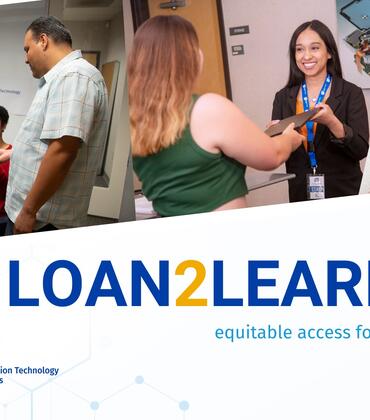
Creating Digital Equity for UCR Students
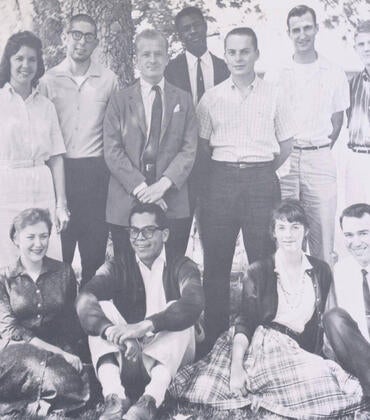
Linking Generations of Highlanders

$5 million grant supports community service by UCR students
UNC-Chapel Hill graduate programs ranked among best in nation
U.S. News & World Report’s 2024 “Best Graduate Schools” list named multiple Carolina graduate degree programs in the top 10, including UNC Eshelman School of Pharmacy at No. 1.
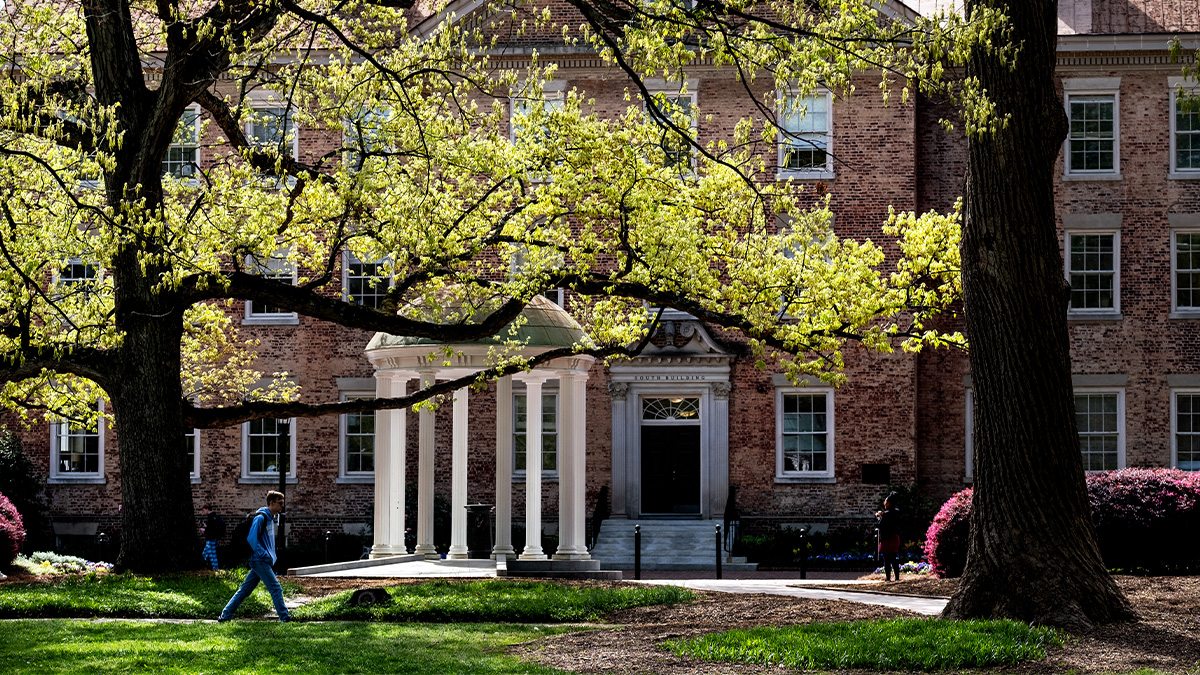
Numerous UNC-Chapel Hill graduate programs received high rankings – 20 were among the top 10 in the nation in their respective categories – as part of U.S. News & World Report’s “Best Graduate Schools” list.
For the third time in a row (2016, 2020 and 2024), UNC Eshelman School of Pharmacy is the top pharmacy school in the U.S. The rankings are based on a survey of peers from accredited pharmacy schools across the country and are published every four years.
The Gillings School of Global Public Health was ranked second out of 213 schools and programs of public health in the U.S. for the seventh consecutive rankings period. The Gillings School has also maintained its position as the top public school of public health and has been ranked among the top schools and programs of public health by U.S. News since the magazine first ranked public health schools in 1987. U.S. News & World Report does not rank all graduate programs each year.
“Carolina’s graduate programs are exceptional, and it’s no surprise that our schools are ranked so highly among peer institutions by U.S. News and World Report, as well as other measures,” said UNC-Chapel Hill Interim Chancellor Lee H. Roberts. “Carolina is always proud to be recognized for our dedication to a world-class education. Every one of our graduate programs contributes to making us the leading public research university.”
Altogether, 23 programs increased their rankings, including multiple programs in the Gillings School of Global Public Health, School of Nursing, School of Education, Kenan-Flagler Business School and UNC School of Law.
“These rankings represent the hard work of our faculty, staff and students who are dedicated to moving Carolina forward through their incredible efforts each day,” said UNC-Chapel Hill Provost Chris Clemens. “It is gratifying to see this public recognition of their commitment to the mission of our graduate programs in research, teaching and public service. Even more than in the rankings, the proof of their work is the quality of our students and our passionate alumni who lead in so many fields.”
The School of Social Work moved up three spots in the latest rankings to a tie for fourth overall and is tied for second among public universities.
This year marks the first time since U.S. News & World Report began ranking law schools in 1987 that UNC School of Law has reached No. 20 out of 196 law schools. The UNC School of Law is also the seventh-ranked public law school.
Additional UNC-Chapel Hill rankings for 2024 follow.
Please note: Not all graduate programs are ranked by U.S. News & World Report every year. For a complete list of rankings for UNC-Chapel Hill, visit the U.S. News & World Report website .
UNC Eshelman School of Pharmacy
Gillings school of global public health.
- First public, second overall
Specialty Areas
- Health Behavior, second
- Biostatistics, third
- Epidemiology, third
- Health Policy and Management, fourth
- Environmental Health Science, eighth
School of Social Work
- Tied for fourth
School of Nursing
- Nursing Schools, Master’s Programs, tied for eighth
- Nursing Schools – DNP Programs, tied for 17th
- Nursing Master’s, Administration/Management, fourth
- Nursing Master’s, Nurse Practitioner: Psychiatric/Mental Health, fourth
- Nursing Master’s, Nurse Practitioner: Family, tied for sixth
- Nursing DNP, Psychiatric/Mental Health, third
- Nursing DNP, Family, tied for sixth
UNC Kenan-Flagler Business School
- Tied for 20th
- Real Estate, ninth
- Accounting, tied for 13th
- Executive MBA, 14th
- Management, 16th
- Production Operations, 16th
- Finance, 20th
- Marketing, tied for 25th
UNC School of Education
- Tied for 25th
- Special Education, tied for 13th
- Elementary Teacher Education, tied for 14th
- Educational Psychology, tied for 15th
- Education Policy, tied for 16th
- Secondary Teacher Education, tied for 17th
- Educational Administration, tied for 17th
- Curriculum and Instruction, tied for 22nd
College of Arts and Sciences
Computer science.
- Overall, 27th
Public Affairs
- Overall, 39th (Master of Public Policy)
As part of the public affairs category, U.S. News and World Report ranked Carolina programs and specialty areas based in the School of Government and the College of Arts and Sciences’ department of public policy.
School of Government
- Public Affairs, 23rd (Master of Public Administration)
- Local Government Management, second
- Leadership, 10th
- Public Finance, 18th
UNC School of Law
- Legal Writing, tied for 20th
- Criminal Law, tied for 20th
- Tax Law, tied for 20th
- Business/Corporate Law, tied for 22nd
- Clinical Training, tied for 23rd
- Contracts/Commercial Law, 23rd
- Health Care Law, tied for 28th
- Constitutional Law, tied for 29th
- Environmental Law, tied for 45th
- International Law, tied for 52nd
- Intellectual Property Law, tied for 53rd
- Trial Advocacy, tied for 118th
UNC School of Medicine (additional Rankings will be available at a later date)
- Audiology, tied for third
- Occupational Therapy, fifth
- Physical Therapy, 11th
- Speech Language Pathology, 12th
School of Education students networked in Raleigh with representatives from 11 state agencies.
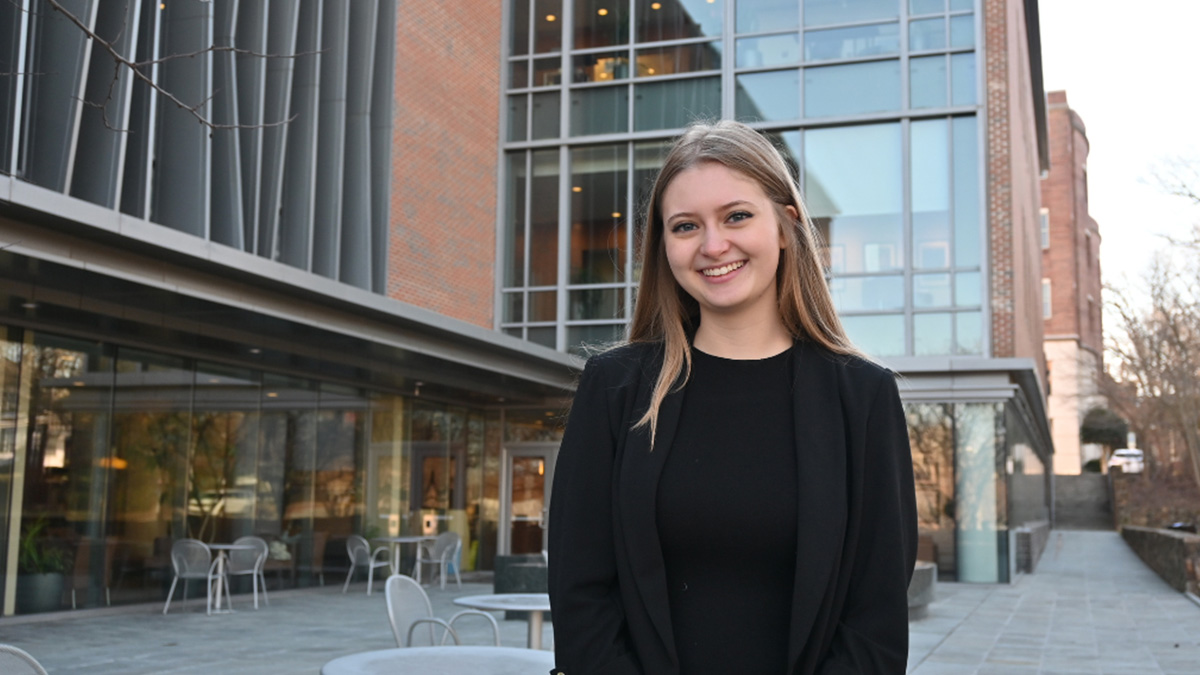
Global studies scholar aspires to diplomacy
After earning a master’s degree, Kat Goodpaster became assistant director of Carolina’s Russian Flagship Program.
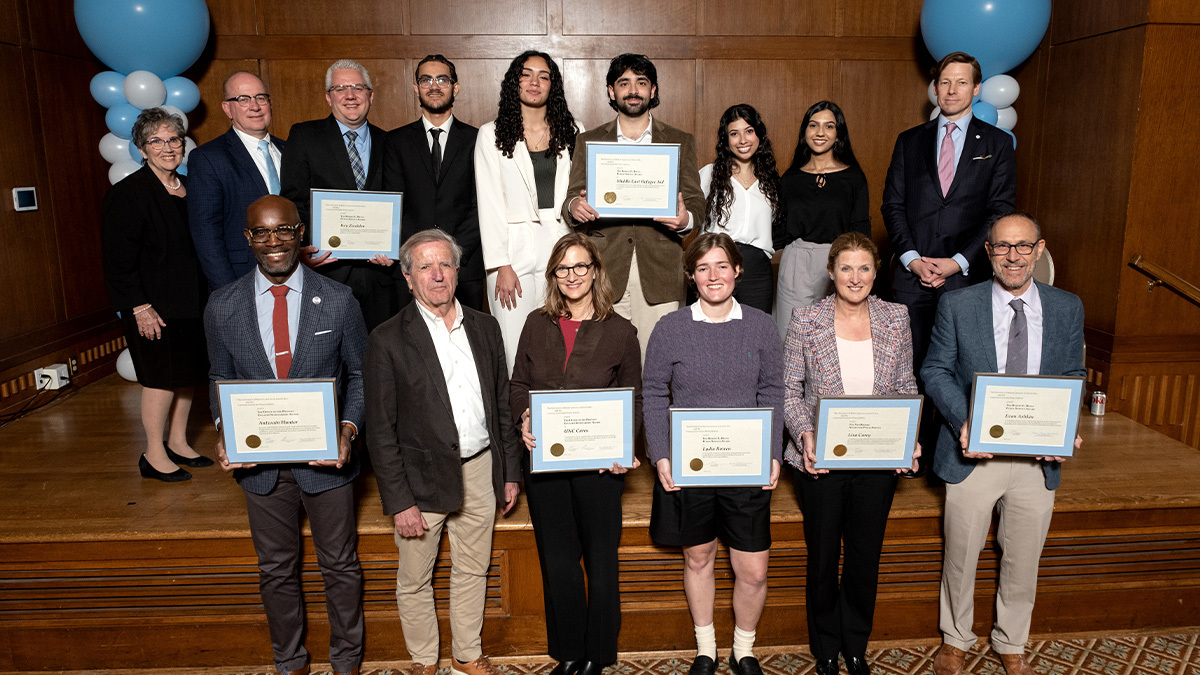
Public Service Awards go to 7 people, 2 groups
The Carolina Center for Public Service honored work on health disparities, refugee aid and more.

Broadway writer brings new comedy to PlayMakers
Fresh off the debut of her musical adaptation of “The Notebook,” Bekah Brunstetter ’04 will debut “The Game” in Chapel Hill.

Arts Everywhere Day set for April 12
The eighth annual campus-wide event celebrates artists creating in all mediums.
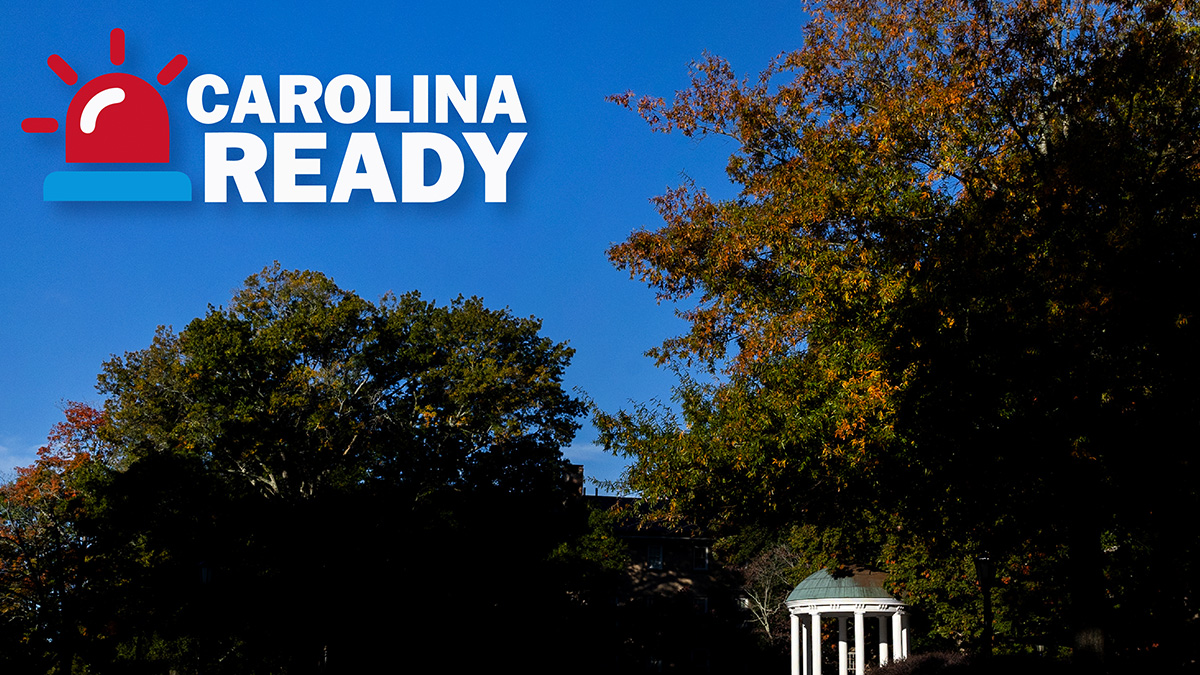
Are you ready to run, hide and fight/defend?
Active Shooter and Critical Incident Response training customizes emergency preparedness to your workspace.

Brandwein’s Bagels offers authentic NYC flavor
MBA graduate Alex Brandwein turned his love of New York-style bagels into a local business.
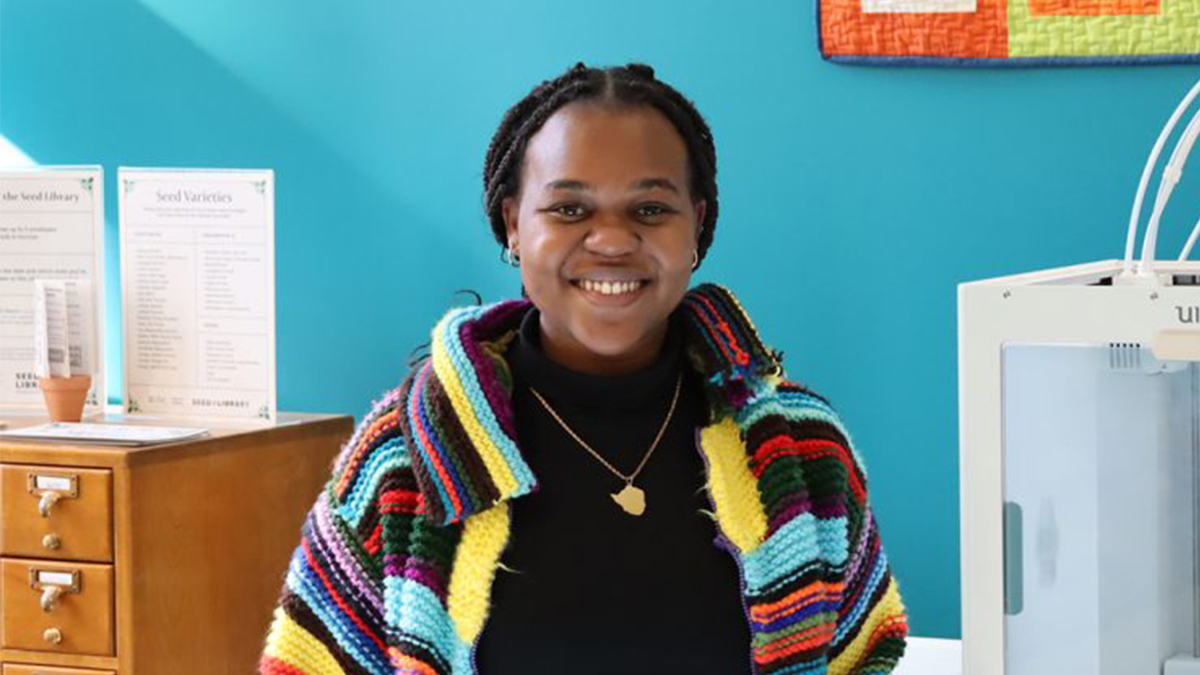
Bernice Meja has a passion for fixing broken systems
The discovery led her to a master’s program at the School of Information and Library Science.
Share on Mastodon
Communication Sciences and Disorders
Us news & world report ranks iowa audiology, speech-language pathology among the top in the nation.
Two UIowa programs in the Department of Communication Sciences and Disorders (CSD) are once again recognized among the best in their field according to the U.S. News & World Report Best Graduate Schools rankings for 2024 .
Iowa’s audiology program is again ranked second best in the nation and remains the top public institution training audiologists. The speech-language pathology program climbed in the rankings to fifth and is now the third-ranked public institution. CSD is housed in the College of Liberal Arts and Sciences.
New rankings of nation-wide Audiology and Speech-Language Pathology graduate programs is available on the USNWR website.
“We are focused on training outstanding audiologists and speech-language pathologists,” said Eric Hunter , DEO and Harriet B. and Harold S. Brady Chair in Liberal Arts and Sciences. “These rankings recognize the daily efforts of our remarkable faculty and staff, who consistently strive to provide exceptional education to our students.”
“Together, we are shaping the future of audiology and speech-language pathology, and we will continue to lead the way in delivering excellence,” Hunter added.
Hunter, who has been at Iowa since August 2023 and is a nationally recognized expert in the field, was the first hire under the University of Iowa’s Transformational Faculty Hiring Program, which is aimed at attracting world-class faculty to strategic programs and areas of excellence. He received a PhD from Iowa’s Department of Communication Sciences and Disorders program in 2001.
Iowa has long been a leader in communication sciences and disorders dating back to 1897, when the university, led by Carl Seashore’s pioneering work, developed speech pathology as a discipline of study.
“CLAS is proud of our faculty and staff who continue to guide this storied program into the future,” said Dean Sara Sanders. “Because of their tremendous talent and dedication to their research and teaching, CSD continues to be at the forefront of audiology and speech-language pathology.”
The university, college, and department continue to lead, ensuring students access to unparalleled opportunities. Construction has started on a new $249 million building that will provide a state-of-the-art learning space for Iowa students studying in the Department of Communication Sciences and Disorders, Department of Health and Human Physiology, and the Carver College of Medicine’s Department of Physical Therapy and Rehabilitation Science.
Substantial completion of the building is anticipated in 2025.
NOTICE: The University of Iowa Center for Advancement is an operational name for the State University of Iowa Foundation, an independent, Iowa nonprofit corporation organized as a 501(c)(3) tax-exempt, publicly supported charitable entity working to advance the University of Iowa. Please review its full disclosure statement.

IMAGES
VIDEO
COMMENTS
As a PhD supervisor, a teacher can guide a maximum of 8 to 10 PhD students and 5 M.Phil students at a time. Criteria to become a PhD supervisor or guide in India, USA or UK: A PhD degree from a reputed university 5 to 7 years of postgraduate teaching experience or at least 10 years of undergraduate teaching experience. Broad research experience
PHD2 is telescope guiding software that simplifies the process of tracking a guide star, letting you concentrate on other aspects of deep-sky imaging or spectroscopy. Easy-to-use, "push here dummy" guiding for beginners. Sophisticated guiding and analysis tools for experienced users. Extensive support for commonly-used equipment.
Standard PhD requirements in the UK are a Bachelors degree with at least an upper second class honours degree (2.1). You may also need a Masters degree with a Merit or Distinction grade. All your previous qualifications must be in a field of study relevant to the PhD you are applying for. Typically, Arts and Humanities PhDs are more likely to ...
Once you've been admitted to a PhD program, the true adventure commences. Here's what you can expect during your doctoral expedition: 2. Choose Your Field of Study. The initial and pivotal step is selecting your field of study. Your choice should reflect your passions, interests, and long-term career aspirations.
A Ph.D. is a research degree that involves the production of original knowledge and scholarship. Doctoral degrees have traditionally been regarded as training programs for academics. As such, a Ph.D. program differs from undergraduate or Master's studies. Most Ph.D. programs involve some initial coursework (specific requirements for ...
The entry requirements for STEM disciplines can differ significantly, depending on the specific program, institution, and country of study; this guide explains these requirements. Key Takeaways. Diverse Entry Requirements: PhD entry requirements can vary significantly based on the specific STEM programme, and the country or institution in question.
6. Think about your research environment. We could have called this step 'choose the right university' but what really makes a university a good choice for a PhD is the environment it provides for doctoral research in your field. You can get some sense of this from traditional measurements of university 'quality'.
The seven UK Research Councils provide government studentships for PhD research in different subject areas. Our simple guide explains how this funding works, what you can get and how to apply successfully. You may be able to get a PhD loan of up to £27,892 for a UK doctorate.
The hallmark of a Ph.D. program is that it is research-based. Success at the undergraduate level is an important factor, but a better indication of success is research experience. The strongest letter of recommendation is from a professor who knows you not just as a student in their classroom, but as a researcher.
PhD aspirants handbook. 8 Easy Steps on How to Apply for a PhD Step 1: Choosing Your Research Area 1. Explore Subjects 2. Previous Qualifications 3. Think About Departments Step 2: Deciding Which Type of PhD You Want 1. Predesigned Projects 2. Self-Proposed Projects Step 3: Drafting a Research Proposal 1.
In general, however, the typical annual tuition fee for a PhD in the US is between $12,000 and $45,000 per academic year. As with any doctoral degree, additional costs may include travel for collaborations, bench fees, accommodation and living expenses. A PhD in USA takes 5-6 years, costs between $12-45k per year and has a different structure ...
Step 1 - Before selecting a PhD program, it is important to identify your research interests. Step 2 - Once you have identified your research interests, you can start researching potential PhD programs. Step 3 - When researching PhD programs, it is important to consider their admission requirements.
1. PhD course length. The total length of a PhD in the USA is between 4-8 years for full-time students and 8-10 years for part-time students, depending on your field of study. PhDs can be completed in 4-5 years for students with a masters degree in an appropriate subject. Students typically dedicate 1-4 years on coursework, followed by 2-4 ...
A PhD scholar will have to earn a minimum of 12 credits which should include a course in "research. and publication ethics". As per the latest UGC regulations, a PhD candidate will have to appear before a research advisory committee to make a presentation and submit a brief report on the progress for evaluation every semester.
The eligibility criteria for pursuing a PhD may vary depending on the country, institution, and field of study. Generally, a master's degree in a relevant field is required as the minimum educational qualification. Some PhD programs may also accept exceptional candidates with a bachelor's degree, particularly for direct-entry PhD programs.
Guide to Applying for Graduate School. Guide to Applying for Graduate School. The process of preparing for and applying to a PhD program can be overwhelming. The University of Pennsylvania has created this webpage to help prospective PhD students think through the process so you can put together a strong application. Why Get a PhD?
International students who are accepted into a PhD program in the USA will typically need to obtain an F-1 student visa. To begin the visa application process, students will need to provide proof of acceptance into a program, typically in the form of an acceptance letter from the university. In addition, students will need to demonstrate proof ...
Gain valuable insight from our collection of exclusive interviews with both current and past PhD students. Learn from their best advice, personal challenges and career path after completing their doctorate. Considering a PhD or already doing one? We explain everything you need to know about PhDs, from where to find one, what they involve and ...
Satisfactorily complete a minimum of 75 points of graduate credit, as indicated on the Program Plan (some programs exceed this minimum). • Fulfill the foreign language requirement, if applicable. • Pass your Program's Certification Examination and complete all program requirements for the Master of Philosophy degree.
The required minimum qualification for admission to a Ph.D Program shall normally be a two years Master's OR M.Phil Degree from any accredited Indian or Foreign University in the relevant field. She/he must have obtained 55% marks or Equivalent Grade in the Master's or M.Phil Degree (applicable for all PhD programs except in Engineering and ...
parent organization. Co-guide should have Ph.D. qualification or should have equivalent research contribution with M.E/M.Tech. qualification P.9 Change-of guide/Addition of Co-Guide The Research scholar may request the Chairman, Senate, for a change of his/her Guide or add a Co-Guide for valid reasons. The Chairman of the Doctoral
New Delhi, 16 November 2022, UGC New Guidelines - The University Grants Commission (UGC) has issued new eligibility criteria and made amendments to the existing regulations for PhD (Doctor of Philosophy) degrees. As per the recent guidelines, candidates must secure 75% marks in a four-year undergraduate program and if they fail to do so, they have to apply for the master's programme and ...
The graduate program in economics has a strong quantitative and analytical orientation. It is designed to provide a working knowledge of basic research skills and to broaden the students' understanding of economic institutions. Degree Requirements. To be awarded a Ph.D. degree in Economics a student must:
Application Process : The Application process for the USA is easy and these are the following stages for same : Step 1 : Be accepted for a PhD at an SEVP-approved institution. Step 2 : Pay the SEVIS I-901 fee of $200. Step 3 : Begin your application online.
Johns Hopkins University has 38 graduate schools, academic programs, and specialties ranked among the top 10 in the nation, including nine with No. 1 rankings, according to the latest edition of "Best Graduate Schools" from U.S. News & World Report, published earlier today.. Two schools at Hopkins—the Bloomberg School of Public Health and the School of Nursing—earned No. 1 rankings overall ...
For its 2025 rankings, U.S. News & World Report ranked the Heller School for Social Policy and Management among the top public affairs graduate schools in two specialty categories: social policy (where Heller has been top-ranked for over a decade) and health policy and management. This year, Heller rose from #14 to #9 for social policy, ranking in the prestigious top 10 of its category, and ...
Both UMSON's Doctor of Nursing Practice (DNP) and its Master of Science in Nursing (MSN) programs climbed in the rankings among all schools surveyed, with DNP tied at No. 8 (up from No. 15 last year) and MSN at No. 20 overall (up from No. 25 last year). Among public schools of nursing, the DNP program is tied at No. 4 and the MSN is ranked No. 9. ...
The revised job placement metric rewards business schools when their graduates get jobs quickly — either when they graduate or within three months of graduation. Separately, the business school's part-time MBA program was ranked No. 73, an increase of three positions from the past year. That ranking was among 269 universities.
U.S. News & World Report does not rank all graduate programs each year. "Carolina's graduate programs are exceptional, and it's no surprise that our schools are ranked so highly among peer institutions by U.S. News and World Report, as well as other measures," said UNC-Chapel Hill Interim Chancellor Lee H. Roberts.
He received a PhD from Iowa's Department of Communication Sciences and Disorders program in 2001. Iowa has long been a leader in communication sciences and disorders dating back to 1897, when the university, led by Carl Seashore's pioneering work, developed speech pathology as a discipline of study.